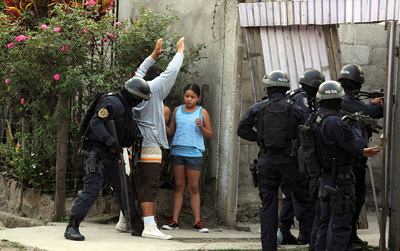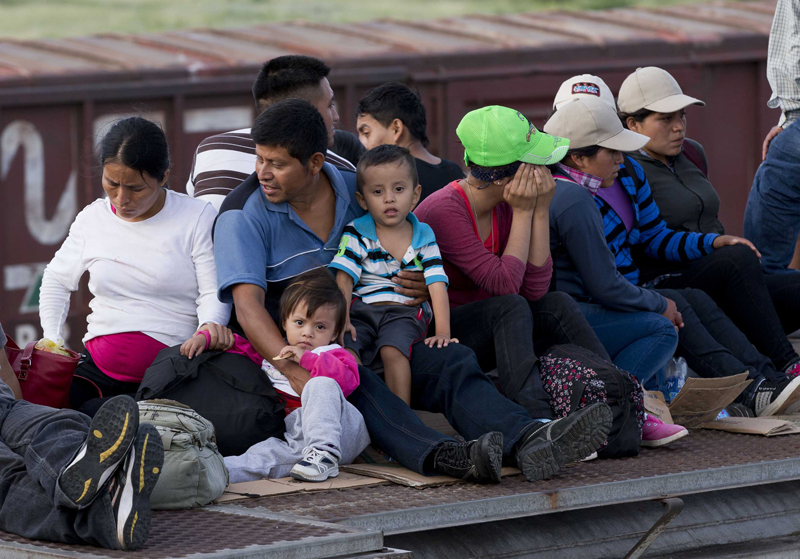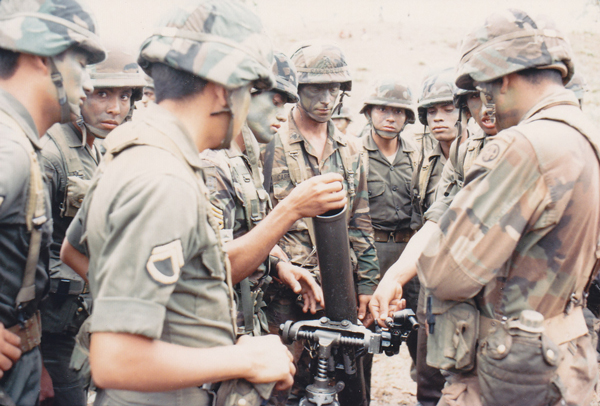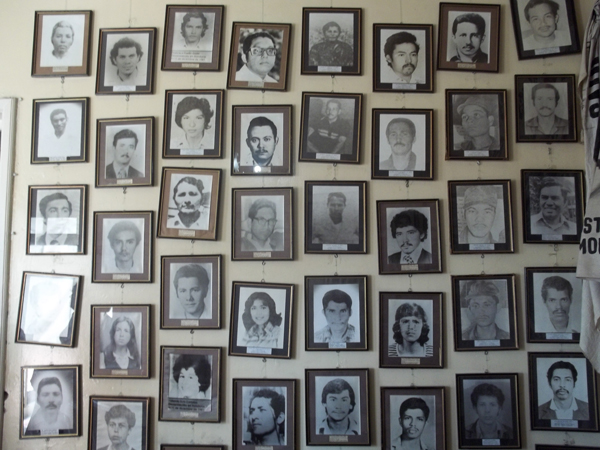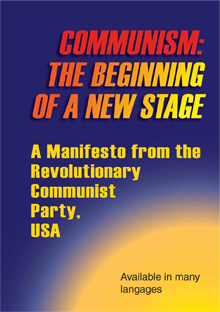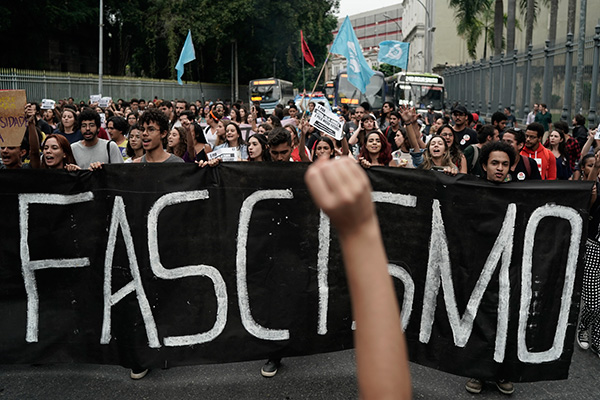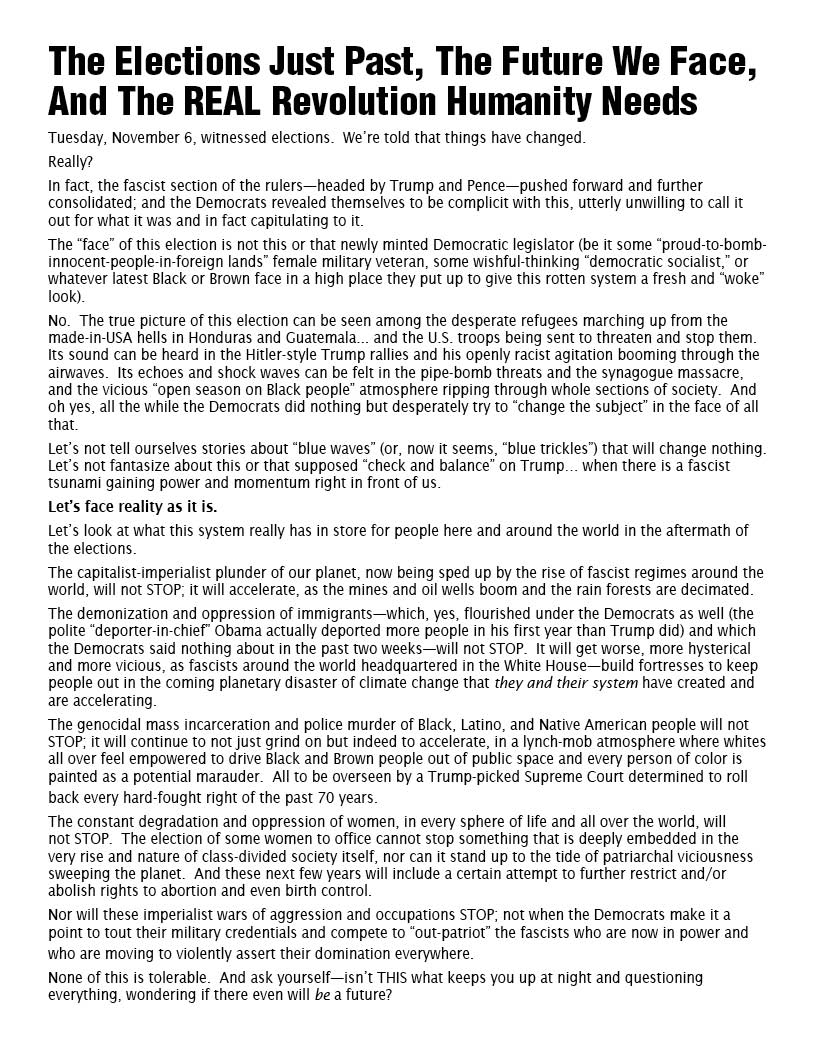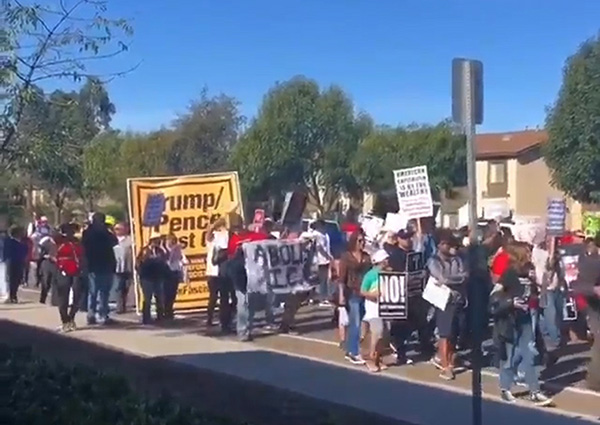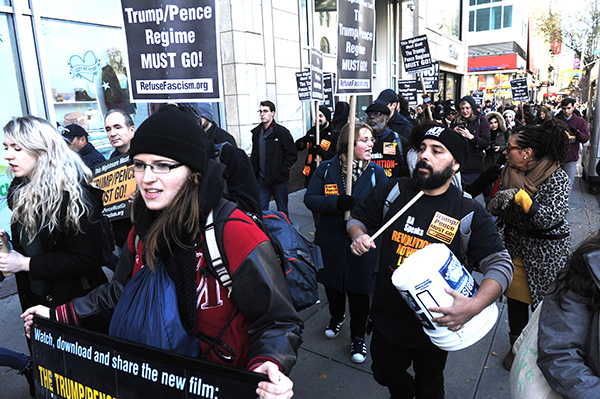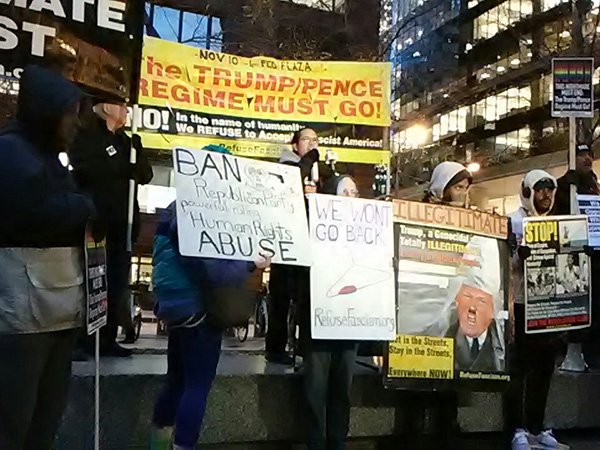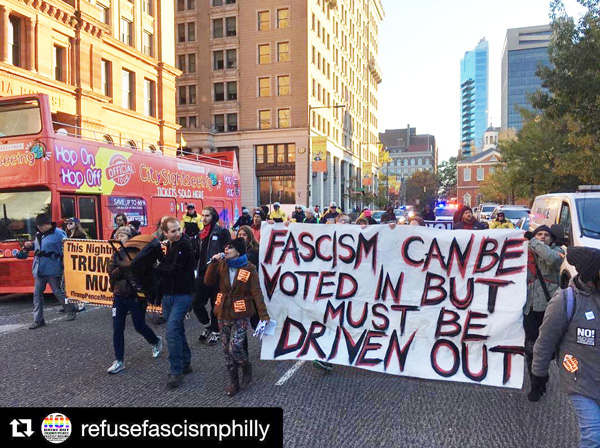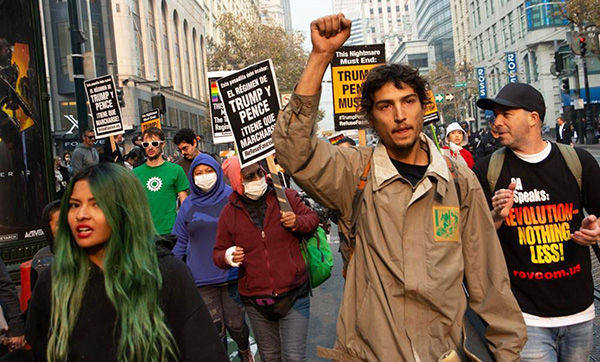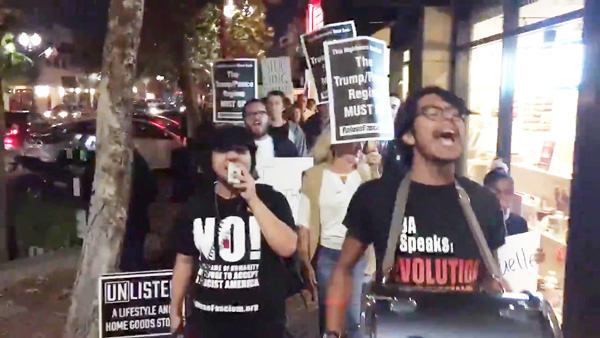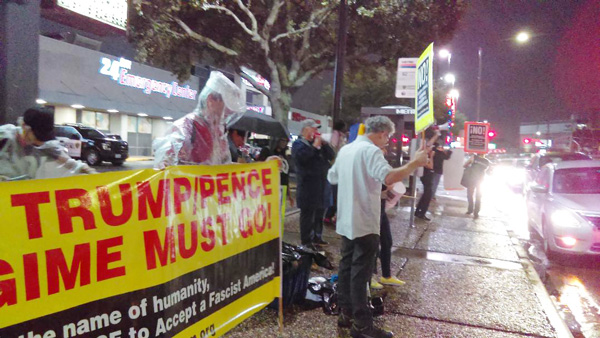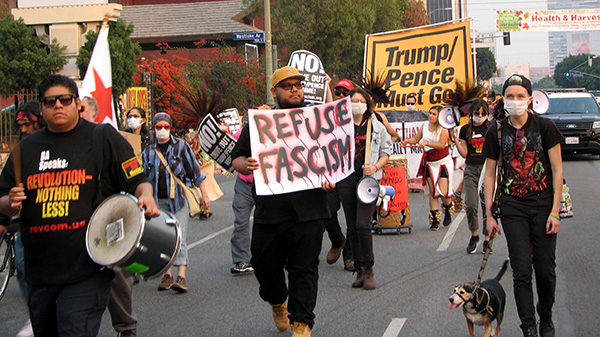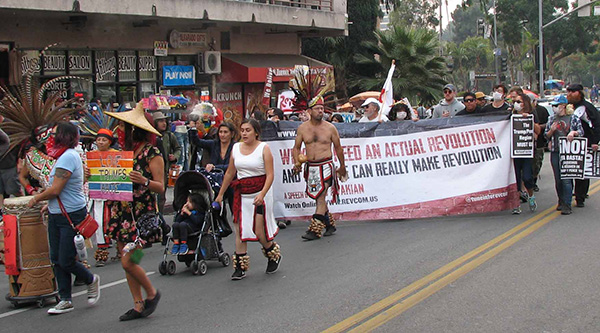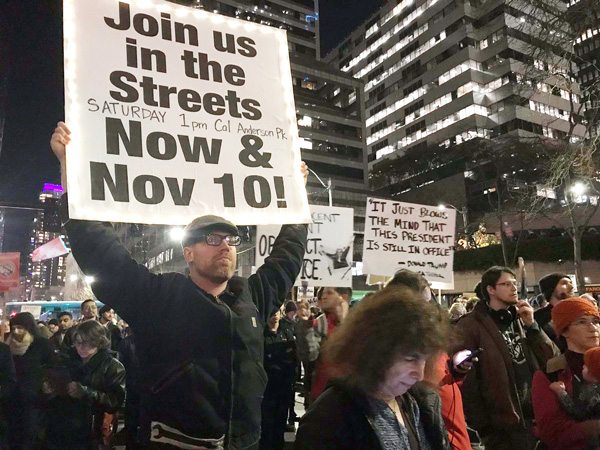Permalink: https://revcom.us/avakian/anotherway/index.htm
Revolution #568 November 5, 2018
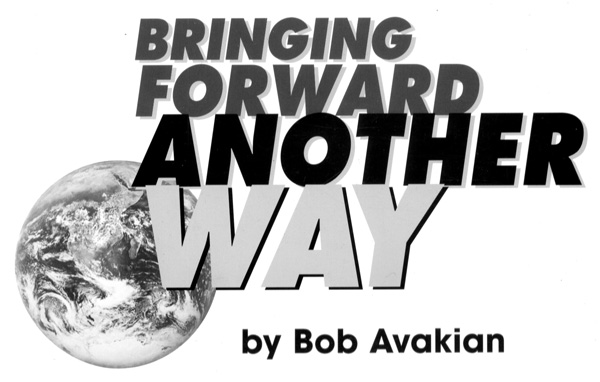
Bringing Forward Another Way is a talk given by Bob Avakian, Chairman of the Revolutionary Communist Party, USA, to a group of Party supporters in 2006 and published in early 2007. This groundbreaking analysis, made during the George W. Bush years, continues to be very relevant, especially in the context of sharpening contradictions centered in the Middle East and aggressive U.S.-led moves against Iran. This work is an illustration of applying the scientific method to approaching international conflicts and understanding social and political contradictions—and identifying where the fundamental interests of humanity lie, providing concrete leadership and guidance for the strategic repolarization for revolution and a thoroughly internationalist orientation. Given the current situation in the world, we urge our readers to restudy this important work or to get into it for the first time.
Editors' Note: The following is an edited version
of a talk by Bob Avakian, Chairman of the Revolutionary Communist Party,
USA, to a group of Party supporters, in the fall of last year (2006).
By Way of Introduction
In relation to what I am going to get into here,
the 7 Talks I gave recently (plus the Q&A and the Concluding Remarks
accompanying those Talks),1
in addition to Views On and Basis, Goals and Methods,2 serve as background. Obviously,
I'm not going to try to repeat much that was said in those talks, but
they should remain a point of reference for much of what I am going to
say here and provide a foundation for it.
What Is Driving the Wars Being Waged, and Wars Being Threatened,
by "Our Government"?
I want to begin by looking at not just the freedom and the ambitions
of the imperial rulers of the U.S., and in particular the core of that
ruling class now, grouped in and around the Bush regime, but also their
necessity and how they perceive that necessity. We have talked a lot about
the ways in which they have seized on a certain freedom, for them, as
a result of the demise of the Soviet Union in particular, and their ambitions
of making U.S. imperialism an unchallenged and unchallengeable power in
the world. But it's also important for us to understand, and to enable
others to understand, how they are seeing their necessity—particularly
how this is seen by that core of the ruling class which has been driving
things for the last number of years. Our responsibility lies in, first
of all ourselves understanding, but second of all giving people as broadly
as possible, at any given time, a full, scientifically based picture of
what is going on in the world, where the dynamics are driving things—and
why—and what are the means for acting to radically transform all
this, with the objective of getting rid of all these horrors and bringing
a new world into being—a transformation, in other words, that would
be in the interests of the great majority of oppressed people, indeed
the great majority of people throughout the world and ultimately humanity
as a whole.
At any given time, many people will be out moving in relation to, and
in opposition to, the crimes of this system—and we obviously need
a lot more of that. Those who are part of this broad movement will have
various levels of understanding and different views about what this is
all part of, what it stems from, what to do about it, and so on. It is
our responsibility at any given time not just to unite with whatever motion
there is and to work to develop this into a much broader and more powerful
political resistance, but also to be continually digging down more deeply,
to understand more fully what's driving things and therefore how to move
in relation to it, and through uniting and struggling with a broad diversity
of people and forces, to enable people to move in greater numbers, and
to greater effect, in the direction in which things need to go in order
to actually deal with the root cause of all this.
Recently I read the book Fiasco: The American Military Adventure
in Iraq, by Thomas Ricks, who is a military correspondent for the
mainstream, bourgeois media, the Washington Post in particular.
This is very interesting—this is not simply Thomas Ricks, the military
observer, writing—this book represents and incorporates a section
of the U.S. military opening up its deep concern, anger, and, in a sense,
protest about how the Bush regime has conducted the war in Iraq, with
many of them coming to the conclusion that it should never have been launched
in the first place—or, if it were going to be launched, then there
needed to be a whole plan for what they were going to do after they toppled
the Hussein regime, a plan which, in any real sense, they did not have.
There is a lot of speaking bitterness from these military people that
comes out in this book. In a real sense, besides Ricks' own analysis,
this book acts as a conduit and a vehicle for what a lot of these military
officials are saying, on the level of colonels and even up to generals,
some still active-duty, some of them retired.
At the beginning of the book one of the things Ricks does, which is
important, is that he discusses the role and motivations of people like
Paul Wolfowitz (former assistant secretary of defense, and now head of
the World Bank) and others of these "neo-cons" who were driving
forces in insisting on overthrowing the Hussein regime—they were
insisting on this even before Bush came into office. Ricks discusses how
Wolfowitz and the neo-cons generally were viewing the situation, not only
in Iraq but in the Middle East overall, and why they were so determined
to invade Iraq and overthrow Hussein. As I was reading this, I thought
of a metaphor which then later was explicitly used by Ricks: Among other
things, these neo-cons in particular saw the Middle East as a swamp breeding
all kinds of terrorist mosquitoes; and their calculation was that, even
though Saddam Hussein as such was no threat to the U.S. (or even to his
"neighbors" in the region), still if they left the Middle East
the way it was, it would just keep on generating these poisonous creatures
and this would get in the way of all their fundamental objectives in terms
of U.S. imperial domination in that region, and in the world as a whole—objectives
which are not those of the neo-cons alone but were, and are, shared by
the ruling class as a whole, even with some significant differences among
them over how to go about achieving those objectives. So this metaphor
of drying up the swamp, which was explicitly invoked by Ricks in this
book (Fiasco) clearly does capture the thinking, or an important
part of the thinking, of people like Wolfowitz and these other neo-cons,
who have been very influential in the Bush regime.
Another way to say this is that Iraq was not just seen as a "target
of opportunity," to use their terminology, but invading Iraq was
something they needed to do in order to begin installing in that part
of the world regimes that would actually more fully serve U.S. imperial
interests and would be "enablers" of their agenda in that part
of the world (and their agenda overall). And if they didn't do this, if
they left Iraq as it was under Hussein, then the whole "mix"
in the Middle East—with Iran, on the one hand, and Saddam Hussein
on the other, and Saudi Arabia and all the rest in the region—would
just keep producing these intolerable conditions from their point of view.
So they were looking at this in this way: If we don't get to this and
do this pretty soon, this is going to be all out of control.
Yes, they saw real opportunity and some freedom they could seize on,
in moving against Saddam Hussein, and this was part of their wild ambitions
for further remaking the world under even more firm U.S. imperial domination;
but they also were acting out of a sense of real necessity—perhaps
more so than I, at least, had recognized previously. As they see things,
a policy of maintaining the (relative) stability in the Middle East, as
that has existed, has led to a very bad situation, breeding terrorism
and getting in the way of everything they need to do, and reacting back
against it. This not only comes through in how Ricks speaks to things
in the book Fiasco, it was also explicitly stated by Bush
in a recent speech, or in a series of recent speeches by Bush and others
in the Bush regime.
How the Bush Regime Views "Stability" and "Peace"
in the Middle East
For example, in September (2006) Bush and Rumsfeld gave extremely important
speeches where they were talking somewhat honestly from their own point
of view. [laughs] Now, it is important to recognize and keep in
mind that their point of view doesn't accurately reflect reality, and
it involves a distorted understanding, even on their own part, of what
they themselves are doing—of what their objectives really are, as
well as what their actions in pursuit of their objectives will actually
lead to "in the real world," as the saying goes. But, nonetheless,
these speeches by Bush and Rumsfeld were not simply deliberate distortions
and demagoguery—they were a combination of demagoguery and actual
articulation, by Bush and Rumsfeld, of their views and objectives. So
for example, in a speech in Washington D.C., September 5 of this year
(2006), on the "global war on terror," Bush said:
"The only way to secure our nation is to change the course of
the Middle East."
And then again on September 11 (2006), speaking about the Middle East,
Bush said explicitly:
"Years of pursuing stability to promote peace had left us with
neither."
The "War on Terror": What Is Really Going On—and
Why
By taking these comments by Bush—and subjecting them to critical
and scientific analysis, to get to the essence of what these comments
are actually speaking to—we can begin to see more fully the real
motives and motive forces involved in the Bush regime's approach to not
only Iraq but to the Middle East as a whole, as a region of great strategic
importance. We can see even more clearly how the Iraq war is not a "distraction"
or a "diversion" from "the war on terror" but is,
in fact, a central part of what this "war on terror" (or, as
we have also identified it, the "juggernaut" of the Bush regime)
really is all about. In its essence, this is a war for empire.
As our Party pointed out from the beginning of the juggernaut by the
Bush regime—in other words, from shortly after September 11, 2001
and with the U.S. war against Afghanistan following shortly after that—oil,
in the more limited sense, has never been the essence
of what this juggernaut has been all about.3 Yes, for the U.S.
imperialists as a whole (and not just the Bush regime) controlling the
oil, in the Middle East in particular, has been very important in terms
of a whole ensemble of strategic relations in the world, including with
regard to maintaining a superior position vis-à-vis other imperialists
(in Europe, Japan, etc.); but all this has never been just about grabbing
Iraq's oil, for example. That is involved, but what is more fundamental
and essential are strategic calculations—the perceived freedom and
perceived necessity on the part of this core of the ruling class, grouped
in and around the Bush regime, now, and the ways in which this relates
to the strategic interests of the U.S. empire and its ruling class as
a whole.
As I'll talk about further as we go along, this relates to the fact
that the "war on terror" is, on the one hand, a misnomer—it
is not an accurate characterization of what is really going on, in fundamental
terms, and this catchphrase "war on terror" involves a whole
bunch of demagoguery, and a whole lot of deliberate deception—but
at the same time there is also some truth to what's being described with
the term "war on terror." Once again, this is the complexity
of the reality that we have to understand, more and more deeply, in order
to act to change it in accordance with the fundamental interests of the
great majority of people, not just in the U.S. but throughout the world.
There is both demagoguery and instrumentalism on the part of Bush &
Co. (by "instrumentalism" here I mean torturing reality in the
attempt to make a distorted version of reality an instrument of certain
aims), but there is also some truth with regard to the so-called "war
on terror." That is, from the point of view of these imperialists,
looking at a whole strategic arc from Iraq, Iran, and Afghanistan all
the way over to places like Indonesia (a country with a large population
where Islam is the dominant religion and Islamic fundamentalism is also
on the rise), if things were allowed to continue as they have been for
a number of years, this would rebound against the interests of U.S. imperialism
in very serious ways. Forces of militant, even fanatical, Islamic fundamentalism
do not pose a positive alternative for the masses of people—including
those currently drawn to or swept up in this fundamentalism—but
to a significant degree and in significant ways they do pose a real obstacle
to the aims and designs of the U.S. imperialists in particular at this
point. These Islamic fundamentalist forces are what the Bush regime (and
the U.S. ruling class as a whole) are largely referring to, at this point
at least, when they talk about "terrorism"; and these Islamic
fundamentalist forces do use methods and tactics that to a large degree
can legitimately be described as "terrorism," including deliberate
attacks on civilians.
At the same time, it is very important to keep in mind two things in
this regard: First, it is the imperialists, and the U.S. above all, who,
going back over many generations, have, by far, directly carried out (or
in some instances have backed and been ultimately responsible for) the
most monstrous acts of death and destruction, including the slaughter
of millions and millions of civilians, in all parts of the globe, from
the Philippines to Vietnam to Chile, the Congo, Iran, Indonesia, Iraq,
and Afghanistan… and on and on… not to mention the actual use of nuclear
weapons by the U.S.—the dropping of two atomic bombs on Japanese
cities at the end of World War 2, with all the horrors that involved.
And, second, the way in which these imperialists use the term "terrorism"
is deliberately calculated to be so broad and vague that it can be turned
against any force, of whatever kind, that poses an obstacle to these imperialists—including
revolutionary movements and revolutionary wars which do not involve, on
the part of the revolutionary forces, deliberate attacks on civilians
or the destruction of civilian infrastructure and which have the participation
and support of masses of people. Even where all that is true, the U.S.
imperialists will not hesitate to label these revolutionary forces "terrorists"
if what they are doing runs counter to the interests of U.S. imperialism.
So, once again, there is a great deal of hypocrisy and deception in
the use of this term "war on terror"; and at the same time it
is also the case that this refers to a war that the Bush regime—and,
in fundamental terms, the imperialist ruling class as a whole—feels
compelled to wage in order to deal with obstacles to its interests, objectives,
and grand designs of unchallenged world domination.
This Is Not Our War—and This Is Not Our "Quagmire"
The interests, objectives, and grand designs of the imperialists are
not our interests—they are not the interests of the great
majority of people in the U.S. nor of the overwhelming majority of people
in the world as a whole. And the difficulties the imperialists have gotten
themselves into in pursuit of these interests must be seen, and responded
to, not from the point of view of the imperialists and their interests,
but from the point of view of the great majority of humanity and the basic
and urgent need of humanity for a different and better world, for another
way.
It is very interesting to read some of these imperialist analysts. For
example, Michael Scheuer (a long-time CIA operative), who was the actual
author of the book Imperial Hubris (although he wrote it under
the name "Anonymous"), made some observations a couple of years
ago that were pretty prescient. And you have to give people credit when
they have real insight and foresight. [laughs] In that book, he
said two things (or two things I want to focus on here). One, he said
the Iraq War is for Osama bin Laden the Christmas present he never thought
he'd get. (Of course, that statement is somewhat ironic, since bin Laden
is obviously a Muslim and not a Christian, but still the basic point is
valid and important.) And two, Scheuer said: you watch and see, things
in Afghanistan are gonna start going very badly for the U.S. pretty soon—that
initial victory there is not going to look so good in a couple of years
either. Well, he's been proven right on both counts, you have to say.
I mean, he's not the only one who saw that, but if you read that book
he made these statements rather emphatically and without qualification,
and they're proving to be true.
This ties up with the bind these imperialists are in: In a very real
sense, there was an accurate perception on the part of the neo-cons and
the Bush regime that, from the point of view of the interests they represent,
they did have to do something to change the equation in that whole part
of the world ("to change the course of the Middle East," to
invoke once again Bush's phrase); and, on the other hand, look at the
difficulties they've gotten themselves into as a result of their invasion
and occupation of Iraq in particular.
Whenever I get a chance I like to check out what these right-wing demagogues
are saying—the way in which they are (to use that phrase) "spinning"
the propaganda of the Bush regime and its program. These days many of
them are putting out a very different line than the one they used to justify
and drum up support for the invasion of Iraq in 2003—all the talk
about "Weapons of Mass Destruction" and ties between Saddam
Hussein and Al Qaeda, and so on. At the start, they had one set of rationalizations
for the Iraq war, but now they've got another set of rationalizations,
which more correspond to the situation they face now and how they are
seeking to deal with that. Now you hear these people—these apologists
for the Bush regime—saying that the Iraq War was really about… Iran!
Why? Well, to paraphrase the propaganda:
"Look what's happening now in Iraq. Look at all the gains that
Iran is making in Iraq. They've got all these Shias and Shia militias,
all these forces there, that the Iranians are basically controlling. So
now we gotta take it to Iran."
Of course, these difficulties the U.S. has encountered in Iraq are not
the real—or not the most fundamental—reason that they are
setting their sights on Iran. I will get into this further a little later
in this talk, but the fact is that Bush & Co. had identified the regime
in Iran as one it wanted to go after even before they invaded Iraq (remember
how, early on after September 11th, they included Iran in the "axis
of evil"?). But the fact is that, if they hadn't invaded Iraq and
overthrown Saddam Hussein, they wouldn't be having the trouble they are
having with these Shia forces in Iraq, and they wouldn't have this whole
mess. So Bush and the U.S. ruling class certainly don't have "all
freedom" in this situation, and they didn't have "all freedom"
all along.
If they had let things go along the way they were, in the Middle East
in particular, this would have meant perpetuating conditions that do give
impetus to Islamic fundamentalism of the kind that causes real trouble
for the U.S. empire. There is, as you know, tremendous suffering on the
part of the masses of people throughout that region. There is the corruption
of the regimes there, and the repressive nature of those regimes. There
is the worsening of the material conditions of the masses of people and,
along with that, the tremendous upheaval and dislocation of millions and
millions of people in those societies, with the "traditional way
of life" significantly uprooted but with no real positive radical
alternative possible within the dominant social and international relations—none
that would really meet the needs and serve the interests of the masses
of people. Is it really surprising that this situation and its driving
dynamics would lead people to gravitate to extremes? And there is a force
of "Islamic extremism" which has been and is moving to organize
people in relation to this—organize them around precisely an extreme
version of traditional relations and traditional values and culture, which
seem to be, and in a real sense are, under attack from many sides, especially
as the effects of globalization, and the imperialist system as a whole,
increasingly penetrate into and make themselves felt within these societies.
So, it was the reckoning of those in and around the Bush regime—and,
from the standpoint of their system and its interests, there was a logic
to this—that they couldn't just leave things to develop as they
were—they had to make some dramatic moves to "change the course
of the Middle East."
Invasions… and Occupations… Upheaval and Chaos
But their problem is, as we are seeing, that whether it's Afghanistan
or Iraq, these imperialists are good at invading countries and knocking
over regimes, but then when they find themselves in the position of occupying
the country and they have a population that gets aroused against them,
it becomes a different dynamic, and it is not so easy for them. It is
not so easy for them to maintain "order" and to impose the changes
they want to impose in accordance with their interests. It is not so easy
to impose this "from the top down"—which is the only way
imperialist occupiers can impose changes.
In this connection—and referring back to the observations and
predictions by Michael Scheuer about the difficulties the U.S. would have
in occupying Afghanistan—I have to say that I cannot help noticing
the great irony when I hear about these bourgeois feminists and others
who got sucked into supporting the war in Afghanistan (or who rationalized
their support for this war) on the basis that the U.S. invasion and occupation
was supposedly going to bring reforms beneficial to women. Well, if you
look at the situation now, the U.S. doesn't control much more in Afghanistan
(if any more) than the Soviets did when they were occupying that country
in the 1980s. And, if you are going to be honest and scientific, you have
to recognize that the reforms that the Soviets brought in, during their
occupation of Afghanistan, were a lot more thorough, particularly with
regard to women. That's one of the things that provoked the ire of a lot
of the Islamic fundamentalists.
Now, the Soviets did this from the top down; they imposed it by invasion
and occupation and coups, and so on. Then, when they couldn't get very
far with these reforms in this way, and they had trouble achieving a stabilized
rule and order under their occupation, they backed off and conciliated
with the forces of Islamic fundamentalism. After all, the Soviet occupation
of Afghanistan wasn't like the revolution in China, which came "from
the bottom"—and which won the masses politically and mobilized
and relied on them to carry out radical changes, not only in economic
relations but also in the social relations and the customs and culture,
and so on.
In contrast to this, the U.S. occupation of Afghanistan, as well as
the Soviet occupation before it, has represented and embodied an attempt
to impose some changes from the top; but if you're going to talk about
what was actually done, the Soviet reforms went further, particularly
with regard to the status of women. Yet, in the end, the Soviet occupation
could not succeed either.
And to get back to the main point here, the same thing has been shown
in Iraq: It's one thing to go in and knock over a regime, especially one
you've weakened by a previous war and ten years of sanctions, and so on;
but it's another thing to maintain an occupation and to force things on
the population you are now directly ruling over. At this point, many political
strategists of the U.S. empire, and even many in their military leadership,
are admitting this—many of the military people that are quoted in
this Ricks book (Fiasco) are acknowledging, in effect: "Iraq
was a pushover, their army was chump change, anybody with a formidable
army could have gone in and knocked them over." Of course, they don't
quite say that, because they want to talk about how great they
are, what a great military power they are, but nonetheless they're pretty
much acknowledging that, by the time of the 2003 invasion, the Iraqi military
was a very weakened force, even compared to the first Gulf War in the
early 1990s. Of course, if you go back and look at what many, if not most,
of these "experts" were saying—and if you look at the
propaganda of the Bush regime in particular—at the start of the
present war, and in the lead-up to this war, there was an incessant chorus
issuing dire warnings about how dangerous Saddam Hussein and his regime
was: It was portrayed as one of the most dangerous and powerful enemies
the U.S. faced in the world; it was ready to unleash a mushroom cloud
over the U.S. itself as well as constituting a great danger to all of
its neighbors.
Then they invade—and it doesn't go so well after Bush declares
"Mission Accomplished" in 2003. And it's kept getting worse
for them—and now they're really stuck. From the point of view of
the imperialists—but we should also understand that this does involve
fundamental questions that affect broad sections of the people in society,
including many people with progressive sentiments and views in general—there
is no easy way to deal with this. There's no easy way out for the U.S.
imperialists—and admitting defeat is not an option they want to
consider. As I emphasized at the beginning, our responsibility is to be
thoroughly scientific. Our responsibility is not to just automatically
dismiss whatever the imperialists say—"That's just a bunch
of imperialist propaganda—next point, move on." While firmly
maintaining our basic stand, in accordance with the fundamental interests
of the masses of people, throughout the world, in opposition to the imperialists
and their system of exploitation, domination, and oppression, we cannot
be simple-minded. We have to be scientific and analyze reality in all
its complexity.
It is a fact that it would cause a lot of upheaval and chaos in the
Middle East if they just were to pull out of Iraq. It would encourage
Islamic fundamentalists to step up their attacks against U.S. forces elsewhere;
and given the worldview and the whole approach of those fundamentalists—which,
as you know, is fundamentally different from ours and is not good—they
would quite likely carry out further attacks against American civilians,
to the degree they were able to do so. But it is also very important
to keep in mind that in the world today—and in the situation and
lives of the majority of people throughout the world—there is already
a great deal of upheaval and chaos. And the dynamics that are now,
to a large degree, driving things—the dynamics that have led to
the current situation in Iraq and more generally in the Middle East, with
ramifications and implications in every part of the world—this will,
in any case bring a great deal more upheaval and chaos, affecting people
everywhere, until there is a resolution of this of one kind or another.
Besides the moral bankruptcy of seeking to avoid chaos for yourself
and the things that more immediately affect you, while many, many others
are caught up in this and are suffering horribly—besides that whole
moral dimension, which I will return to later, because it is in fact something
that needs to be emphasized and joined with people—there is the
reality that, even those now occupying more privileged enclaves in the
imperialist countries and in other parts of the world will not be able
to avoid being affected by great upheaval and chaos in the period ahead.
The essential question is not whether there will be chaos or no chaos,
or whether it will end up affecting people everywhere, in one way or another.
The question is: What will this all lead to, what will come out of it,
what kind of world will emerge out of all this?
Osama bin Laden and others like him are reactionary but they're not
fools. Their program and the tactics which flow from that program—and
from their basic worldview and values—are extremely reactionary
and harmful to masses of people, even those they mobilize. But they are
not without a sense of tactics, and even of nuance. Look at what bin Laden
said in the context of the 2004 election in the U.S. In effect, he took
the bourgeois democratic views and illusions that so many people in this
society, including many progressive people, are mesmerized by and caught
up in, and he threw it back in their faces. He said: "You have the
right to vote your government in or out. You have the right to change
the policies of your government through voting, so if these policies continue
you are at fault." And more recently on CNN, I heard some
Islamic fundamentalists in Britain saying the same thing about the British
government and the British people.
If you think about it, this involves a kind of profound irony: people
like bin Laden are taking these bourgeois democratic prejudices and illusions
and using them for their own ends. Primarily, of course, statements like
this from bin Laden and similar types are, from their point of view, aimed
at justifying to their social base what they are doing—that
it's justified to attack the civilians of countries like the U.S. and
Britain. And there are a lot of people "in the Islamic world,"
including people drawn to the Islamic fundamentalist banner, who are very
uncomfortable about these attacks on civilians. So statements like bin
Laden's—about the right to vote out the government in the U.S. or
Britain—are not primarily aimed at the people in those countries,
but are aimed at the social base of the Islamic fundamentalists themselves.
Now, from our radically different perspective and with our radically different
objectives, we of course understand that such attacks on civilians are
completely unjustified. But, at the same time, we must never lose sight
of—nor fail to vigorously bring to light—that what has been
done by the bin Ladens of the world pales in comparison to the truly monstrous
and massive crimes that have been, and every day are being, carried out
by imperialism, and in particular U.S. imperialism.
But the essential point I want to emphasize here is that, in a real
sense, the situation that has been created through the U.S. "war
on terror" so far, with its invasions of Afghanistan and Iraq (as
well as its military actions in other parts of the world) is indeed a
mess, and we shouldn't have any simplistic notions of what's involved
in all this and what's going to come out of it. There is not going to
be any kind of smooth way out of this. And, I'm sorry, as much as I respect
John Lennon, "just give peace a chance" is not going to deal
with the heightening complexity, and intensity, of the situation. Now
let me emphasize here again that we can, and must, unite with lots of
people for whom sentiments like that—the desire for peace and the
belief that peace can prevail if in fact it is just "given a chance"—are
their defining and driving sentiments, but we also have to be struggling
with people about what's really going on here—what is the root cause,
what are the actual dynamics, and what is the real and fundamental solution.
There is not an easy way out. And many people sense this. I have heard
and read about discussions with progressive people who say things like:
"Well, it was terrible that the U.S. went into Iraq, but we can't
just precipitously pull out now." Again, I am not talking about reactionaries
here. People can sense that one result from a U.S. pull-out from Iraq
could be the strengthening of Islamic fundamentalist forces, and that
these forces do not actually draw any distinction between the U.S. government
and the people of the country. Now, let me be very clear once again: What
I am saying here should in no way be understood to deny, or to lessen
the importance of, the point that I have repeatedly stressed—that
the interests of the masses of people in the U.S., as well as those of
the great majority of humanity, are fundamentally different from, and
opposed to, those of the imperialists; and the difficulties in which the
imperialists find themselves as a result of their invasions and occupations
must be seen, and responded to, from the point of view not of the imperialists
and their interests but in accordance with the interests of the great
majority of humanity, and ultimately humanity as a whole. My point here
is that the situation is very complex and that bringing forward and rallying
people to their own fundamental interests, on the massive scale that is
required, cannot and will not be done with any naive and simplistic approach
but only by coming to terms with what is really going on in the world,
in all its complexity, and the challenges this poses—and struggling
to win people to the correct understanding of this, and to acting on that
understanding, in the context of and on the basis of grasping the actual
situation and its dynamics.
Those who have been around since the 1960s will remember this, and those
who weren't around then might find it interesting, and perhaps amusing:
During the time of the Vietnam War, one of the justifications for the
U.S. aggression against Vietnam was what was called "the domino theory"—if
Vietnam falls, then that will set off a chain of falling dominos, not
only in parts of Asia but with implications for the world as a whole.
This was often expressed in terms such as: "If we don't stop them
in Vietnam, pretty soon they'll be at our doorstep." Of course, underlying
this was not only crude anti-communism (crude distortions of what communism
is and what communists stand for and fight for) but, along with that,
the basic assumption that people and countries all over the world constitute
essentially nothing more than objects to be controlled, and exploited,
by American (imperialist) interests and that it must not be tolerated
for the U.S. to "lose" these countries to their own people.
This came to be widely rejected, especially by the late 1960s, and one
of the ways the "domino theory" in particular was ridiculed
was by saying: "What are the Vietnamese going to do—take their
boats (sampans, they were called) and sail over to California and attack
us?"
Well, that kind of joke doesn't really go right now. Today, these Islamic
fundamentalists are, first of all, coming from a whole different place
than the Vietnamese liberation forces, which were genuinely revolutionary
(even if their leadership was never thoroughly communist). Despite their
shortcomings, the Vietnamese revolutionaries had a theory and strategy
of people's war which was aimed against the imperialists and their armed
forces but was not aimed against the people of the U.S. In fact, the Vietnamese
put a lot of emphasis on drawing the distinction between the government
and the people of the U.S., and on winning political support among the
people in the U.S.—they did a lot of work which was aimed at gaining
that support, or at least developing opposition to the war among broad
sections of U.S. society. But things are different now, in some significant
ways. It is definitely true that the Bush regime in particular seeks to
manipulate things so as to continually manufacture fear among the people
in the U.S. and the sense that they are constantly in need of repressive
government actions "to prevent further terrorist attacks on America
and the American people." But that is only one aspect of things.
It is a definite orientation and aim, among at least some of the Islamic
fundamentalist forces, to strike not just at the U.S. armed forces but
also the people in the U.S. This is a very different situation than what
obtained during the period of the Vietnam war, and if we are going to
really move people in the way that people need to be moved, in order to
really act in their own interests in fundamental terms, we're going to
have to take account of all this—of the situation in all its complexity.
While many others may provide valuable insights into all this, and while
it is definitely necessary and vitally important to unite as broadly as
possible with others in opposing what the Bush regime (and the imperialist
ruling class as a whole) is doing in the world, there is no substitute
for our Party speaking to all this in a thoroughly scientific way, with
our communist outlook and methodology.
More on the Aims of the Bush Regime—and on the Consequences
Returning to the objectives of the Bush regime, and to the actions they
have undertaken in pursuit of those objectives (objectives which, once
again, are shared by the ruling class as a whole, in fundamental terms),
the fact is that, through their invasions of first Afghanistan and then
Iraq, they have heightened the mess that they perceived in the first place.
As they saw it, they were going to go in with military force, they were
going to set up a regime on the basis of their military victory, and they
were going to call it democracy—and their plans and objectives did
envision combining certain outward forms of bourgeois democracy with a
"free market economy." And then they were going to basically
"run the table" with that—move on from Iraq to other parts
of the Middle East, to impose the same "model" of society. Well,
it hasn't turned out that way, and now they are confronting the ramifications
and implications of that reality.
During the course of the Iraq war, and increasingly as the U.S. has
run into trouble and become "stuck" there, the example, or analogy, of
Vietnam has been invoked. So let's look at a crucial aspect of how the
U.S. eventually got out of Vietnam. To be honest and blunt, they got
out of it partly by arrangements they made with China, after Nixon
began moving to "normalize relations" with China. And Nixon
got some heat for that, too, within U.S. ruling class circles,
because a lot of them didn't understand what he was doing. But what
Nixon did was basically to enter into a different set of relationships
with China than what had existed previously. Not different in the most
fundamental sense, because China and the U.S. at that time still
represented two fundamentally different and ultimately antagonistic
social systems, one socialist and one imperialist; but each government,
proceeding from its sense of how to further the interests it
represented, moved to conclude certain agreements involving areas of
mutual interest, particularly with regard to the Soviet Union, which
had itself become capitalist-imperialist (although then in a
state-capitalist form and with the continuing camouflage of
"socialism") and was, at one and the same time, the most militarily
powerful imperialist rival to the U.S. and the main danger to China,
threatening it with military attack, possibly even with nuclear
weapons.
As part of this agreement with China, Nixon was able to, metaphorically
speaking, "stanch some of the geostrategic bleeding" that U.S.
imperialism suffered as a result of having to admit defeat and pull out
of Vietnam. And, as I have referred to, the Chinese had their own objectives,
which had to do especially with working to stave off an attack by the
Soviet Union. Again, the threat of such an attack was a very real thing.
The Soviet Union, a nuclear superpower, had troops massed on the Chinese
border and, it seems, was seriously considering an attack on China, including
possibly with nuclear weapons. Now, from the standpoint of our Party,
and our communist outlook and objectives, even understanding the very
great necessity, the very real threat, the Chinese faced, we can still
criticize and must criticize how they dealt with all that, in particular
the way in which they allied with and covered up the reactionary and bloodthirsty
nature of a number of regimes that were installed and/or kept in power
by the U.S., and were key cogs in the imperialist alliance headed by the
U.S.—regimes headed by such brutal tyrants as the Shah of Iran and
Marcos in the Philippines.
But, once more, in scientifically analyzing, and yes criticizing, these
moves by the Chinese government at that time, we cannot do what so many
are inclined to do so frequently—to ignore the necessity that different
forces have and act like they can do whatever they want. We can't do that.
And we should struggle with everybody else that they shouldn't approach
things that way either. We should struggle with other people about how
to understand the world, but first of all we have to understand it correctly
ourselves.
Israel and Its "Special Role" in Relation to U.S. Imperialism
I have heard that some people don't like my statement: "After the
Holocaust, the worst thing that has happened to Jewish people is the state
of Israel." But this does capture something very important, and there
is something very important to understand about the "special role"
of Israel—not only in relation to U.S. imperialism in general, but
also particularly in relation to the neo-con/Bush regime strategy.
Why is this Bush regime the most unrelenting and unqualified in its
backing of Israel? Now, a lot of people—even some well-intentioned
but confused people, as well as some people whose intentions and objectives
are not good—argue that the reason the U.S. government is generally
so one-sided, and the Bush regime in particular is so absolutist, in its
support of Israel, is because of the Israeli lobby, or because of Zionist
influence, in the U.S. Now there might, superficially, seem to be some
support for that theory by looking at the neo-cons. It is true that in
a significant sense this is a phenomenon of Jewish intellectuals who were
once sort of Cold War liberals and have become hard-core right-wing ideologues.
That, however, is not the essence of the matter. I do not know
how different individuals among the neo-cons actually view the interests
of Israel vis-à-vis the larger interests of U.S. imperialism. Whatever
the case is with individuals in that regard, the fact is that, as a general
phenomenon, these neo-cons are ardent advocates of both Israel and of
the particular strategy for U.S. imperial domination in the Middle East
(and on a world scale) with which the neo-cons are identified. And more
fundamentally, this position, which the neo-cons urge, of unqualified
hard-core support for Israel fits into and serves the larger imperialist
strategy for the Middle East and ultimately for the world—and that
is why this neo-con position has such influence. If their position did
not serve the larger interests of U.S. imperialism, or if it ran counter
to how those now at the core of the ruling class perceive those interests,
then whatever the motivations and inclinations of particular individual
neo-cons, they wouldn't have the influence they do.
To put it in basic terms, Israel is a colonial-settler state which was
imposed on the region of the Middle East, at the cost of great suffering
for the Palestinian people (and the people of the region more broadly).
Israel could not have come into being without the backing of imperialism,
and it acts not only in its own interests but as an armed garrison and
instrument of enforcement for U.S. imperialism, which supplies the Israeli
state with aid, and in particular military aid, to the tune of billions
of dollars every year. But, along with this general nature and role of
Israel and its relation to U.S. imperialism, if we take into account the
strategic orientation that has guided the Bush regime—based on an
assessment that for U.S. imperialism there is now not only a certain freedom
but very urgent necessity to recast the whole nature of the regimes and
of the societies across a wide arc centered in the Middle East—then
you can see even more clearly how absolute support for Israel is crucial
in all this. There can't be any wavering or even the appearance, or suggestion,
of more "even-handedness" in dealing with Israel, on the one
hand, and the Palestinians (and others in the region) on the other hand.
You have to have your ducks in a row. You have to have your priorities
very clear. You have to have a regime there, at the center of your policy
for that region, which is completely reliable for U.S. imperialism.
If you look at any other regimes in the region, Saudi Arabia and Egypt
are big allies of the U.S. But in Saudi Arabia and in Egypt, the situation
is very unstable and potentially very volatile: there are serious tremors
beneath the throne, so to speak—there is the growing danger of "social
earthquakes" that could threaten to topple, or actually topple, those
regimes. You don't have that in Israel. Hopefully, as things develop overall,
there will not be just a "loyal opposition peace movement" among
Israelis but the development of a much more powerful progressive movement
with a much more radical view in Israel—and this is something that
progressive people in Israel, or with ties to people in Israel, should
work to foster and develop. But right now a positive and truly radical
movement of that kind does not exist in Israel, and the dynamics with
regard to Israel are not now such that the more that the regime in Israel
is hard-core, the more it is going to run into antagonism with the bulk
of its population. In the short term, the dynamic is essentially the opposite,
unfortunately.
You can look at the recent Lebanon war—and in particular the massive
Israeli assault on Lebanon—as an illustration of what the dynamic
actually is now: the more massive and murderous the Israeli attacks were
on Lebanon, the more that the people of Israel, in their great majority,
rallied to the government of Israel. In part this was influenced by the
fact that Hezbollah was launching missile attacks which caused some destruction
and death in parts of Israel; but this was really on a very minor scale
relative to the widespread death and devastation that Israel, with its
arsenal of powerful and precision weapons, very deliberately and as a
matter of policy, brought down on the civilian population of Lebanon,
devastating whole sections of the country, killing many, many times the
number who died in Israel, and forcing huge parts of the Lebanese population
to flee out of the country. Where was any real outpouring of opposition
to this among the Israeli population?
The Danger of War Against Iran
And, on a larger scale, as Seymour Hersh has pointed out, this Israeli
assault on Lebanon was viewed by at least some powerful people in the
core of the U.S. ruling class, including Dick Cheney, as a dress rehearsal
for an attack on Iran. It didn't go as well as they wanted, but that won't
stop them from attacking Iran. They'll just try to sum up the lessons
and—from their murderous point of view—aim to "do better."
Once again, in all this, the regime in power now in the U.S. is acting
not only out of perceived freedom, but also out of real and perceived
necessity. And the more their actions, proceeding on this basis, have
failed to achieve their objectives, the greater the necessity has become—for
themselves as well as for others: different strata and sections of society
all over the world have now had this necessity imposed on them and find
it impinging on them. And where is it all heading?
To return again to the situation in Iraq and the implications of this,
whatever the U.S. does in regard to Iraq—whether, to use that now
diminished phrase, it "stays the course" or tries to find some
way out of the current occupation and tries to pursue its objectives in
somewhat altered form—there is no easy way out of this for them.
All this has already intensified the contradictions in the whole region—intensified
them greatly in the whole region and even beyond that. And this will continue
to be true and to assert itself and to further intensify, even though
it won't necessarily, or likely, be a linear development, increasing in
a straight upward line, but will more likely go through twists and turns
and a kind of wave-like motion (with relative peaks and troughs), even
as it continues to intensify overall.
And what is the response of significant sections of the ruling class,
including some prominent leaders of the Democratic Party as well as a
number of neo-cons, grouped mainly in the Republican Party—what
is their response to this situation, to this mess that's been created
in Iraq for them and for others? Well, as many of them see it, all this
is further evidence of the need not only to persevere in this course but
to spread the whole approach, and to go after Iran in particular. That's
why you see people like this right-wing talk show guy Glenn Beck doing
what he's doing—saying that the whole thing in the Middle East,
including the Iraq War, is really about Iran, that war with Iran
can't and shouldn't be avoided, and on and on. The ground is being prepared
for war with Iran. Public opinion is being created. And so now we have
the reinterpretation of things. Now, the whole problem is Iran.
Now, there is a section of the ruling class saying, no we've got to
negotiate with Iran. They are arguing, in essence, that with regard to
Iraq and the Middle East overall, it is necessary to do with Iran and
Syria and others in that region what Nixon did with China in regard to
Vietnam: find a way out of a war that has become a "quagmire"
by negotiating with other forces in the region to bring about some kind
of settlement that won't be a complete debacle and disaster, from the
point of view of the imperialists. They're not posing it exactly that
way, but that is, in effect, what one section of the ruling class is arguing
for. But that's not going to be very easy to do, because there are a lot
of other "wild cards" in the mix—including that there
are other Islamic fundamentalists, Sunni fundamentalists, and so on, who
are not beholden to Iran by any means and who in fact have acute contradictions
with what's represented by Iran.
At the same time, there's a whole push now, from other sections of the
ruling class, and in particular many of the neo-cons—people like
right-wing commentator and strategist William Kristol—who are basically
calling "W" a wimp. "W" now stands for wimp, because
he hasn't taken things to Iran already—what's he waiting for? And,
along with people like Kristol, there are other neo-cons who have insisted:
"Look, the problem here is that we don't play well on the defense—we're
good at the offense. We can't fight this battle in the Middle East by
keeping it limited to Iraq, because that pushes us on the defense. We
have to go on the offense and take it to Iran and other places."
And then there are Democratic Party politicians, like Barack Obama,
who are joining in the chorus insisting that Iran must not be allowed
to have nuclear weapons and, as bad as war with Iran might be, it would
be worse to let Iran develop nuclear weapons. This, among other
things, is why we have started calling him "Barack Obamination"
or "Barack Go-Bomb-a-Nation." And then there's Hillary Clinton,
who is also insisting that "we cannot allow Iran
to have nuclear weapons." And there was recently a cover story in
the New York Times Sunday Magazine4
which purported to discuss the question of Islamic views on violence but,
after it wound around through all sorts of seeming theoretical expositions
on this question—seeming theological discourse on Islamic views
of justified and unjustified violence—ended by expressing the conclusion
that one could guess was coming all along: "we" cannot allow
Iran to have a nuclear weapon—this must be prevented, whether that
can be done through negotiations or whether it will take war.
Now, this is not to say that war with Iran is, at this point, inevitable.
We should avoid tendencies to be simplistic in our understanding of all
this—we should not repeat the erroneous tendencies that have existed
in the communist movement, including in our Party at times, to fall into
mechanistic and determinist thinking, as if the fact that there are dynamics
and tendencies in a certain direction and toward certain developments
means that those developments are bound to take place.
We have made mistakes of that kind before, and it is very important not
to repeat them.5
There are a lot of contradictions at play, and nothing is set in stone.
But there is a certain logic and a certain driving dynamic that is pushing
things toward this position of spreading the war and going after Iran.
Now, once again we can't be simplistic in our own understanding and
we shouldn't oversimplify things for people. There is a difference between
boiling things down to their essence and oversimplifying them. It would
cause problems for the U.S. imperialists if Iran were to get one or two
nuclear weapons. It would not be the case that Iran would thereby
be able to somehow bomb New York City or Chicago or whatever. But it would
change some of the equation in the Middle East—or it could—in
a way that would work against the interests of U.S. imperialism. As one
key aspect of this, even though Israel itself has hundreds of nuclear
weapons, if Iran produced just a couple of nuclear weapons itself, even
though Iran would still be far from on a par with Israel in this regard,
Iran might then be able to offset some of the ways in which Israel threatens
the other states and peoples in the region, and this itself could mean
a significant change in the "power equation" in the region,
in a way that would be unacceptable not only to Israel but also to the
imperialist power behind Israel, the U.S. Again, it is not that, with
one or a few nuclear weapons, Iran would pose a threat to Israel (or the
U.S.) which the latter could not counter—the balance of power, and
the "balance of annihilation threat," so to speak, would still
be greatly in favor of Israel (and the U.S.)—but this might give
Iran more "leverage" and perhaps enable it to be more of a force
in that crucial region. And that is unacceptable
not only to Israel but, more decisively, to the U.S. imperialist ruling
class as a whole.6
This is another illustration of the reality that, from the point of
view of these imperialists, there is real necessity impinging on them;
and we should not present to people, or think in our own minds, that all
this has some sort of easy resolution. Again, we should learn from our
former methodological errors and not fall into simplistic and linear analyses;
but we can say that all this is not going to get resolved in some kind
of simple and easy way.
More on the "Two Historically Outmodeds"
This leads me to the question of World War 3. A number of pundits and
"analysts"—including once again right-wing squawking heads
like Glenn Beck—have continued to insist: "This is World War
3, we are already in World War 3." This specter of World War 3 involves,
in a real sense, both considerable distortion of reality and actual reality.
And this does get to the "two historically outmodeds" and how
in fact they do reinforce each other even while opposing each other. As
I have formulated this:
"What we see in contention here with Jihad on the one hand and
McWorld/McCrusade on the other hand, are historically outmoded strata
among colonized and oppressed humanity up against historically outmoded
ruling strata of the imperialist system. These two reactionary poles
reinforce each other, even while opposing each other. If you
side with either of these 'outmodeds,' you end up strengthening both."
While this is a very important formulation and is crucial to understanding
much of the dynamics driving things in the world in this period, at the
same time we do have to be clear about which of these "historically
outmodeds" has done the greater damage and poses the greater threat
to humanity: It is the "historically outmoded ruling strata of the
imperialist system," and in particular the U.S. imperialists.
Now, it's not that these other forces—the "historically outmoded
strata among colonized and oppressed humanity," and more specifically
the Jihadist forces of Islamic fundamentalism—it is not as if they
don't pose threats to the ordinary people in many countries, and it's
not as if they don't do real harm to the interests of the masses of people
throughout the world. Even such things as that New York Times Sunday
Magazine article I referred to, and more generally the arguments of these
ruling class representatives about Iran and nuclear weapons—it's
not as if there is no aspect of reality that they are speaking to, even
while they are grossly distorting much of reality. It is a fact that at
least many of these Islamic fundamentalists have hit upon a certain strategy
which is really reactionary and extremely wrong, and does involve completely
unjustified actions against civilians—this is their answer to what
are greatly unequal (or, as the imperialist say, "asymmetrical")
power relations, particularly as this is concentrated in the military
sphere: the overwhelming superiority of the imperialists, in conventional
military terms, in relation to the nations and people they dominate, oppress,
and exploit. And the idea that Iran or even North Korea could get a nuclear
weapon and slip it to some other people—and that it wouldn't be
traceable to the state that produced the weapon—this is not simply
and entirely imperialist propaganda. It's not completely far-fetched.
Recently Ted Koppel wrote a whole article about this, explicitly invoking
the "Godfather"—the movie Godfather I. You see,
some of these artistic works have a certain universality, although different
classes view them differently. And, speaking from the standpoint of the
U.S. imperialist ruling class, Koppel invoked the scene in Godfather
I after Mafia Godfather Don Vito Corleone's oldest son, Sonny, has
been killed, in the context of war between different Mafia families. Finally,
after this has gone on for awhile, these Mafia families have a "sit-down,"
to try to negotiate an end to this warfare. And Don Vito Corleone (played
by Marlon Brando) has real largeness of mind, in terms of the relations
and interests among these Mafia families. He says:
"For the sake of our larger interests and peace among us, I will
forgive the death of my older son. But what I will not forgive is if anything
happens to my son Michael. If a car accident should happen to him… "—he
goes on to list a bunch of different things that are apparent accidents,
and he says: "If any of those things happen to my son Michael, I'm
going to blame some people in this room, and that I will not forgive."
Invoking this scene, Ted Koppel says we should learn from this and apply
it in our dealings with Iran—we should say to Iran:
"Okay, go ahead and have your bomb, but if any such bomb ever
goes off anywhere around our interests, you're on the hit list right
away. We won't even argue about it, we won't even investigate, we won't
even think about who did it—we'll just blame you and act accordingly.
Now, if you want to get a bomb, go ahead."
Koppel's argument here is not just large-scale gangster logic on behalf
of U.S. imperialism—it is that, but it is not just that. It is not
just a matter of imperialist manipulation and demagoguery. There is a
reality that Koppel is speaking to—from the point of view of U.S.
imperialism. We should understand the complexities in all this. I have
pointed out before that, sooner or later if things keep going the way
they are—and in particular if these "two historically outmodeds"
continue to drive much of the dynamics of things and reinforce each other
even while opposing each other—then things could get to the point
where some of these Islamic fundamentalist forces will get some real weapons
of mass destruction, maybe even nuclear ones, and then the shit's going
to really fly on a whole other level. And, to refer back to the point
I made earlier in discussing Vietnam and the "domino theory,"
these Islamic fundamentalists are not guided by the same kind of thinking
and approach that the Vietnamese were, even with their shortcomings from
a communist standpoint. These Islamic fundamentalists are not communists!
They are not revolutionary or progressive forces. They do not look at
the world the same way. They are reactionary, they are historically outmoded.
They look at the world from that standpoint—from the standpoint
of their reactionary philosophical, or theological, worldview—and
what they do flows from this.
In this, they are not unique. This is, in an essential sense, common
to all religious fundamentalists, including those who have positions of
significant power and influence within the ruling class of the U.S. at
this time (and this is why I have referred to Jihad on the one hand and
"McWorld/McCrusade" on the other hand). This same basic
worldview can be seen in the comments of one of these
colonels or generals in the U.S. military about Pat Tillman's family.7 This U.S. officer
said: The reason the Tillman family is making such a big fuss about how
Pat Tillman got killed is that they're atheists and they think he's just
going to become worm food. He was saying that if the family were Christians
and believed that Pat Tillman were going to "a better place,"
they wouldn't be so upset. Well, that's the mentality of religious fundamentalists.
And that is the mentality, in the general ideological sense, that characterizes
Islamic fundamentalists too. They look at the world very differently than
people who approach it in a rational and scientific way. They "live
in a different world"—a different world than the real one—in
terms of how they perceive reality and the driving and defining forces
of reality. All this is part of the complexity of things, and we are not
going to get anywhere if we don't engage and grapple with this complexity
in a very deep and all-sided way, utilizing the best of our materialism
and dialectics, and keep on working at it.
Now, having said that, it is important to return to the question of
which of these "two historically outmodeds" has done the greater
damage and poses the greater threat to humanity. Some people, including
some who claim not only to be anti-imperialist but even to be "Marxist,"
have criticized or denounced this "two historically outmodeds"
formulation as being pro-imperialist because, they claim, this statement
fails to distinguish between imperialism and the countries and peoples
oppressed by imperialism. Well, if you are supposedly a "Marxist,"
you might be able to look at the wording of this formulation and notice
that it says: "historically outmoded strata among oppressed and
colonized humanity up against historically outmoded ruling strata
of the imperialist system." If you were even close to being a
Marxist in reality, you would know that some distinction was in fact being
made there, an important distinction, even while what is said about their
both being historically outmoded and how they reinforce each other, even
while opposing each other, is also real, and "operative." But
it is important to be clear about which has done and continues to do the
greater damage, which has posed and does pose the greater threat to humanity.
Clearly, and by far, it is the "ruling strata of the imperialist
system."
It is interesting, I recently heard about a comment that someone made
relating to this, which I do think is correct and getting at something
important. In relation to these "two historically outmodeds,"
they made the point: "You could say that the Islamic fundamentalist
forces in the world would be largely dormant if it weren't for what the
U.S. and its allies have done and are doing in the world—but you
cannot say the opposite." There is profound truth captured in that
statement.
As a matter of general principle, and specifically sitting in this imperialist
country, we have a particular responsibility to oppose U.S. imperialism,
our "own" ruling class, and what it is doing in the world. But,
at the same time, that doesn't make these Islamic fundamentalist forces
not historically outmoded and not reactionary. It doesn't change the character
of their opposition to imperialism and what it leads to and the dynamic
that it's part of—the fact that these two "historically outmodeds"
do reinforce each other, even while opposing each other. And it
is very important to understand, and to struggle for others to understand,
that if you end up supporting either one of these two "historically
outmodeds," you contribute to strengthening both. It is crucial to
break out of that dynamic—to bring forward another way.
Rejecting—and Breaking Out of—the Framework of the "War
on Terror"
For people living in the U.S., there is a particularity that needs to
be continually gone back to, in relation to the "war on terror."
I have made the point that this is not entirely fabrication on the part
of the Bush regime (and the imperialist ruling class generally). There
are real aspects to this—or, better said, there is a reality to
which these imperialists are speaking, even while they fundamentally distort
reality. But, in essential terms, this "war on terror" is an
imperialist program which, among other things, is aimed at blotting out
and turning the attention of people, even people who should know better,
away from reckoning with the profound inequalities and oppressive relations
that exist within different societies but especially on a world scale,
under the domination of the imperialist system and in particular U.S.
imperialism, which boasts of being "the world's only superpower"
and is determined to maintain all this. If you accept the terms of "war
on terror"—and especially if, as part of this, you do not look
more deeply at the more fundamental relations in the world, the effects
and consequences of that and the ways in which it is at the root
of developments in the world now—you will get increasingly caught
within the logic that what is most important is that "we" (meaning
the people in the U.S.—and "I" above all!) "have
to be protected." You get caught up thinking and arguing about what
should be "the real war on terror." This has happened even to
a lot of progressive people—including those who frame their opposition
to the Iraq war in terms of considering it a "diversion from the
war on terror"—they become trapped within the wrong logic.
If you are carried along by this logic, you can end up in a very bad place.
You cannot get to a correct understanding of things, and you cannot
move toward the only possible resolution of all this that is in the interests
of humanity, by proceeding from within the terms of the "war on terror."
Even while "the war on terror" is not entirely a fabrication,
even while there are important aspects of reality that it is reflecting—from
the point of view of the imperialists—it is a fabrication
in the form in which it is presented to people. That contradiction is
important to understand: There are important aspects of reality that this
formulation of "war on terror" (or "war against terrorism")
is reflecting; but, as it is presented, it is a fabrication. Its essence
is not "a war on terror." It is essentially a war for empire.
And the confrontation with Islamic fundamentalist, and other, forces (even
those which actually do employ tactics and methods which can legitimately
be called "terrorist") takes place within, and is essentially
framed by, that context and that content of war for empire.
"Living in the House of Tony Soprano"
Here I want to bring up a formulation that I love, because it captures
so much that is essential. Soon after September 11 someone said, or wrote
somewhere, that living in the U.S. is a little bit like living in the
house of Tony Soprano. You know, or you have a sense, that all the goodies
that you've gotten have something to do with what the master of the house
is doing out there in the world. Yet you don't want to look too deeply
or too far at what that might be, because it might upset everything—not
only what you have, all your possessions, but all the assumptions on which
you base your life.
This is really capturing something very powerful, not only in a general
sense but also more specifically in terms of what is pulling on a lot
of people who should be in motion very vigorously and with real determination
against the outrages that are being perpetrated in their name and by their
government—by this ruling class, and by the core that's at the center
of power now in the U.S.
When this analogy, or metaphor, of "living in the house of Tony
Soprano" was first brought forward (or when I first heard of it,
at least), in the immediate aftermath of September 11, 2001, it was very
timely and relevant. But September 11th was a rude announcement that there's
a price to be paid for living in Tony Soprano's house, for continuing
to go along with these profoundly unequal relations in the world and the
way that your government, and this system fundamentally, bludgeons people
in the world into conditions of almost unspeakable suffering in order
to keep this whole thing going and in order, yes, for some "goodies"
to be handed out to sections of the population in the "house"—not
only "goodies" in an economic sense but also in the form of
a certain amount of stability, and a certain functioning of democracy
(bourgeois democracy) within the U.S. itself. All that is being shaken
up now. Now, you don't just get the goodies for "living in Tony Soprano's
house"—you get the "strangers" out in the backyard
at night. "They're out there somewhere." It's a different world.
It isn't the same equation as it was, even a decade or so ago—it's
not the same now "living in Tony Soprano's house."
It is not that everything was all smooth and nice for everybody in this
house—for many people in the U.S. that has been far from the case—and
it is not that nobody was aware of things going on in the world, of what
"Tony Soprano" was doing to people out there all over the world.
In fact, one of the ironies is that a lot of people have been somewhat
aware of this, but when the terms get sharpened up, some people want to
pull back from what they themselves know. And so we have to get into real
and sometimes sharp struggle with people.
This is a point I believe I made in one of those recent 7 Talks—and,
in any case, it is a very important point to emphasize: There is a
place where epistemology and morality meet.
There is a place where you have to stand and say: It is not acceptable
to refuse to look at something—or to refuse to believe something—because
it makes you uncomfortable.
And: It is not acceptable to believe something just because it makes
you feel comfortable.
Ultimately, especially in today's world, to do that is a form of complicity,
and we should struggle with people about that.
And it also won't work to apply that kind of approach. You'll just end
up in a very bad place, reinforcing both of the "historically outmodeds"
and being on the wrong side of what needs to happen in the world, if you
follow that approach out to its logical conclusion.
We need a different world than one where there are a few houses of Tony
Soprano, surrounded by a seemingly endless sea of suffering and oppressed
humanity, living in terrible squalor and under undisguised tyranny; where
the power, wealth and privilege of the relative few depends on, and is
grounded in, the exploitation and misery of the many (and where, even
within "Tony Soprano's house" itself, there are many who are
treated as little better than second-class members of the family, or as
despised servants). This is a world that cannot, and should not, go on
as it is.
Even before people are won to the communist standpoint and program,
to fully deal with this, there is a struggle to be waged and they can
be won to the broad position that we need a different world. We can struggle
about what that world should be, and how it should be brought into being;
but this dynamic we're on is going to lead to a disaster for humanity,
including all of those who are trying to hide from it, in one form or
another, or are thinking that if they remain passive, somehow it will
pass them by.
An Unequaled Barbarity
In a speech on September 11 this year (2006), the fifth anniversary
of the attacks on the World Trade Center and the Pentagon, Bush said—now
listen to this: "Five years ago, 19 men attacked us with a barbarity
unequaled in our history." Think about that statement for a second
and what they're trying to put over on people with that.
Really, "a barbarity unequaled in our history"? How about
little things like slavery? How about little things like genocide
of the Native Americans? How about lynching? How about wars like the war
against the Philippines at the end of the 19th century, and all the atrocities
committed by U.S. forces against the people of the Philippines? Or Vietnam?
Or Hiroshima and Nagasaki?
Note that Bush didn't say "on our territory." He said "unequaled
in our history." That is not only a profound lie but a profound exposure
of the monstrosity of the mentality of someone who could say something
like that.
Recently in our newspaper, Revolution, we had pictures and headlines
from the time of the dropping of the atomic bombs on the Japanese cities
of Hiroshima and Nagasaki at the end of World War 2. There's all this
talk these days about how "we" can't let others have nuclear
weapons. And you have to keep reminding people in this country—or
informing people, probably the majority in this country, who don't know
it—about which country is the only one that has ever actually used
nuclear weapons. I hate to say it—I don't want to be Jay Leno on
the Tonight show, out on the street with his microphone, asking
people basic questions about things and getting wrong answers, showing
how all the "rubes" are really as stupid as you might think
they are. But the fact is that this is a systematically uneducated and
mis-educated population. Something a professor at one university
said to us is actually very important. He said about the youth that he
teaches now: "You should understand that they don't know anywhere
near what you think they know."
The widespread ignorance that does exist, even among the relatively
educated population in the U.S., is generally accompanied by an attitude
that we're the "good guys" in the world, so what we do that
brings suffering to other people doesn't count in the same way as if the
same thing were done by others. Partly out of an attitude like that, and
partly out of just plain ignorance, it is very likely that a majority
of people in the U.S. do not know—or have been unable, or unwilling,
to "process the information"—that the U.S. has actually
used nuclear weapons, that it has dropped atomic bombs on civilian populations.
Or somehow it's like the Bob Dylan lines I referred to in the Memoir (From
Ike to Mao and Beyond, My Journey from Mainstream America to Revolutionary
Communist, a Memoir by Bob Avakian): When the character in a Dylan
song tries to get into a fallout shelter, he is refused and threatened
by the owner of this bomb shelter, and then there is the following exchange
between the two of them: "I said, 'You know, they refused Jesus too';
he said, 'you're not him.'" This is the same kind of logic
that many people in this country use—and a logic that is systematically
used by the rulers and apologists of this system—when just some
of the "unequaled barbarity" they have committed comes to light:
"That's us—that doesn't count… you're not us."
In one of the recent 7 Talks (if I recall correctly, it was the one
on religion8) I got into the question of
logical syllogisms, and I want to return to this here.
This is related to the question of "common sense." A lot of
people talk about "common sense," and this is something that
is frequently invoked by right-wing politicos, talk-show hosts, etc.,
especially when they want to appeal to a certain philistinism in the service
of their reactionary objectives. They will often say, "let's just
talk common sense here." Well, it is very important, in terms of
epistemology—in terms of struggling with people over how to really
understand what is going on in the world, and why—it is very important
to grasp the fact that "common sense" means one (or both) of
two things: It means either elementary logic and/or thinking proceeding
from assumptions that are so deeply embedded in the prevailing culture
that people don't question them, or even are unaware of them.
You see this all the time. People proceed from certain assumptions,
like "we're the good guys in the world." They don't even necessarily
say "we're the good guys" every time; they just proceed
from that assumption and then make arguments about what "the bad
guys" (the ones who are opposed to "us" or who are "getting
in our way") are doing in the world.
Well, as I have pointed out, with any of these syllogisms, or any kind
of logical reasoning, there is the question of whether you are in fact
reasoning logically—which is a problem for a lot of these hard-core
defenders of the system and apologists for its crimes, especially the
religious fundamentalist ones—they do not proceed logically much
of the time. But even if you are proceeding logically, there is the question
of whether your assumptions are valid to begin with, whether they actually
are true. And, in addition to critically examining the logic (or lack
of it) that characterizes people's thinking, there is a real importance
to bringing to light the unstated, unchallenged—and often even unrealized—assumptions
that go into a lot of what many people say, and think.
If you think back to the build-up to the invasion of Iraq, whenever
anybody would bring up anything about what was wrong with invading Iraq,
those who supported the invasion—and who, at the same time, were
unwilling, or unable, to think at all critically about all this—came
back with a constant refrain: "But we were attacked." This has
the virtue of highlighting both bad logic and faulty assumptions. Bad
logic: "We" (the U.S. and its citizens) were not attacked
by Iraq, so how does the argument that "we were attacked"
justify an invasion of Iraq? And faulty assumptions, which do not conform
to reality: the assumptions that "we" have been completely innocent,
doing no harm in the world, and then "we" were suddenly attacked
out of nowhere, with no relation to anything "we" were doing
in the world. Well, in reality, who are "we," what have "we"
actually been doing in the world, and where did this attack come from—and
why? What set of social relations are "we" out in the
world enforcing? What is our Tony Soprano doing out there?
So there are epistemological points that have to be gone into as part
of this—most fundamentally in terms of how we understand reality,
but also how we struggle with people about all this. I mean, imagine making
the statement Bush did: "Nineteen men attacked us with a barbarity
unequaled in our history."
And, in speaking to the American Legion on August 29 of this year (2006),
referring to the U.S. airplane, the Enola Gay, that dropped the atomic
bomb on Hiroshima, and feeling the need to combat what he and others like
him labeled the "blame America first" position, Donald Rumsfeld
said:
"Not so long ago, an exhibit, Enola Gay, at the Smithsonian
Museum in the 1990s seemed to try to rewrite the history of World War
2 by portraying the United States as somewhat of an aggressor. Fortunately,
[Rumsfeld continued] the American Legion was there to lead the effort
to set the record straight."
What is Rumsfeld doing here but, once again, justifying the unleashing
of atomic bombs on Japanese cities, killing and horribly maiming hundreds
of thousands of civilians? As pointed out in our newspaper, there has
never yet been a prominent spokesman of U.S. imperialism who has said
it was wrong to drop the atomic bombs on Hiroshima and Nagasaki. Think
about that: 60 years later, not a one. And you won't find any among the
politicians who are now running, or considering running, for prominent
office. You won't find any prominent representative of the government
who will say this was wrong. They may not jump up and down and celebrate
this nuclear slaughter the way they did at the time—and yes they
did. But unleashing these atomic bombs on innocent civilians was well
worth it, they continue to insist—it saved lives.
Here is another example of faulty, and often unstated, assumption, combined
with bad logic. First of all, "saving lives" was not
the essential reason these atomic bombs were used to devastate two Japanese
cities. This was done to make a statement on the world stage, particularly
to the Soviet Union, to the Chinese revolutionaries and to others, about
who is the big dog running the world now—"it's us, the U.S.
imperialists"—and what price will have to be paid for going
up against that. But even if those bombs had been used "to save lives,"
the question is: whose lives? There's a big assumption "smuggled
in" there. It's American lives that are being talked about.
Sometimes they do try to make convoluted arguments about how they actually
saved Japanese lives by using these atomic bombs. But this is like the
argument of an American military officer, commenting on a Vietnamese village
that was leveled by U.S. bombing—"we saved the village by destroying
it." This is what was done, on a much more massive and horrific level,
with the use of atomic bombs on Japanese cities. But mainly, let's face
it, it's American lives these people are talking about.
They will say: "Our soldiers would have had to invade Japan otherwise,
it would have been a massive invasion, the Japanese would have resisted,
we might have lost a million soldiers." These are distorted and exaggerated
claims to begin with. But something essential is smuggled into this. Often
they don't spell this all out, they don't state explicitly the basic "equation"—which
is: "American lives are more important than other people's lives;
it would have saved American lives; therefore it is justified." Whether
or not this is spelled out, that is the reasoning. That's the "common
sense" reasoning going on with this kind of syllogism. We have to
"pull out" the often unstated assumptions in all this, and make
people confront what's actually being said.
American Lives Are Not More Important Than Other People's
Lives
One of the positive things on the political terrain these days—and
we have to struggle for this to be brought forward a lot more fully—is
a fairly widespread sentiment and consciousness, within the U.S. itself,
that American lives are not worth more than other people's lives.
This view is even more widespread than during the Vietnam War, I believe,
although it did find expression then as a pretty mass phenomenon. Those
who haven't been around as long perhaps aren't fully aware of this, but
it's a relatively new thing for there to be a mass phenomenon where people
in the U.S. itself are arguing that American lives are not worth more
than other people's lives. This is a very important and relatively new
positive thing on the political terrain. In the history of this country,
there has always been the assumption—this has been promoted by the
ruling class, but it's held much broader sway—that American lives
are, of course, more important and worth more than other people's lives.
The difference is that now there is actually a significant section of
society who, when it's presented that way, will vehemently disagree. That's
an important thing. And we have to win many more people to this viewpoint
that American lives are not more important.
All this—and the whole experience that is captured with the metaphor
of living in the house of Tony Soprano—does come back around to
the question of complicity. Now, in this connection I want to say a few
things about the mobilization on October 5 (2006) that was called by World
Can't Wait, and the fact that, frankly, in terms of numbers and accordingly
in terms of impact, this fell far short of what was needed. Now, as Maoists,
we're not supposed to blame the masses when things don't go well. But
goddamnit—I want to blame the masses a little bit! Not strategically.
Ultimately it is our responsibility—it is the responsibility of
those who do understand the urgent need for massive opposition and political
resistance to this whole course that the Bush regime is driving things
on. But in line with, and as a part of, that responsibility, terms have
to be presented sharply to people.
Someone made the point that we should say to those people who knew about
October 5, and who said they agreed with its basic stance and aims but
did not come out that day: "Shame on you if you sat on your ass on
October 5! If you knew about it or had a basis to know about it and you
did not make use of this vehicle and help make this vehicle as powerful
as possible—shame on you!" Now, if that's all we say, it won’t
get very far—and it wouldn't be fundamentally correct. But there
is an element where this has to be joined with people. It is a truth,
which people do have to be confronted with, that if in the name of avoiding
upheaval and chaos, and in the name of trying to stay safe—even
in the sense of staying within a political process and political confines
that you are more familiar and comfortable with, yet this process leads
to terrible things, one after another—if on that basis you don't
join in the kind of massive outpouring of resistance that is called for,
and if you don't contribute to that—then yes, you are complicit.
The ad that World Can't Wait put in the New York Times on October
4 was very right in its basic stance, as expressed in the headline of
that ad: "Silence + Torture = Complicity." People have to be
confronted with this.
Epistemology and Morality… Crimes and Complicity
This has to do with the point about "where epistemology meets morality."
I thought the quote from Josh Wolf that was in an article in our paper
recently was very much to the point. He is a video journalist who wouldn't
turn over to the police and a grand jury his videotapes of an anti-globalization
demonstration in the Bay Area. And they are going after him because he
won't be complicit with them in this way. He said, very strongly: "People
out there, quit hitting the snooze button. Wake up and hope it's not too
late." And then he said very explicitly: "Quit saying you can't
make a difference. That's just another form of cowardice." It is
definitely another form of complicity. And as part of wrangling with people
and doing what needs to be done to bring forward meaningful political
action on a mass scale, this issue of complicity has to be joined with
people.
It does seem that one of the big problems with World Can't Wait, and
specifically in terms of its October 5th mobilization, is that far too
many people still didn't know about it. But then there are others who
could have helped more people know about it, and more than a few of them
didn't do what they should have and could have done. Now, we shouldn't
shriek at people, we shouldn't actually get strident and shrill, but we
also shouldn't be liberal and avoid struggle with people, even sharp struggle
where necessary, so long as it is on a lofty and principled basis. We
and others who are involved in World Can't Wait are not doing this because
this is "our thing." We are doing this because of what's going
on in the world and the stakes that are intensifying all the time.
Of course, there have been important positive things brought forward
by World Can't Wait and in connection with its efforts—and it is
important to build on the positive things. But there needs to be a challenge
carried out, and we shouldn't shy away from it or shrink from it. We should
join this struggle—in a good way. If you just go out and try to
jack people up with no substance, that's no good. But we have to
get into the substance of this with people. These two "historically
outmodeds" are reinforcing each other; this dynamic is very bad and
will lead to far worse disaster—if we don't lead people to break
out of this. World Can't Wait was, and is, a vehicle for people to do
that. What mainly needs to be done, on a whole larger scale still, is
to show people, in a living way, why what is represented, and called for,
by World Can't Wait is necessary, and how it can make a crucial difference.
But we also have to join the issue of complicity with them. There was
that slogan back in the '60s, which was not fully scientific, but it was
more good than bad and more correct than incorrect: "You're either
part of the solution or you're part of the problem." That kind of
orientation was not wrong. If you drew the lines irrevocably and you didn't
try to win people over when they were on the wrong side (or were trying
to sit on the sidelines), well then, yes, that would be wrong. And if
you didn't make any kind of materialist analysis of what are the actual
driving forces underlying things, and what are actually the ruling and
decision-making forces in society—then, yes, that would be wrong.
But it is not wrong, and in fact it is very necessary, to pose the challenge
to people: Look, there's a great earthquake here, and neither side of
the way the earth is separating is going to lead to anything but disaster;
we've got to forge another way, you've got to be part of that—and
you've got to get out of your "comfort zone" to do it.
Current Conflicts and Analogies to World War 2
To step back a bit, what is going on in the world as a whole is more
complex than Jihad vs. McWorld/McCrusade. There is China, there is India—there
is a whole large area of Asia, and other parts of the world, which don't
figure neatly into this. And we shouldn't go around trying to cram reality
into neat little boxes. It's more complex than that. The world and what
is driving things in the world cannot be fully described by this contradiction
of Jihad vs. McWorld/McCrusade. But this is a big part of the dynamics
driving things right now, even if not the only factor. And we can certainly
say that there is no part of the world that is, or will be, unaffected
by this conflict–-and most fundamentally and essentially by the
actual dynamics and motive forces underlying this conflict and in particular
the actual aims, necessities, and actions of the U.S. imperialists. This
conflict, understood in this way, will increasingly exert a major influence
on events in the world, even while they will not all be reducible to it
and we should not try to reduce them all to it.
With this in mind, I want to talk about the analogies to World War 2,
and the whole frame of reference of that war, which is frequently invoked
in support of the "war on terror" today. Again there are both
things that are real and things that are instrumentalist, and outright
deceitful, in this analogy to World War 2 and that frame of reference.
If you look at recent speeches by representatives of the Bush regime,
for example (some of which I've cited earlier in this talk), or if you
read the book Fiasco, you will see that for people like Wolfowitz
and many others, even though they were very young at the time of World
War 2, this is an operative frame of reference for them. Of course, this
is seen through a certain lens and through the prism of the interests
of U.S. imperialism in the current world situation. And it is both demagoguery
and their actual way of thinking when they continually cite these analogies
to World War 2, to Hitler, to appeasement of Hitler, and so on and so
forth. People like Wolfowitz and others actually do see much of reality
through this prism. But, at the same time, they fundamentally distort
this reality: They have a fundamentally distorted view of, and perpetuate
and propagate a distorted view of, the nature and course of World War
2 itself and of things bound up with it.
The Real Nature of World War 2—and the
Role of Different Forces in that War
If you go back and read Revolution magazine9 from the late '70s
and early '80s, you'll see that our Party went through a process of reexamining
our understanding of World War 2 and forging a more correct understanding
of the character and course of that war. At the time of the founding of
the Party in 1975 (and in the Revolutionary Union, which was the forerunner
of the RCP), we had basically gone along with the "received wisdom"
of the international communist movement, which said that, particularly
after the Soviet Union was attacked by Nazi Germany in 1941 and entered
the war, World War 2 was a different kind of war, and different in particular
from the previous world war. Even though we always recognized that a lot
of the things that U.S. imperialism was doing in World War 2 were in pursuit
of its imperialist interests, we accepted the "received wisdom"
which treated that war as principally an "anti-fascist war"
with the Soviet Union aligned with other governments that were opposed
to the axis of Germany and Japan (and, for a while, Italy). But then,
at the end of the 1970s and into the early '80s, we carried out a lot
of study and a lot of struggle which led us to a different, more correct
analysis of this. We came to the understanding that this war was, from
the beginning and in its main and essential aspect, a war fought among
imperialists for imperialist aims, even while, much more so than during
World War 1, there were just and revolutionary aspects to World War 2,
including the Chinese people's war against Japanese occupation and the
wars of liberation waged by other peoples in Southeast Asia against Japan,
for example. And the role of the Soviet Union, which was then a socialist
country, was different than the role of the imperialist states and bourgeois
forces with which the Soviet Union was aligned (including the U.S. as
well as Britain), even though it was not nearly as different as it should
have been. That's a whole discussion I don't want to back into here. The
decisive point here is that World War 2 was essentially not a "great
anti-fascist war," even though a lot of people in the world were
motivated by opposition to fascism and the ravages carried out by the
"fascist Axis," and even though there were liberatory aspects
of great significance in that war. So it was a more complex war than World
War 1, which was basically and almost entirely inter-imperialist. But
World War 2 was also, essentially and in its main and defining aspect,
a war among imperialists to determine which would be the dominant power(s)
controlling the largest part of the world, including in the vast areas
of (what is now generally referred to as) the Third World.
It remains very important to have a correct understanding of this war,
because it still casts its shadow in significant ways, both materially
and ideologically—both the outcome of that war and also the way
in which a certain interpretation of that war is used to shape the thinking
of people, including the way in which many people are still influenced
by this more or less unconsciously. Even people who were not around at
the time, and people who know little if anything about the actual causes
and the actual course of World War 2, are still influenced by the "long
shadow" cast by that war—by the outcome of the war, what it
gave rise to, and what has gone on as a result of that, over the whole
period up to the present (though this has been a complex and contradictory
process, and has not developed in some linear, uniform, and straight-line
way). So it was very important for us to come to the understanding that
World War 2 was principally a war fought among imperialists for redivision
of the world, as World War 1 had been in a much fuller way, even while
in World War 2, on the part of the Soviet Union, on the part of the Chinese
war of resistance and other wars of resistance and liberation against
occupation by Japan and other "fascist axis" countries, there
was definitely a positive and progressive aspect, a liberatory aspect,
that should have been supported.
Once you understand the actual nature of that war,
then you understand more about the actual history of U.S. imperialism.
If you go back and read America in Decline,10 some of the history recounted
and analyzed there, including with regard to World War 2, is very important
and highly relevant today. And you see that what the U.S. was fighting
for—what the ruling class in the U.S. was quite consciously fighting
for—was pursuit of its own imperialist interests. That is why they
dropped the atomic bomb on two Japanese cities at the end of that war,
but it's also why they fought the war as a whole the way they did—and
didn't fight it the way they didn't—that is, why, for several years,
they largely held back from getting involved in the major theaters of
the war in Europe in particular, and let the Soviet Union do the bulk
of the fighting on that front and take the overwhelming brunt of the
destruction and casualties.
Stalin, Hitler, and Churchill—Communism, Fascism and Imperialism—and
World War 2
And that gets to another very important point: the character of how
World War 2 is presented to people in the "West," in the so-called
"Free World," is just a fundamental and grotesque distortion.
For example, there is this movie out now, Flag of Our Fathers,
about Iwo Jima. Now, in that movie, you can see how a lot of people got
chewed up in that one battle (for the island of Iwo Jima). A lot more
American lives were lost in World War 2 than in wars since then. But that
was in the hundreds of thousands. In the Soviet Union, 20 million people's
lives were lost in the course of that war—20 million. And
that is a reflection of something very basic. Never mind about Iwo Jima,
or Operation Overlord and the Normandy Landing, and all that stuff—that
is not what defeated the Nazis, that is not what broke the back of the
German army. It was the Soviet Union and the tremendous sacrifice of its
people that was the main factor in the defeat of Nazi Germany. But I would
like to have an essay contest to see how many college graduates in the
U.S. would get this history right—a very small percentage, I would
bet.
Even if you take someone like Keith Olbermann, who is coming forward
on MSNBC as a sort of liberal opponent of what Bush is doing, his frame
of reference is seriously flawed. For example, he attacked this speech
by Rumsfeld where Rumsfeld basically said that people who were opposing
the Iraq War were appeasers—that's just one small step short of
calling them traitors (and they do have the shrieking voices out there,
explicitly talking treason, calling people traitors—check out Ann
Coulter and David Horowitz, for example). But it was very interesting
that in Olbermann's response to this, a lot of it was in the terms of
who is the real Winston Churchill here—who is the real statesman
that we should all respect? Well, what about Winston
Churchill—what did he actually represent, what was he really all
about? If, for example, you read the book All the Shah's Men,11 about the U.S.-led coup in
Iran in 1953, you can see what Churchill was saying and doing in regard
to that part of the world, coming out of World War 2—how he was
defending and championing, in blunt and grotesque terms, the interests
of British imperialism. Or go back and study the actual history of Churchill
even before that: He was never anything but a crude grasping imperialist
who is responsible for great crimes against people colonized and oppressed
by British imperialism. But he is a hero, an icon, "in the West,"
in the "Free World," not only because of his role in leading
Britain in World War 2; and not only because of his general stand as a
champion and leader of imperialism; but also, more particularly, because
of his hatred for revolutions against imperialism, and especially his
hatred for communism, and the way he "stood up to Stalin," denouncing
the "Iron Curtain" after World War 2, and so on.
Now I don't have time here to offer any kind of overall and all-sided
analysis and evaluation of Stalin and his role in different periods. But
I do want to point out that almost universally those who denounce Stalin
and dismiss him as a terrible tyrant—who make him the very representation
of tyrannical, totalitarian rule—know very little about Stalin and
have done very little study of what Stalin actually thought and said,
what he actually did and why, and in particular what necessity Stalin
was responding to in various circumstances. For these people—from
outright reactionaries to many self-described "progressive"
people—Stalin has essentially been reduced to a swear word. As far
as I know, there are 13 published volumes of Stalin's works. I don't know
how many of these people who are always denouncing Stalin have read any
of this. At one point, I read all 13 of these volumes, and I have a lot
of criticisms of Stalin, including some very serious criticisms, based
on seriously studying not only what Stalin himself said and wrote but
also many different analyses of "the Stalin period." I'm not
saying you have to read all this—or anything like all of it—before
you could have any opinions or any right to speak about Stalin; but Stalin
is a major historical figure, the period of Stalin's leadership in the
Soviet Union (and in the international communist movement) involves major
historical events and turning points, and you should at least make a serious
attempt to be informed, in a basic way, about something like that before
you become part of the chorus denouncing (or praising) it. The reality
is, however, that overwhelmingly and with few exceptions, the people who
denounce Stalin, often and generally in visceral terms, really know very
little, if anything, about Stalin, what he was actually dealing with,
and what he did, and why, in those circumstances.
This brings me back to the question of World War 2 and the role that
was actually played by different forces in World War 2, including the
Soviet Union under Stalin's leadership. Now, it is a fact that, during
that war, Churchill even acknowledged that, after Germany invaded the
Soviet Union, roughly three-quarters of the German army was occupied fighting
the Soviets, fighting on the Eastern Front. And it is a fact that it was
the Battle of Stalingrad that broke the back of the German war machine
and turned around the whole course of the war, as Mao pointed out at the
time. But you can't find—I don't know what this figure would be,
maybe something like one in 10,000 Americans, who even knows that (whatever
the figure is, it's astronomical).
So the whole character of World War 2 is distorted even from that standpoint.
What was represented by and what was the role played by different forces,
and who actually did what—even on the basic level of who actually
did what in fighting the war—all this is grossly distorted. You
would never know from this litany you always get, lumping Stalin with
Hitler—"Hitler and Stalin… Hitler and Stalin… Hitler and Stalin"
(and often Mao gets thrown in these days, and sometimes Lenin too)—you
would never know that Hitler and Stalin, and the countries they headed,
were on opposite sides of this gigantic cataclysmic encounter called World
War 2.
I remember a comrade telling me a number of years ago that she had an
argument with one of her reactionary relatives during the Vietnam War—almost
everybody who was around during the Vietnam War had those arguments with
some of their relatives—and her relative, who was actually from
"the World War 2 generation," was insisting: "We've got
to fight the communists—we had to fight them in World War 2, and
we have to fight them now." And the comrade answered: "No, no—we
were on the same side as the Soviet Union in World War 2!" But her
relative insisted again: "No, we weren't!" This is the kind
of thinking, and the rewriting of history, that goes on, that is widely
fostered and promoted.
And this makes it easier to bring in these grotesquely erroneous theories
of people like Hannah Arendt about totalitarianism. As a matter of fact,
Arendt's theory of "totalitarianism" never measured up to the
real world—it was not an accurate and scientific analysis even as
applied to the Nazis and other fascists—it was not an accurate description
of what the actual dynamics and what the actual forces at play were. And
this is all the more true when it comes to the communists. It is striking
in reading Hannah Arendt's Origins of Totalitarianism
(which I did in connection with writing the book Democracy: Can't We
Do Better Than That?12)
that with Arendt there is a lack of any real understanding—and in
fact there is a gross distortion—of basic questions, including why
it was that the Soviet Union and Nazi Germany ended up on opposite sides
in World War 2 and engaged in a several year, all-out confrontation in
which the fate of millions of lives and the continued existence, or extinction,
of the respective governments was determined. Did all this come about
and unfold simply as a result of a fit of "pique" on the part
of Stalin or something—or some personality conflicts, or "the
clash of totalitarian urges and wills"?
Arendt's analysis is just totally non-materialist and completely off
the mark in terms of the real nature and real causes of things, including
momentous events in human history. But people are broadly influenced by
these ill-founded and erroneous analyses like Arendt's. The fact that
Nazism and fascism, on the one hand, and communism on the other hand,
are radically and fundamentally different; and the fact that in
World War 2 communists and fascists were on opposite sides, bitterly fighting
against each other—all this is nowhere in the "popular consciousness."
And if you asked people to summarize what are the aims and objectives
and outlooks of the fascists, on the one hand, and the communists, on
the other, overwhelmingly they couldn't do it. Very, very few people could
do it with any accuracy.
And when we hear these analogies invoked about "appeasement"
(referring to British policy toward Hitler before the outbreak of World
War 2 and comparing it to events today), one of the main things that is
generally left out is that the whole point—or certainly one of the
main points—of this "appeasement" was to push Hitler and
Nazi Germany to the East, to attack the Soviet Union. It wasn't like:
"Oh, Hitler's a good guy and we can get him to act reasonably and
cease being a threat to us." Glenn Beck is always fond of referring
to a senator (from Idaho I believe) who at the time of World War 2 was
probably one of those pro-Nazi American politicians. This senator supposedly
said something like: "If I could just talk to Hitler, I know we could
somehow work this all out." In his role of utilizing right-wing comic
book terms and scenarios to whip up support not only for the war in Iraq
but the extension of war to Iran, Beck likes to use statements like this
to ridicule the idea that "we" can deal reasonably with what
he presents as the modern-day equivalents of Hitler—meaning anyone
now getting in the way of U.S. objectives of unchallenged domination not
just in the Middle East but throughout the world. But, once again, the
real deal is that this "appeasement" before World War 2 was
largely aimed at pushing Germany to the East.
In his book Why Did the Heavens Not Darken?, Arno Mayer makes
an analysis, in a serious and basically materialist way, of the real difference
between how Hitler viewed and acted toward the East—and in particular
the Soviet Union—as opposed to how Hitler dealt with the West. This
book by Mayer also sheds important light on the overall actions and motivations
of the Nazis in particular, including the mass genocide of Jewish people
and how that fit into the larger context of Hitler's views, aims, and
objectives. It is for very good reasons that we are constantly bringing
forward these days the statement by Pastor Martin Niemöller about his
experiences in failing to join with others in resisting the Nazis in Germany—until
it became too late to effectively resist. How many people, even among
those who are aware of this statement by Niemöller, are familiar with,
and understand the meaning of, the first sentence in that statement?
Put this on a test: fill in the blank—Pastor Niemöller said, "First
they came for the____." How many people could fill it in correctly?
How many people would know that it says: "First they came for the
communists"? How many people know that Hitler and the Nazis
had to break the back of the very large and influential Communist Party
of Germany at that time in order to implement the Nazi program? (It is
true that the German Communist Party was riddled with many erroneous tendencies—tendencies
which ultimately and objectively amounted to a reformist, rather than
a revolutionary, stance and program—but that does not change the
basic fact that crushing the German Communist Party was essential for
Hitler and the Nazis in order to carry out their objectives, in Germany
itself as well as on an international scale.) How many people know that?
I'm not talking about people who have been prevented from knowing much
about the world at all—I'm talking about people who are literate,
educated, and think they know a lot about the world, but have been systematically
miseducated and misled, and to some degree have fallen into believing
these things because, once again, it is (or it seems to be) comfortable
to believe them—it conforms to certain prejudices, predilections
and predetermined ideas that have to do with the way people's lives are
organized under this system, especially living in the "number one
imperialist power in the world" ("the world's only superpower").
To the Bourgeoisie, Fascism—and Slavery—Are "A Matter
of Taste"
How often do you hear it discussed that, for several years in the mid-1930s,
the Soviet Union was attempting to build united fronts with Britain and
France around things like what Germany was doing in Czechoslovakia, and
that the Soviets were repeatedly rebuffed, essentially (even while there
were some half-assed agreements to oppose Nazi aggression, they were basically
not acted on by the imperialists who entered into these agreements)? Now,
from our standpoint, and with our historical analysis of World War 2,
and what led up to it, we have some serious criticisms of the policy of
the Soviet Union in seeking these alliances with imperialist states. But
the important point here—in analyzing questions like what "appeasement"
was really all about, and what necessity the Soviet Union was facing in
the build-up to World War 2—is that, in their attempts to build
a united front against Nazi Germany and its initial military moves, the
Soviets were essentially, and repeatedly, rebuffed by the imperialists.
And it was in response to that, that the Soviets then turned around and
signed an agreement with Nazi Germany (the "Hitler-Stalin Pact"),
in order to gain some time, and yes some territory, to prepare for the
very real possibility—which became a reality within two years—of
a massive attack by Nazi Germany on the Soviet Union.
To go just a little bit afield here (I believe I have recounted
this story before but it bears repeating here), Molotov, who was one of
the top officials in the Soviet party and government at the time, was
actually the one who signed the agreement with Nazi Germany in 1939—with
Ribbentrop signing for Germany, if I remember correctly. When Molotov
was asked at the time, "How can you sign an agreement with Nazi Germany?"
Molotov replied, somewhat flippantly: "Well, we have agreements with
all kinds of bourgeois states." And this brought the reply: "Yes,
but these are fascists." To which Molotov is reported to have
answered: "To the bourgeoisie, fascism is a matter of taste."
Now, again, that was too flippant and facile an answer, but I do have
to say that there is some essential truth to this. When you look at the
history of the U.S. bourgeoisie, for example, things like slavery are
"a matter of taste." It was nearly a hundred years after the
War of Independence from England before slavery was ended. During that
whole period, slavery was an integral part of the U.S. economy and social
system, and slave owners were an integral and powerful part of the governing
system in the country as a whole. Slave owners, and defenders and champions
of the interests of slave owners, such as Thomas Jefferson, are still
upheld and celebrated as founders of the country and architects of liberty,
serving as models for all mankind. So it reflects an important aspect
of reality to say that slavery, like fascism, is—for the bourgeoisie—a
"matter of taste."
To return to the dynamics at the time of World War 2 (and in the period
immediately preceding and leading into that war), this was a situation
where the Soviet Union was faced with the growing danger of attack by
Nazi Germany and was repeatedly rebuffed in its efforts to build meaningful
and effective united fronts to put a stop to what Germany was doing in
that period. Again, we can have and do have substantive and important
criticisms of all that. But first of all, it is necessary to assess this,
and to make criticism that should be made, on the basis of understanding
the actual dynamics and the actual necessity faced by the Soviet Union
and its leadership. And, second of all, the criticism that we do need
to make should be done from the point of view of trying to determine what
should have been done in the face of those dynamics and that necessity.
As communists, we have to evaluate all this, and sum up what was done,
and what should have been done, from the point of view of how to advance
through all the difficulty and complexity that will have to be confronted
in moving to abolish and surpass the era of the bourgeoisie and imperialism
and advance to the radically new era of communism. But all this talk about
"appeasement," as it is commonly put forward, is just more distortion
and "mis-direction"—just as the imperialists, and their
media and mouthpieces, cover up which country it was that actually did
the main fighting against Nazi Germany in World War 2, while the U.S.
basically sat back for several years—yes, they sent some "lend-lease"
equipment to the Soviet Union, but essentially they sat back and let the
Soviet Union and its people do the bulk of the fighting and dying, even
as the Soviet Union kept saying to them: "Open a second front in
Europe, will you please!" But the U.S. imperialists' response was,
in essence: "Nope, not in our interests. Keep it up boys! You're
doing a good job fighting and dying there."
This history is hidden from people, so when World War 2 analogies are
invoked and in particular when "appeasement" is invoked, it's
all through a distorted prism and with a tremendous amount of misinformation,
and dis-information, being deliberately purveyed, on top of the widespread
state of ignorance that is fostered in the U.S., particularly about world
affairs and world history. This relates to Lenin's statement that it
takes ten pages of truth to answer one sentence of opportunism.
Now, there are real problems with post-modernism and deconstructionism,
and related philosophical relativism, as we know—very serious problems.
But you do have to, in a sense, deconstruct some of this stuff, this distortion
of history, and we have to do this in a systematically and consistently
scientific way, from the standpoint and with the
method of dialectical materialism, in order to get the underlying assumptions
that are built into and largely hidden in this. I know this has been the
experience with the Setting the Record Straight project13 (and other efforts
of ours): Every time you venture out in the world to talk and struggle
with people about the way the world is, why and how it got to be that
way, and, by contrast, the way it could be and the way it needs to be—you
run into a whole set of assumptions, spoken or unspoken, conscious or
unconscious, that you have to get to before you can enable people to begin
seeing the world the way it actually is, and could be.
So, in order to speak to people about all this, in a way that leads
to a real understanding of things, and is convincing and compelling, we
have to get into some of the underlying assumptions and sort out what
is true from what is not true, in regard to major historical events as
well as present-day reality. Not that every time we sit down for a cup
of coffee with someone, we have to get into the whole history of World
War 2. [laughs] But in the course of the work we do, we have to
struggle with people over an understanding of important parts of reality
and history that are still casting long shadows and are still being invoked
in a distorted way (even while it's true that the imperialists, and those
who follow in their wake and adopt their outlook, actually do, to a significant
degree, perceive reality the way they're portraying it, at the same time
as they employ a lot of instrumentalism and demagoguery in their distortion
of reality).
"Spreading Democracy" and the "War on Terror"—Distortions
of History, Distortions of Reality
All this distortion serves the purpose now of putting the current "war
on terror" in the context of—or portraying it as a part of—a
continuum of "the great battles of the 20th century against totalitarianism."
It is very important to the U.S. imperialists to do this, as part of continuing
to propagate their cardboard and comic book version of history where "We've
always been the good guys fighting the great battle for democracy—we've
had to take on various totalitarianisms, and now we have a new one to
deal with." Now, the rather obvious instrumentalism and demagoguery
comes in, for example, when they portrayed someone like Saddam Hussein
as a Hitler: "Okay, Saddam Hussein doesn't really fit neatly into
this framework—but never mind, he can be Hitler for a day. And then
we can go on to something and someone else." So, now it's the turn
of Islamic fundamentalist Jihadists to be the equivalent of Hitler—to
be labeled "Islamic extremists" or "Islamo-fascists."
Once again, we see that there is both hypocrisy and self-deception. It's
both reality and instrumentalism. It's both somewhat what they believe
and in any case what they want other people to believe.
This also applies to the whole thing of "spreading democracy":
There is both reality and instrumentalism, there is both hypocrisy and
self-deception. And it is important to understand what they mean
when they talk about democracy and "spreading democracy." Again,
one of my main themes here is that we have to really be thoroughly scientific
and actually enable people to understand the world in its essence. And
here the point I have made before about simplicity and complexity—about
how there is both the basic essence of things and the complexity bound
up with them—has important application. We have to enable people
to get the basic, and in a sense simple, terms of something—the
essence of it, in other words—but also to increasingly grapple with
and grasp the complexity. And this applies to the talk, by Bush
and his regime, about democracy and "spreading democracy." One
of the main reasons I am emphasizing the need to not only get to the basic
essence but also to really go into the complexity of things, is that it
won't do to repeat mantras, like: "You have to understand—democracy
is nothing but bourgeois democracy, which means it's actually a bourgeois
dictatorship carried out over the masses of people by a handful of ruling
class exploiters and oppressors." All true, but not very compelling
to those who are not already convinced of it. We have to be able to actually
make this come alive and be compelling for people. But there is not only
that general truth, there are also particularities of how this is being
shaped and thrust out into the world today.
Bourgeois Democracy… and Fascism
It is often the case that other people, who are coming from other points
of view, can have insights that we should learn from and recast with a
dialectical materialist, a thoroughly scientific understanding. For example,
I was reading some observations by one of our comrades, drawing from some
insights in statements by Arundhati Roy. What I want to focus on here
is the observation: "There's a crisis of democracy—it looks
like Iraq, and in the 'democratic countries' it's being '1984-ed.' "
There is something important there which captures important aspects of
what is going on with the Bush regime's crusade to "spread democracy,"
while at the same time they are moving to change U.S. society in a fascist
direction and for generations to come (to borrow from the Call of World
Can't Wait).
What does this "spreading of democracy" mean? What are they
actually doing? When Bush and others say things like "People in Iraq
(or Afghanistan) came out and voted and there were elections, this is
a great step forward"—is this all just tricks and lies? No,
these are trappings of bourgeois democracy that they are talking about,
but this is part of the kind of society they want to construct in Iraq,
and in that region more generally.
Now, what's the other part? Well, let's go back to "Elementary
Logic 101": If you have an election under the military occupation
of a foreign power it is not a free election, okay? Whatever that
term "free election" means, whatever meaning there is to that,
that's not it.
But this occupation is also part of the democracy they mean to impose.
It comes with, and through, bludgeoning—things will be hammered
into place according to certain definite aims and interests of U.S. imperialism.
And things will be structured and ordered in that way. And then,
according to their vision and plans, you will have the development of
"free markets," the growth of a middle class, more stability,
a Western-oriented society—like Lebanon.
Recently, Israel—and the U.S. through the vehicle of Israel—went
and did what they did in Lebanon, massively pounding and devastating the
country and its people; but Lebanon has been a model of what they are
trying to do in the region. I remember seeing Anderson Cooper on CNN,
when things were going on in Lebanon, with the Israeli assault and the
massive outrage among the people in Lebanon over this—with many,
even secular forces, rallying around Hezbollah—and there was Anderson
Cooper pulling out his hair: "What happened?! We were doing so well
in Lebanon, you know? Jesus Christ, what's going wrong here? We got everybody
mad at the Syrians and everybody loved us and everything was going so
well—and now what's happening?!"
Well, some of the underlying and driving dynamics of imperialism are
what's happening there, buddy. And this is all the more upsetting for
them, because Lebanon was basically a model of how they want to remake
the region—how they want to bludgeon the Middle East into being.
And, once again, on their part there is both reality and instrumentalism
in all this. The "democracy" they are "spreading"
does look like Iraq: What they are aiming for in Iraq does include some
of the forms and trappings of bourgeois democracy, and they actually do
want to develop more of a "Westernized middle class" there—although
it is a great irony that there was, to a significant degree and in significant
ways, such a middle class under Saddam Hussein, and as a result of the
U.S. invasion and occupation and all the devastation and madness that
has been part of that, and has been unleashed by it, much of that middle
class has moved to get out of Iraq. But the U.S. imperialists, and strategists
in the Bush regime in particular, actually have theories about this, they
actually believe that their "free market" stuff will—someday—benefit
everybody. Maybe not in your lifetime or mine, or for several generations,
but someday it will benefit everybody. That's how they see it. And in
the meantime, they believe, it will create enough of a middle class and
other strata that will be inclined toward the U.S. and not want to have
upheaval—and that's good enough for now. That, again, is how they
see it—even as reality is working out in a very different way.
So, if you understand that, you can understand how this involves the
appearance, and in some ways the reality, of a very acute contradiction:
On the one hand, they have this crusade to "spread democracy,"
and there is an aspect of reality as well as of instrumentalism and demagoguery
to it, at the same time as it can legitimately be said—and needs
to be said—that they are moving to change U.S. society in a fascist
way and for generations to come. It is not necessarily the case that the
trappings of democracy will be eliminated as they move to change U.S.
society in a fascist way and for generations to come—nor will they
necessarily or likely give up the banner of democracy while doing this.
The meaning of the words can change. Remember that recent exchange between
a right-wing radio guy and Dick Cheney: "Don't you think, Mr. Vice
President, that dunking somebody in the water, if it would save some lives,
is a no-brainer?" "It's a no-brainer for me," replied Cheney.
But then, in the same breath, they insist: "We don't torture!"
Now, how can you put those two things together? This has to do with their
insistence that, because they have tremendous power, they can define reality
any way they want. Or, as a Bush administration official was quoted in
that Ron Suskind article in the New York Times Sunday
Magazine: We create our reality on the ground, and while you're studying
that oh so judiciously, we will go on and create further reality.14
If we say water-boarding is not torture, then it's not torture (and, oh
yes, as Cheney "clarified," he wasn't talking about water-boarding
but just a little dunking in the water to make somebody talk!). Water-boarding
is not torture, because we do not torture—here is another of their
self-serving tautologies (similar to: we're the "good guys"
in the world, so whatever we do is… good).
They Lied to Us… and Deceived Themselves
One thing we should really understand—-and I believe this is a
slogan, or formulation, that could and should be popularized: If you look
at what they did in Iraq, the way they justified it and what's happened
there, you can capture a lot of this in the formulation They lied to
us and deceived themselves. This is a big part of what happened. They
actually believed their own propaganda. The way they were seeing the world—they
really thought that's the way the world is. They really thought they could
do what that Bush administration functionary said to Ron Suskind—that
they could just continue to create their own reality on the ground, as
if no other factors, and no other people, have anything to do with what
reality is and how it develops.
As I was listening to one of these imperialist spokespeople on the media
recently, I couldn't help blurting out: "They don't understand how
their own system works." This is important to grasp. They don't understand
what the actual nature of U.S. society is and what it rests on fundamentally.
They actually believe all this stuff about "free markets." Or,
to a large degree, they believe this, because once again there is also
a lot instrumentalism. But they do believe a lot of it, and they don't
understand what their system and its operation around the world actually
leads to and what it actually calls forth. They understand some of it—it
would be wrong and way oversimplified to say that they don't understand
any of it—but, in essential and fundamental terms, they don't understand
how it actually functions, what the underlying dynamics are, and what
it calls forth in different ways. So they believe they can go in and do
this kind of thing in Iraq, and everybody's going to welcome it—you
know, the flowers and all that kind of stuff. They believed that to a
significant degree. And then sometimes they don't know what they believe
and what they want you to believe. The two get very closely bound
together and even become identical in their thinking. But, to a significant
degree, they do believe their own propaganda: they actually deceive themselves,
and they don't understand how their own system works.
They don't understand the lopsidedness in the world—the great
disparity and acute polarization in the world, where tremendous wealth
and power are concentrated in the hands of a small number of people, and
in a handful of countries, while in most parts of the world, and in the
world as a whole, the great majority struggle, often unsuccessfully, even
to secure the basic necessities of life while being subjected to life-stealing
exploitation and murderous oppression. Yes, the imperialists know this
lopsidedness is there, and they make calculations based on it, yet they
lack the intention, and the ability, to put an end to this lopsidedness.
Along with that, they don't really understand what it flows from, what
are the foundations of that lopsidedness, and why it is continually recreated,
often in even more extreme terms.
Democracy—Concentrating Some Essential Understanding
Here I want to return to two brief statements regarding democracy that
are run regularly in Revolution newspaper. These statements—one
of two sentences, and one of three sentences—are an attempt on my
part to capture some essential aspects of reality, and to concentrate
much of the complexity bound up with this reality in a scientific way.
Especially in light of what is going on in the world today, and the rationalizations
that are being propagated to justify what the Bush regime (and U.S. imperialism
in general) is doing in the world today, it is worthwhile digging further
into these statements.
To take "the two sentences" first, this begins (the first
part of the first sentence is): "The essence of what exists in the
U.S. is not democracy but capitalism-imperialism… " Now, you could
get into a whole bunch of arguments about that statement if you didn't
correctly understand it, and particularly if you approached it in a dogmatic
way. [In a sarcastic voice:] "Well, I thought you said that
democracy in the U.S. does exist but it's bourgeois democracy."
Yes, but note that what's being said here refers to the essence of what
exists. It is emphasizing that, if you want to understand the essential
and driving forces in society, don't look to the superstructure of politics
and ideology, and don't look to superficialities—look to the economic
base first of all.
This is what is brought out in the first of these sentences, taken as
a whole: "The essence of what exists in the U.S. is not democracy
but capitalism-imperialism and political structures to enforce that capitalism-imperialism."
Those political structures could be democratic (that is, bourgeois-democratic)
or they could be fascistic (or they could be one in the name of the other).
But what is their essence? And what is fundamental?
And then this statement goes on (the second sentence is): "What
the U.S. spreads around the world is not democracy, but imperialism and
political structures to enforce that imperialism." This, again, is
the essence of what they spread around the world. The structures to enforce
that imperialism may be the Saudi Arabian royalty—or it may be sweeping
aside the Saudi Arabian royalty and instituting a more bourgeois-democratic
form of government there. But what's the essence? What are the
driving forces? It is imperialism—the capitalist system in the stage
of imperialism—a worldwide system of exploitation under the overall
rule of capital and driven by the laws of capitalist accumulation, as
conditioned by the dominance of monopolies, international investment/export
of capital, the division of the world among the imperialists as well as
the great division between a few imperialist countries and a vast number
of colonized and oppressed nations.
In the three-sentence statement on democracy, essential points are emphasized
which closely interconnect with the two sentences I have just discussed.
Now, I have said a number of times that if I were teaching a course on
this subject (on the nature of democracy and its relation to the fundamental
character of society, rooted in its economic system), I would read these
three sentences, and the rest of the semester would consist of: explain.
Because there is a tremendous amount concentrated in these sentences that
is very important to understand—and is very widely misunderstood.
How many people actually have engaged the substance of this? And how many
people need to? So let's look at these three sentences.
The first is: "In a world marked by profound class divisions and
social inequality, to talk about 'democracy'—without talking about
the class nature of that democracy and which class it serves—is
meaningless, and worse." How much further ahead would we be if there
were a large section of people who understood the essence of that! I've
often joked that, with the success of the socialist revolution, one of
the first acts of the new revolutionary state—the dictatorship of
the proletariat—should be to ban the word "democracy"
for ten years, because it has been the source of so much misunderstanding
and confusion. But that is, after all, a joke—we can't actually
do that, and shouldn't try to do that, for a lot of reasons—just
to be clear. But there is a tremendous amount of misunderstanding and
confusion about this question of democracy, and people just keep falling,
over and over again, into the same kinds of illusions about this. If there
were a leap to where a significant section of people understood just this
one sentence, think how much further ahead we'd be.
And then this statement goes on (the second and third sentences are):
"So long as society is divided into classes, there can be no 'democracy
for all': one class or another will rule, and it will uphold and promote
that kind of democracy which serves its interests and goals. The question
is: which class will rule and whether its rule, and its system of democracy,
will serve the continuation, or the eventual abolition, of class divisions
and the corresponding relations of exploitation, oppression and inequality."
Once more, if we could actually get people to begin grappling with and
understanding this, we would be so much further ahead. This is not just
important as theoretical abstraction—which it is. It is theoretical
abstraction, and it is extremely important as theoretical abstraction
for people to be wrangling with. But it also has everything to do with
what's going on in the world and major struggles that have to be waged
in the world today. Whether you understand this—whether you grasp
the essence of what is being captured and concentrated here—or whether
you are full of the illusions that are promoted in opposition to that,
is of tremendous importance and moment, literally in terms of what direction
the world will be heading in. Because the fact is that not only do the
imperialists not understand their own system. But, without negating positive
things they do and contributions they make, the fact is that neither is
all this understood by the many reformers, populists, and democrats on
the political terrain.
To further illustrate the essential points here, I wanted to bring in
another great shopkeeper quote from Marx (and in this case, Engels as
well). As you know, Marx made a very profound observation about the relation
between the democratic intellectuals and the shopkeepers—how, even
though in their everyday approach to life, they may be as far apart as
heaven and earth, they share an essential unity in that, in their thinking
the democratic intellectuals do not get further than the shopkeepers get
in their practical dealings; that the one, in the realm of theory, as
much as the other in the exchange of commodities,
does not get beyond what Marx termed "the narrow horizon of bourgeois
right."15 The other quote
I am referring to here is from The German Ideology:
"Every shopkeeper is very well able to distinguish what somebody
professes to be, and what he really is, [but] our
historians have not yet won even this trivial insight. They take every
epoch at its word and believe that everything it imagines about itself
is true."16
This really captures something very profound. How many people do you
know who take every epoch, and in particular this epoch, at its word,
and believe that everything it imagines about itself is actually true?
How many people do we encounter in the course of our work who, as I put
it in the polemic against K. Venu,17 take bourgeois
democracy more seriously than the bourgeoisie does—and keep trying
various ways in their minds and in their practice to try to perfect this
bourgeois democracy into something other than what it is and what it is
capable of being?
This goes back to the two sentences and the three sentences I spoke to
above. There are so many people who take this epoch in particular, the
bourgeois epoch, at its word, and who don't go beyond the appearance of
things to get to the essence—to the underlying relations and dynamics
that are driving things and that establish the foundation for, and ultimately
determine the nature of, the political system and institutions, as well
as the dominant culture and ideology, in any society, in any epoch. How
many people ignore, or are simply ignorant of, the fundamental reality
that, in any society in any epoch, political structures, institutions,
and processes must be understood precisely in relation to the underlying
economic base and to dynamics that are rooted in that economic base—in
the relations and driving contradictions that characterize that economic
base? How many people still need to be won to approach the world in that
way?
Understanding the World In Order to Change It
All this stresses the profound importance of communism as a scientific
worldview and approach to reality, of materialism and dialectics. It stresses
the importance of theory and methodology. We're not going to get where
we need to go—and certainly the complexity of what we're up against
now should drive this lesson home to us—if we don't grapple in the
realm of theory and methodology and then apply that to changing the world.
Marx was right, profoundly so, when he said in the "Theses on Feuerbach"
that the philosophers have only tried to understand the world, the point
however is to change it. But we should not and must not do a "two
into one" on that—wrongly combining, conflating, and "mashing
together" theory and practice. That, frankly, is what has characterized
a lot of movements, including revolutionary and communist movements. There
has been a lot of positivism. A lot of thinking that theory comes immediately
out of (or is essentially reducible to) immediate practical experience.
This goes along with the tendency to negate the need for a leap from practice
to a higher, more abstract, conceptual level of knowledge, and with the
notion that theory is related one to one with a particular kind of practice
and that theory can only advance in more or less direct relation to such
practice, negating the fact that, while in the final analysis all theory
has its origin and point of verification in practical experience, this
must be seen in broad and not narrow terms and theory can, in important
aspects, run ahead of and anticipate practice.
Theory and (political and ideological) line are abstractions from reality
which, the more correct they are, the more they can guide us in changing
the world in accordance with its actual nature and its actual motion.
If you are going to wield theory and line as an instrument to change the
world, you have to take it up and wrangle with it in its own right—abstracted
from the reality out of which it comes, of which it is a concentration—and
to which, yes, as Marx emphasized and we must emphasize, it must be returned
in order to change the world. But if you leave out the step of grappling,
on the level of abstraction, with theory, you are bound to go astray and
land in a pit.
And everybody can deal in abstractions, by the way. It's not only a
handful of people who can do this. Revolutionary theory, communist theory,
has to be made accessible to masses of people, but they actually engage
in abstraction all the time, with different world outlooks. I've never
met any basic person, or any person from any stratum, who doesn't have
all kinds of theories about all kinds of all things—most of them
drawn from the bourgeoisie and ultimately reflecting its outlook—although
some of them do this only indirectly and appear to be, and to some degree
are, ideas and theories that people have "cooked up" on their
own, more or less unconsciously reflecting the dominant bourgeois outlook
in society. Of course, to make theoretical abstractions that most correctly,
deeply and fully reflect reality, in its motion and development, requires
taking up the communist world outlook and methodology and increasingly
learning to apply this consistently and systematically. And, as Lenin
emphasized (in What Is To Be Done? and elsewhere), this communist
outlook and methodology will not just "come to" the masses of
people on their own and spontaneously, but must be brought to them from
outside the realm of their direct and immediate experience. But the fact
remains that everyone engages in theoretical abstraction of one kind or
another—everybody is capable of this—and, fundamentally, it
is a question of how are you doing this, with what world outlook
and methodology?
This is an analogy that I have found helpful: Reality is like a fire,
like a burning object, and if you want to pick up that burning object
and move it, you have to have an instrument with which to do it. If you
try to do it bare-handed, the result is not going to be good. That's another
way of getting at the role of theory in relation to the larger world that
needs to be transformed, in relation to practice, and in particular revolutionary
practice, to change the world.
The point is not to remain at the level of abstraction. There are two
leaps that must be made. One is to the level of abstraction. The other
is back to practice to change the world—in a broad sense, and not
a narrow, positivist, pragmatist way, which can only serve reformism and
perhaps "revengism" but not radical and revolutionary objectives,
not the transformation of the world to bring about the emancipation of
all humanity.
This is why I have stressed the point that theory is the dynamic factor
in terms of ideology—it's a dynamic factor in changing people's
world outlook. It is not that we don't need to struggle with people over
things like morality and people's moral responsibilities. In this talk,
and in general in my talks and writings, I have emphasized the need to
do precisely that because, in fact, this is extremely important. But people's
morality, their sense of right and wrong, flows from their understanding
of the world. How do you know what is "right" and "wrong"?
That flows from a certain understanding of the world—one way or
another.
So we need both those leaps. We need to engage on the level of abstraction
from reality, concentration of reality, which is what theory and line
are. We need to wrangle over things continuously on that level—we
need to repeatedly wrangle with what is actually a correct understanding
of reality, because reality is not only complex in a general sense but
it is constantly moving and changing, and we are always racing to catch
up with it. Even though at times you are able to anticipate things—and
in that sense be, in your conception of things, "ahead of" the
development of reality—most of the time, or in an overall sense,
you are racing to catch up with reality. And that's the way it's going
to be. If we don't engage in the realm of abstraction, of theory, we're
dead. Simple as that. But if we leave it there, and don't return it back
to practice, to change reality—not just in a narrow sense but in
the broadest, world-historical sense—then what is the point?
In either sense—if we fail to make either leap (from reality to
theoretical abstraction and conception, and from that back to practice,
to change reality)—then what are we doing?
The Necessity That Is Being Confronted
Now, having spoken to some questions of basic analysis and of outlook
and methodology, and with that as a foundation, I want to return again
to the situation, to the necessity, that has to be confronted now. From
what has been discussed so far, it is possible to see that the necessity
facing the U.S. imperialists and in particular the core at the center
of power now in the U.S.—and what they have done and are doing in
the world in responding to that necessity, as well as how they are moving
in relation to the freedom they have perceived that they have in the current
situation, particularly since the "end of the Cold War" and
the demise of the Soviet Union and its bloc—all this is in turn
imposing necessity on all different strata and groups throughout the world,
including within the U.S. itself.
Again, to just touch on these points quickly—but as bases and
focuses for further reflection and wrangling—for the class of U.S.
imperialists themselves, this situation is now impinging on them, and
this necessity is making itself felt, in increasingly acute ways. They
can't roll back the clock and go back to the situation before they invaded
Iraq this time (in 2003) and ousted Saddam Hussein. Some of them might
actually wish now that they could do that—but they can't.
Some of these right-wing commentators were, for awhile, making joking
remarks like: "Here's what we should do. We should get Saddam Hussein
out of jail, apologize to him, put him back in power, tell him to whip
this shit in shape while we ignore what he has to do to get this done."
Now, clearly they can't do that. But these jokes themselves are a reflection
of "the fine mess they have gotten themselves into," and the
fact that, as a result, the necessity that is confronting them is greatly
heightened.
And one of the ways this finds expression—and
in fact this is another manifestation of, or dimension to, the point about
"the pyramid of power"18 in the U.S. now—is
this: Especially in these acute circumstances, as well as in an all-around
and basic sense, to really take on and answer the right-wing section of
the ruling class and its program and where it is driving things, it would
be necessary to get down to, and to hit strongly at, the underlying assumptions
and foundations upon which this rests. And that the other representatives
of the ruling class—including as this is embodied in the Democratic
Party leadership—can never do—and do not want to do.
If, for example, you are going to really challenge the thrust of the
Iraq War, and the "let's go after Iran" logic, and so on, you
have to call into question the whole assumptions of the "war on terror"
and you have to bring forth what all that is really all about and is based
on. Or, if you are going to take on something like the attacks on
affirmative action, you have to talk about the actual history of this
country—and all the atrocities, including genocide, slavery, and
other horrendous forms of oppression, down to today—that this has
involved. And that you cannot do from a ruling class perspective. Or to
defend the right to abortion in a truly powerful way, which can answer
the many-sided attacks on this—practical, political, and ideological—you
have to get into the role of women in this society and the whole historical
oppression of women—how that is bound up with other fundamental
social and class relations. That, again, is something you cannot do while
remaining within the dominant and "acceptable" framework of
bourgeois politics and ideology.
This is especially acutely posed in today's circumstances. Bourgeois
politicians can't even do what the Church Senate Committee (named after
Senator Frank Church) did back 30 years ago. Then, as a result of a whole
mass upheaval and growing mass consciousness about the real nature of
what the U.S. does around the world, this Senate Committee came out and
exposed some of the things the U.S. had done, like in Chile and other
countries where the U.S. pulled off coups and committed other crimes.
Today, if you want to represent the ruling class, you cannot do even what
the Church Committee did. It's nowhere on the agenda to talk about that
stuff. The current situation—and not just the freedom but the necessity
of the ruling class—doesn't allow for that kind of discourse, even
in watered-down terms.
I was watching this guy Jeff Cohen on Amy Goodman.
He was the founder of FAIR (Fairness and Accuracy in Reporting). He's
got this book out: Adventures in Cable News Media.19 It's an interesting
book. It provides exposure of how the mainstream media operate. This is
coming from a certain standpoint, different from our own, but it's not
without its insights.
Cohen makes an observation that objectively has to do with the "pyramid
point." He recalled how, during a break when he was on one of these
CNN Crossfire shows, he turned to the right-winger, Robert Novak,
and said, "Do you really think Pat Buchanan is a liberal?" And,
Cohen recounts, Novak went into a whole tirade about how Buchanan is an
economic "New Dealer" and a populist and all that. And then
Novak said: I was an Eisenhower Republican in the '50s, and everyday since
then I've gone further to the right. In commenting on this, Cohen makes
the very true and very telling point that you could not get somebody on
TV, as a regular and mainstream commentator, who said: "I was a Kennedy
Democrat in the '60s, and every day since then I've gone further to the
left." No way such a person could ever have any place in the mainstream
media—except as some sort of object of ridicule. I mean, Noam Chomsky
has been declared to be "from the planet Saturn"—he's
way beyond the pale of respectable and acceptable discourse in the mainstream
media.
Cohen, who was a producer for the Phil Donahue show before it got kicked
off of MSNBC, talks about how, if they wanted to have even a relatively
mild left-winger on that show, they were told they had to have at least
two or three right-wingers to "balance" that left-winger. And
the Donahue show was supposed to be the liberal answer to the right-wing
talk shows. But when it got to the question of someone like Chomsky, the
"joke"—or, really, more-than-half-serious point—was
that if they were going to have Chomsky on, they'd have to have 38 right-wingers
for "balance." [laughs]
Again, this is not just owing to the organized strength of right-wingers,
nor is it merely a matter of corporate dominance in the mainstream media.
More essentially, it is a reflection of the necessity that the U.S. ruling
class faces–-not just the freedom they are seeking to seize on,
but also the necessity and the way in which how they have responded to
that necessity has created further necessity impinging, yes, even on them.
But this is also impinging on and confronting all different strata throughout
the world—other imperialists in other countries, other ruling classes,
for example, like in China and India, or Pakistan. Remember, there was
that whole thing about Richard Armitage, the friend of Colin Powell and
assistant secretary of state in the first Bush administration—how,
right after September 11th, Armitage went to the head of state
of Pakistan, Pervez Musharraf, and basically gave him the "offer
he couldn't refuse" routine—insisting that he allow Pakistan
to be used as a base for the attack on Afghanistan, and for the "war
on terror" more generally. Recently, when Armitage was asked about
this, he said—continuing the Godfather routine, or at least his
role as the henchman of the big Don—"I never make a threat
I'm not in a position to carry out, and I couldn't personally carry that
out." Well, that was never the point. [laughs]
The threat was coming from U.S. imperialism—you were just the one
delivering the threat.
But, beyond the particularities (and peculiarities) of that, in one
way or another what the U.S. is doing impinges on all kinds of ruling
elites, and other forces—and not just through direct Mafia-type
threats. Every ruling class--in India, China, Russia, France, Germany,
and so on—and even lesser ruling classes in various parts of the
world, which are fundamentally dependent on and beholden to imperialism—all
of them are forced to respond to this. They are all being confronted with
this necessity.
And so are all the "popular strata" throughout the world.
All the non-ruling class strata, all the different groupings among the
people in the U.S. and in countries all over the world, are being confronted
with necessity which is stemming mainly at this point from what the U.S.
ruling class, and its core at the center of power now, is doing. On a
deeper, more fundamental level, all this is stemming from the underlying
dynamics of the imperialist system, but in more immediate and proximate
terms—in terms of what's directly affecting people right now—it
is proceeding to a significant degree out of how the core at the center
of power of U.S. imperialism now is perceiving things, including its necessity
as well as its freedom, and how it is acting in relation to that. But,
again, it is very important to stress that this is not a matter of "all
freedom" for them—as powerful as they are, it is far from the
case that they can just "do whatever they want." And what they
are doing not only involves necessity as well as freedom for them;
it presents necessity but also—at least potential—freedom
for those forces, of various kinds, who are opposed to them. Here, once
again, I am using "freedom" not in a more "conventional"
sense, but in the sense of confronting and transforming necessity—material
reality—in ways that are favorable, are in line with one's objectives.
So there is not a single group in society—and, for that matter,
ultimately not a single individual, but in any case not a single stratum
or group in society anywhere in the world, from ruling classes down to
the most basic masses—which is not being impinged upon and being
confronted by these dynamics. Of course, most people are unaware of this,
or only vaguely conscious of it—or, even if aware of it in varying
degrees, they do not yet have a scientific understanding of it and therefore
are not able yet to consciously act to change all this in their own interests,
and most fundamentally in the interests of humanity. So the challenge
this poses for us, as communists—as those who have the responsibility
of acting as the vanguard of the proletarian revolution and moving humanity
to a whole new stage and a whole new world—this challenge once again
revolves around Mao's "amendment" to Engels: that freedom does
not lie just in the recognition of necessity, but in the transformation
of necessity, through struggle. And, especially in these acute circumstances,
the orientation, the perspective, and the approach has to be one of wrenching
freedom out of all this.
This is being more and more acutely posed. It is true, as I pointed
out not long ago: If there are a few more major changes in the world—particularly
in this dynamic where Jihad and McWorld/McCrusade mutually reinforce each
other while opposing each other—it is going to be qualitatively
harder to break out of this dynamic. And this is one of the things we
have to join more fully, and struggle over more deeply, with people. You
know, sitting on top of a rumbling volcano might somehow seem more comfortable
than trying to move, but it's actually not a very good position to be
in. [laughs] This is what we have to get people to understand.
Attacks on Foundational Things in the History of the U.S.
Along with the whole international dimension of what these imperialists,
headed now by the Bush regime, are doing, there is an attack on foundational
things in the history of the U.S., with regard to the rule of law and
the secular nature of law and government. And it is important to note
that the attacks on, and undermining of, these foundational things is
causing restlessness and, yes, some movement among people, but this is
in contradictory directions. Here we see once again the profound
truth of that statement—one of the most important points in the
Call of World Can't Wait: "That which you do not resist and mobilize
to stop, you will learn—or be forced—to accept."
Mao observed that where there is oppression there will be resistance;
but this should not be understood in some sort of linear sense. People
can capitulate. People can learn or be forced to accept that which they
do not resist and mobilize to stop. And you already see this happening.
A number of people have commented along these lines:
"I thought that when they showed the pictures of torture at Abu
Ghraib, that would be enough—that there would be a mass outpouring
of outrage. I thought that when they had the exposure about Fallujah and
how the U.S. military basically destroyed that city; I thought when, even
after Abu Ghraib, they started openly talking about torture again and
legitimizing it; I thought when they began openly talking not only about
outlawing abortion, but birth control as well—I thought there would
be a mass outpouring."
Well, it isn't going to happen spontaneously. There will be spontaneous
outpourings, but the level and the character of massive outpouring of
political resistance that is needed—here I'm talking about something
short of revolution—this is not going to happen spontaneously. Because
that dynamic is at play, where far too many people are learning to accept
all this. And an important dimension of this—an important aspect
of the problem—is that, when foundational things are brought under
attack, this cuts the ground out from under people in terms of resisting.
These foundational elements, even as illusory as they are—even with
all the illusory elements that they involve—these are the things,
or important parts of the things, that people have felt they could stand
on, as solid ground from which to engage the world politically, so to
speak. And when the ground moves underneath you like that, it's very hard
if you're not moving with it—or you're not moving to counter it—it's
very hard to find firm ground to stand on. What you could stand on yesterday,
you can no longer stand on tomorrow.
As I touched on a minute ago, there are two foundational things about
the history of the U.S., and the exercise of bourgeois rule in the form
of bourgeois democracy in this country, which are being brought under
frontal attack increasingly. One is the undermining of the rule of law.
We see this in a very sharp and concentrated way with the torture law,
the so-called "Military Commissions Act," not only in its codification
of torture, but also in its gutting of habeas corpus and in the powers
that it grants to the executive. This is an attack on the historical basis
of the bourgeois Constitution and the rule of law in U.S. society.
We've gone into this elsewhere and we should continue to go into it more
deeply. Here I'm just going to call attention to it.20
This goes along with and interpenetrates, in a very negative "synergy,"
with the whole Christian fascist attack on the secular foundations of
the Constitution and government of the U.S.
Someone said—I think it might have been in the movie Jesus
Camp—I haven't seen that movie yet, but I believe someone who
has seen it recounted this, where one of these fundamentalist preachers
said: India is the most religious country in the world, and Sweden is
the most secular country; and we're a nation of Indians being ruled by
Swedes. Now, as a matter of fact, one of the things about India
is that it probably also has the most Maoists in the world, by the way.
[laughs] It is definitely true that there's too much religiosity
there, but describing India as the most "religious" country
in the world is not really an accurate and hardly an all-sided characterization.
But this statement (about India and Sweden) gets at something nonetheless.
And, of course, the significance of this is that these right-wing religious
fundamentalists—these Christian fascists, as we very accurately
refer to them—want to change the situation so that there is in fact
religious rule: law and government based on a literalist reading of the
Bible, as interpreted and enforced by religious authorities.
An important thing to keep in mind in regard to this is that, while
the U.S. is a very religious country, in the sense that the great majority
of people profess some religion, it is not true that this is a
religious country in the sense these fundamentalist Christian fascists
mean it. They mean, and they insist, that not just the people, in their
large majority, are religious but that, from its founding, the government
and the laws were based on religion, and in particular on Biblical principles
(and, of course, their literalist interpretation of those principles).
This is not true. It is—yet another—falsification of history.
The United States, in its Constitution, and in the basis for its laws,
was and has been all along explicitly secular. That is, the notion
of basing the Constitution and laws on religious, and specifically Christian,
precepts was expressly and explicitly rejected in the founding
of the country. So, again, what is involved here is an attack on another
foundational thing about bourgeois society and bourgeois constitutional
government in the U.S.—an attack which is being openly and aggressively
carried out by the fundamentalist Christian fascist movement. And it is
important to keep in mind that this is not just a grouping of isolated
fanatics but a powerful force which has connections and influence at the
highest levels of the U.S. government.
And then there is the whole way in which the fundamentalist Christian
fascist outlook and program interconnects with and serves the grand scale
imperial designs of the Bush regime and provides a certain additional
element of rationalization for it. I spoke to this in the recent 7 Talks,
including "Why We're in the Situation We're in Today… and What to
Do About It: A Thoroughly Rotten System and the Need for Revolution"
as well as the talk on religion itself ("Communism and Religion:
Getting Up and Getting Free—Making Revolution to Change the Real
World, Not Relying on 'Things Unseen'"). I am not going to get into
this point further here, but I did want to mention a couple of relatively
new books that are interesting in this regard: One is The Theocons—Secular
America Under Siege by Damon Linker, who used to be involved with
the Catholic Christian fascists whom he calls theocons. The other one,
interestingly enough—I finally broke down and got this book—is
Kingdom Coming: The Rise of Christian Nationalism by Michelle Goldberg.
(Yes, that Michelle Goldberg—the one
who attacked us in such an unprincipled way in connection with the original
"Not In Our Name" statement21 and the development
of a movement of opposition to the juggernaut of the Bush regime in the
aftermath of September 11—but there are some insights in this book
and it is worth reading.)
These frontal attacks on foundational things about constitutional bourgeois
democracy in the U.S., interconnecting with the whole international drive
to which I've spoken throughout this talk, are raising a lot of profound
questions and unsettling people in a lot of ways. But, again, the effect
of this is very contradictory—acutely so. This underscores once
more the need to break out of linear thinking—the notion that the
more that things people really cherish are brought under attack, the more
they will resist. No—it's much more contradictory than that. There
is an aspect of truth to that, and that is an aspect of the situation,
but there are things pushing in the other direction, which I was speaking
to earlier in terms of ground to stand on, and that ground being cut away.
And the synthesis people need is not going to come from inside the logic
with which they've been proceeding with their beliefs and illusions about
these foundational things.
This relates to an important point in the Democracy book (Democracy:
Can't We Do Better Than That?), where it speaks to the contradiction
between the profession of the imperialists about democracy, on the one
hand, and what this amounts to in reality, and how—this is very,
very important—at one and the same time this is a continual source
of exposure of the system and a constant source of regenerating
illusions about the "perfectibility" of this democracy and
this system which goes by the name of democracy. So we're going to have
to learn even better how to handle correctly that contradiction in a way
that moves things and moves people in a positive direction off of that
contradiction—in a fundamental sense towards revolution but also,
in more immediate terms, towards the kind of massive outpouring of resistance
that is urgently needed, involving large and growing numbers of people
with a diversity of political and ideological views.
Now, clearly, these attacks on foundational things, which I've been
pointing to, are not attacks on the dictatorship of the proletariat—since,
unfortunately, that does not exist, anywhere in the world, at this time.
No, they are attacks on the form in which historically the dictatorship
of the bourgeoisie has been exercised in the U.S., in the form
of bourgeois democracy. And if we can't correctly understand and handle
the contradictions involved in all this, then we're not going to get where
we need to go. And it's going to require a lot of work and a lot of struggle,
including some acute struggle with people, in order to, at one and the
same time, enable increasing numbers of people to shed their illusions
while, at any given time, we will be—and will need to be—uniting
with large numbers of people who are acting out of motivations that to
a significant degree stem from their illusions. This is a contradiction
that it is extremely important to handle well.
What was said on the website of World Can't Wait, right after its October
5th (2006) mobilization, is quite correct and has application in terms
of the objectives of that organization as well as in an overall sense:
There is still time, but there's not a lot of time. There is still time,
but not a lot of time, to race to catch up to where we need to be before
the dynamic is one that's very hard to reverse, or to transform into something
more favorable. Speaking for our Party (and I am sure that, coming from
their own perspective, this is also the stand of many other people, including
in World Can't Wait), we are never going to quit, we're never going to
give up, as long as we're able to do anything. But the question of where
are we going to be fighting from—from what position, with what political
and social forces, with what popular consciousness gaining initiative,
and so on—that's very acutely posed now. All this will have ramifications
and implications in terms of everything, down to the most fundamental
things concerning the direction of society and the world; the impact is
going to be felt for decades—what's going on right now, and what
the outcome of this is.
There are all kinds of things—including the prospect of legitimacy
crisis and, yes, even the possibility of revolutionary crisis—that
could possibly emerge out of all this, without putting a specific time
frame or attempting to identify particular dynamics that could lead to
this. And, in sort of a back-handed way, you can actually see the question
of legitimacy crisis looming in more profound terms than just talk about
elections being rigged and stolen, and so on. From what I have heard,
there is actually some talk going on in liberal and progressive circles
about how maybe a military coup wouldn't be so bad after all! You know,
look to the Wesley Clarks, even the Colin Powells—somebody up there
who's got some power, within the power structure itself. Partly, this
is because some people are becoming convinced—somewhat through work
we, and others, have done but more fundamentally reality is working to
convince some people—that these Democrats aren't going to do anything,
nothing essential to change the whole direction of things. But if you're
still stuck within—if your thinking is still confined within and
you haven't yet broken out of—the established and dominant political
framework, where do you go next? Revolution? No. At least not immediately.
Some of these people think, “Well, then, how about a military coup?!”
Particularly in the middle strata, but not only there, people are looking
for some resolution of all this that's going to restore their illusions—and
restore what their illusions are based on—without everything getting
completely out of hand. And a lot of people in the middle strata—look,
let's be honest and confront reality as it is—they fear the Bush
regime, they fear upheaval, and they fear the basic masses. Okay, we're
being scientists, not emotional people or people who are out for revenge.
We have to work our way through those contradictions.
This is the whole point about emancipators of humanity—bringing
forward a section of the proletariat, and others taking up the proletarian
standpoint, who are not coming at it from a petty standpoint. Yes, it's
insulting and maddening, what goes on all the time—including the
outlook of a lot of people in the middle strata and what is often their
attitude toward the basic masses—but, in a fundamental sense, this
is the workings of the system. All this stuff is the workings of this
system, and that's what we have to enable people to understand. For that
matter, the things the masses are pushed into doing, in which they fuck
each other up; the way in which these middle strata look at that, the
way they look at the basic masses in general—all that is fundamentally
the workings of the system. And we have to get to where we're bringing
forward a section of people which is aiming to get totally through and
beyond this whole stage of history, to bring about the revolutionary
overthrow of capitalist-imperialist rule, by millions and millions of
the masses, leading broader sections of the people, to actually sweep
this system aside and bring something better into being in a profound
sense.
But to really work toward and contribute to that, we have to understand
the terrain, the political terrain. We have to understand—this is
Lenin’s point in What Is To Be Done?—we have to understand
the characteristics of different classes and strata while not looking
at this in static, undialectical, linear terms but grasping the contradictory
ways in which they respond to things. Without being vulgar materialists,
determinists, and pragmatists, and while recognizing that this is not
some kind of uniform phenomenon, we can say that the proletarians and
other basic masses respond to major social and world events in ways that
are significantly different from how, in general, people within the middle
strata respond to such events. And, of course, within the middle strata,
broadly speaking, there are different kinds of responses. The intellectuals
and educated strata generally do tend to react to events differently than
the shopkeepers, for example, even though Marx is right about the fundamental
unity between them, when he speaks about how the democratic intellectuals
do not get further in their thinking than the shopkeepers get in their
everyday practical dealings—both remain within what Marx called
"the narrow horizon of bourgeois right."
We have to understand all this complexity, if we're going to lead this
all where it needs to go. And big things are "up." When you
hear about people buzzing, or whispering, about military coups, this is
a reflection of the fact that questions of legitimacy crisis are "brewing."
Once again, all this will not develop in, and must not be approached in,
a linear way. It's going to be much more complex and contradictory, and
we have to work and struggle our way through this, dealing with all these
different contradictions, and all the different levels of expression of
these contradictions, while keeping it all going toward
where it needs to go.
This is once again an expression of the "drawn and quartered"
point.22 If you think you're just going
to go out here and raise a banner and march forward and overcome one obstacle
after another with more and more and more people, well then you're going
to be in for a big demoralization and disorientation—if you haven't
already encountered that many times over. So, to repeat a metaphor I have
used before, you have to have a lofty and sweeping vision and big arms
to encompass all this—and, through all the acutely contradictory
back and forth, twists and turns, and ebbs and flows of it, keep going
where it needs to go, and get to where there is ultimately a revolutionary
situation, at whatever point that comes. This whole process will perhaps
involve situations where legitimacy crises arise that don't develop all
the way to a revolutionary situation but get resolved short of that, in
one way or another, and then you have to struggle for the best resolution
of that in line with your fundamental, overall, and ultimate revolutionary
objectives.
These are basic points of methodology, and they are extremely important
in terms of everything we engage and everything we wrangle with.
The "Two Maximizings" in the Development of the Revolutionary
Movement—Among the Basic Masses, Among the Middle Strata
Moving ahead then from that foundation, I want to talk a little bit
about the "two maximizings" and the decisive role overall of
the first. To very quickly paraphrase here, this ("two maximizings")
refers to developing a politicized atmosphere and a revolutionary current—and
in particular a growing pole of people partisan to communism and to the
Party—among the proletariat and basic masses; and developing essentially
the same thing among the middle strata. And then there is the need to
develop the "positive synergy" between these "two maximizings";
or, to put it another way (in more "classical communist terms"),
the dialectical relation—the mutual interaction and reinforcement—between
the two, in a positive way.
You are not going to bring forward a revolutionary force and a communist
movement among the basic masses, on anything like the scale that is necessary,
and potentially realizable, without there being the development of political
ferment and political resistance broadly—and, yes, the development
of a revolutionary and communist current—among the middle strata.
In the absence of that, the basic masses are going to say to you—and
they're going to have a point—that "we'll never get anywhere,
we're going to be surrounded, everybody's going to oppose us, and we're
just going to be viciously crushed once again." On the other hand,
you can't hinge the development of a revolutionary force and a communist
movement among the basic masses, and in society in general, on developments
among even the progressive section of the middle strata or among the middle
strata more broadly. That's not mainly where it's going to come out of.
So we have to get the dialectics of this correctly.
We saw some of the positive development (and "synergy") that
I'm talking about in the 1960s, for example. Why did the '60s become "the
'60s"? It's because, in addition to all the ferment that was largely
centered among the middle strata—the youth counter-culture and the
anti-Vietnam War movement, and so on—there were masses of people,
Black people and others, at the base of society who were expressing in
very powerful ways: we refuse to live this way anymore. And, largely as
a result of this powerful impulse, things developed beyond the confines
in which various reformists and bourgeois forces were trying to contain
them; things quite broadly found a revolutionary expression, in a general
sense. And this, overall and in a political and ideological sense, lit
a fire under all the other different strata in society. In terms of what
was going on in U.S. society itself—and in the context of the whole
world situation, including the heroic resistance of the Vietnamese people
to U.S. aggression as well as the Cultural Revolution in China—it
was that upsurge "from the base," more than any other factor
in American society, which gave the defining character to what "the
'60s" became in the U.S. Not the distorted character that is attributed
to it now, especially by the ruling class and mainstream media, etc.,
but its actual, extremely positive, radical, and revolutionary
character.
I remember seeing a Peter Sellers movie in the early '70s, I Love
You, Alice B. Toklas (if I remember correctly, Alice B. Toklas was
credited with coming up with a recipe for "grass" brownies).
The movie was about this character, played by Peter Sellers, who was a
typical middle class guy, a lawyer who kept getting to the altar to get
married and then running away and dropping out. He had a younger brother
who was a hippie who had already dropped out, and (to make a long story
short) at one point this younger brother takes the Peter Sellers character
to a "head shop"—they're looking around, and the hippie
younger brother finds a copy of Mao's Little Red Book and says:
"Oh, you've gotta have one of these. Everybody's gotta have one of
these." That scene did actually characterize the times. It was not
the way they portray it now. After a certain point—this was very
positive, and we must not allow it to be summed up as negative—the
revolutionary forces and, in a general sense, a revolutionary culture,
had the initiative among very broad sections of society. And there are
important lessons in that, in terms of developing the "two maximizings,"
and their "positive synergy" today.
Emancipators of Humanity
Essential in this—the principal aspect of this, in an overall
sense—is bringing forward increasing numbers of the proletariat
and basic masses, bringing forward growing waves of people from among
the proletariat and basic masses as emancipators of humanity who
are viewing things from that perspective. Revolutionary masses
who are taking up the communist outlook and method and are learning to
view the reactions and responses and the characteristics of different
classes and strata from the point of view of "how do we get to a
whole different world?"—and not from the point of view of "how
does that affect me, or how does that make me feel?" That's what
it means to rise to the level of being emancipators of humanity. It means
you see beyond the shortcomings and limitations of these different strata—speaking
of the middle strata in particular—and you see the necessity and
the challenge of winning them, through a whole complex process, to be
on the side of, or at least to a stance of friendly neutrality toward,
revolution, preparing the ground politically for, and helping to hasten
the time when a revolutionary situation comes into being.
If we don't bring forward a section of the proletariat and basic masses—or
growing sections, wave after wave of people-–who are consciously
motivated as emancipators of humanity, we have no chance for anything
good to come out of all this. This definitely does not mean that it's
unimportant to work among the middle strata, even with all their limitations.
Believe me, the proletariat and basic masses have all kinds of problems
and limitations too. The point is that they occupy a different position
in society and are propelled toward different things. But here, again,
there is the essential question of where they are going to be led, what
they are going to be led to do—because, on their own and even with
a certain gravitation toward radical solutions, this will not take the
fully positive expression it needs, it will not go where it needs to go,
without leadership—communist leadership.
And this responsibility falls to us—to those of us, drawn from
many different strata in society, who at any given time have taken up
the standpoint that corresponds to the fundamental interests of the proletariat,
as a class—the outlook and method, and the cause and program, of
revolutionary communism. It falls to us to in fact be the vanguard of
the proletariat in that sense. If we don't do that, if we shirk or shrink
from the responsibility to do that, how are the masses going to understand
their own role as the emancipators of humanity? How are they going to
be able to see beyond all the difficulties and the tremendous weight on
them and the ways in which they're pulled down and pulled toward other
things, which do not correspond to their own fundamental interests and
the larger interests of humanity? How are they going to be able to realize
their potential as the emancipators of humanity if we aren't very clear
and firm about this (while also, on the basis of firmness, having flexibility,
on the basis of solid core having elasticity)?
The Only Hope the Masses Have—and the
Responsibility We Have
This is the only chance the masses have. They don't have any other chance.
Mobile Shaw23 was right: we
are collectively the only hope the masses of people have. Of course, there
are other communists throughout the world. But collectively we are the
only hope the masses of people have and the only hope the world has—hope
that all this craziness and destruction and sacrifice that's coming anyway
is going to turn toward something much better. We must not shrink from
that role. And we must never forget that this is our role, through everything
we're doing. Even when we're sitting down and having a cup of coffee with
people—and overall in working our way through a lot of things that
are short of revolution—we can't ever forget that this is what it's
all got to be aimed for. We've got to have those broad arms and that sweeping
vision; and, as I've said before, we've got to go be willing to go right
to the brink of being "drawn and quartered," without allowing
that to actually happen, in order to move all this forward.
This is our responsibility. If there's going to be a united front from
a strategic standpoint—and if it's going to be a united front under
the leadership of the proletariat—in both aspects, and in the essence
of this, it requires our leadership. It requires lots of people, from
many different strata, taking a lot of initiative and doing a lot of creative
things and being unleashed in ways that are unexpected and surprising
to us—positively, not only negatively!—but it requires our
leadership in overall and fundamental terms.
As I've spoken to a number of times, there are plenty of contradictions,
including acute ones, within the proletariat itself, broadly speaking.
To point to a very glaring and acutely posed one now, take the contradictions
between Black masses, on the one hand, and Latino masses and immigrants,
on the other hand. I was talking about this with some comrades not long
ago and we were observing (with perhaps slight but unfortunately not great
exaggeration) that 90% of the Black masses have a bad line on the immigrants
and 90% of the immigrants have a bad line on the Black masses! That's
the reality we're dealing with. And how is that going to change? Where
are the understanding and the programmatic policies going to come from
to lead and mobilize people in a radically different direction and to
achieve a synthesis that unites them on the basis of their fundamental
interests? Nowhere else than from the standpoint of communism and through
our playing our role as a communist vanguard. These are the realities.
I don't believe that statement is hyperbole. And if these realities don't
show you the need for a communist vanguard, then I don't know what will.
We've got to work and struggle our way through this—through all
these contradictions, including those that are fostered between different
sections of the basic masses. Where do the fundamental interests of the
masses—all these masses—lie? And even the white proletarians—who
are not just a few, around and about, but who number in the millions and
millions—what are their fundamental interests? And how do those
interests get expressed? Or the middle strata in society, including the
huge numbers who are straining against the hold of their prejudices and
illusions—how are they going to get moved in a way that's going
to lead toward a positive resolution out of all the turmoil and upheaval
that has been and will increasingly be unleashed in the world—a
resolution in the interests of humanity?
We have two things going for us, against all the very big things that
we have to confront, the gigantic and momentous things we have to go up
against, the very daunting things. One is our dialectical materialist
outlook and method, our scientific approach to reality. And the other
is reality itself and its motion and development, which that outlook and
methodology reflect and encompass. Are the fundamental and essential interests
of the masses of people going to be served by Black masses lining up with
reactionaries against the immigrants, while the immigrants are mobilized
around a line that all Black people are lazy and don't want to work? We
know the answer to that—and we should never forget the answer to
that. And we should go deeply into this with the masses of people, both
in the ideological dimension and practically in terms of what we mobilize
them to do and how we mobilize them to take the political stage.
So we have to be, at one and the same time, working among the middle
strata and building a metaphorical—or political and ideological—fire
under the middle strata, in a good way, by bringing forward increasing
numbers of people, particularly from among the basic masses, as revolutionaries,
as communists, as emancipators of humanity. And we have to recognize the
need to not just engage with, but to struggle—yes, sometimes sharply,
but in any case consistently, and at the same time in a principled way
and from a lofty plane—to wage struggle with people while having
an orientation of striving to win people over and of uniting the greatest
number possible at any time, in order for people of all strata to be moved
in the way they need to be moved. But we do need to light this political
and ideological fire, and we really need to be taking the whole thing,
this whole communist thing, very boldly out in every corner of
society, particularly among the basic masses, but among every strata.
If we don't do that, then the attempts, as important as they are, to work
among various strata—and to build united fronts involving people
of many different ideological and political viewpoints and perspectives,
including major united front efforts like World Can't Wait—will
not succeed, will not break through on the level and scale they need to.
Never Underestimate the Great Importance of Ideology
In the context of what I have been discussing here, and as a point of
basic and overarching importance, I want to emphasize something we could
capture with the phrase: "Never underestimate the great importance
of ideology."
We have a very negative example of this with the Islamic fundamentalists.
The way in which they are proceeding to do what they're doing has a very
powerful ideological component to it.
How do people respond to the conditions that they find themselves in?
What course or road do they take, and what do they respond to, in the
face of those conditions? This is not predetermined. There is not just
one way that people respond, automatically and regardless of influences
on them. And even the level on which people sacrifice depends on their
ideological orientation to a very significant degree.
Lenin pointed out, for example, in What Is To Be Done?, that,
in the course of the Russian revolutionary movement, Iskra, the
newspaper of the Bolsheviks, trained a whole generation in how to live
and how to die. And that's what these Islamic fundamentalists are doing,
from a very different and fundamentally reactionary standpoint. We can
see the very negative effects of this. And, yes, in the short run they
have certain things going for them because they can promote metaphysics
and idealism, with the notion of another world and how you'll get your
reward there. And, of course, it's too late, once you're dead, to find
out there's nothing there—including you! But are there things worth
living and dying for? This is a profound ideological question. Besides
things like these Islamic fundamentalist movements, look at what many
people are living and dying for these days, especially the youth, being
drawn to crime and gangs, and so on. Where is that going to lead? And
what is that going to contribute to and reinforce? But, with all this,
it would be a very serious error to underestimate the great importance
of ideology, of one kind or another, and how it leads people to act, and
be willing to sacrifice—how it trains them, in short, to know how
to live and how to die.
And from another angle—talking about the other "historically
outmoded"—we shouldn't underestimate the degree to which Bush
and company are also attaching great importance to ideology. Bush, in
his recent speeches, and others, like Rumsfeld, have continually emphasized
that the battle against what they call "Islamic extremist totalitarianism"
is not only a major military battle but also the great ideological battle
of our time. This is how they're presenting it. And, yes, we can make
our jokes about "W," who doesn't know how to pronounce "nuke-u-lar,"
and so on and so forth, but there are people surrounding him and there
is a core there that thinks, that is very deeply ideologically committed
and understands the importance of the battle in the ideological realm.
That's why they're bringing forward all these World War 2 analogies and
all their talk about totalitarianism and extremism, and so on. In other
words, they are bringing forward their solid core—with very little
elasticity and a lot of absolutism, these days especially. And what can
stand up to and really oppose that? In the final analysis, and in fundamental
terms, only our solid core—with a lot of elasticity, on the
correct basis of the necessary solid core.
The relativism and ideological flabbiness so common among the liberals—both
those within the ruling class, but also more broadly in society, including
the liberals and progressives among the middle strata—this is not
capable of and is not going to stand up to the reactionary solid core
in the ruling class—nor, for that matter, to the reactionary solid
core of the Islamic fundamentalist phenomenon.
And here I want to return to Michelle Goldberg. Despite, or in some
ways actually because of, her own worldview, including the influence of
Hannah Arendt's notions of totalitarianism, the following from "our
old friend" Michelle Goldberg provides a valuable window into the
thinking of many liberals and progressives these days. She
says: "Ideologies that answer deep existential needs are hugely powerful."
That's a profoundly important point.24
Then, after making this very crucial basic point—"Ideologies
that answer deep existential needs are hugely powerful"—Goldberg
goes on:
"The Christian nationalists [or what we would call Christian fascists—BA]
have one. And their opponents largely do not. Today's liberalism has
many ideas and policy prescriptions, but given the carnage born of utopian
dreams in the 20th century, it is understandably distrustful of radical,
all-encompassing political theories. It is cautious and skeptical. Liberals
don't want to remake the world; they just want to make it a little better."
(Michelle Goldberg, Kingdom Coming, pp. 191-92)
Well, there's a lot packed into that statement. This is why it's worth
reading people like this, even after they've slandered us (which Goldberg
did a few years ago, in connection with the original "Not In Our
Name" statement and the political movement which that statement helped
to inspire). Here is a classic example of someone who is highly disturbed
by developments in U.S. society, in particular the growing influence of
Christian fascism. From reading this book it is clear that she would like
to keep things, including opposition to this fascist trend, within certain
bounds, but she has a sense that this may not be possible. This is very
profound in its implications, in a number of ways. So, in a certain sense,
"there you have it" in those few sentences—a lot is actually
captured there—including a window into the highly distorted way
that people like Goldberg are viewing the experience of communist-led
revolution and socialist society in the 20th century (a major part, if
not the heart, of what she is referring to with the phrase: "the
carnage born of utopian dreams in the 20th century"). And this is
why, in a general and overall sense, it is worth it and necessary to investigate
what people from all different strata are thinking, both when they systematize
it like this and through broader investigation to find out about, and
make a synthesis from, more scattered and unsystematic ideas and sentiments
among people in different parts of society.
But, with all this, it is extremely important to keep in mind a profound
point from Marx. To paraphrase (and somewhat expand upon) what he says:
what matters fundamentally is not what anyone or any group of people might
want subjectively, or might be thinking at any given point, but what the
underlying and driving contradictions and dynamics will confront people
with. Among other things, this underscores the great importance of our
solid core, ideologically as well as politically—a solid core which
is dialectically related to, and in an essential way encompasses, elasticity
and which can lead the way to in fact radically remaking the world to
bring into being something far better.
"Maintaining Our Strategic Nerve"
In the context of everything going on today, everything that has to
be confronted and cries out to be radically transformed in a much better
direction, I want to emphasize this basic point of orientation: In the
face of the difficulties, in the face of even defeats along the way, in
the face of falling on our face at times, it is very important, especially
at crucial junctures, that—to use a certain phrase—we not
lose our strategic nerve. It's very easy in the face of tremendous
necessity and great difficulties, in the face of certain setbacks and
of people flying in all directions, to lose your strategic nerve—to
lose your grip on what actually is underlying and driving things and to
be swept away in one form or another—either carried away with positive
things or quite often carried away with disappointments—and to just
openly go in the direction of throwing up your hands and capitulating,
or to go off into an infantile direction, which is in fact the "mirror
image" of capitulation and leads to the same ultimate result.
Now I want to say, just for the record, that at times I myself have
been acutely disappointed by—and, yes, have cursed in graphic terms—the
people in this society who are sitting by and doing nothing in the face
of atrocities and horrors committed by their government and in their name—I
would bet that I have done this at least as much as anyone else who has
set out to mobilize people to do what needs to be done to change the present
disastrous course of things and to radically transform society in a positive
way. But what do we do then?
There is a tremendous gap between what is going on—and the rapid
pace at which more and greater outrages and atrocities are being committed
and being prepared by those in power in the U.S.—and, on the other
hand, what people are doing, or not doing, in terms of political resistance
to oppose this, in the massive and determined way that is required. This
is a very acute contradiction. But what do we do in the face of that—what
do we do, in order to transform that in a positive direction? Do we keep
our fundamental and strategic orientation, and work and struggle through
the contradictions—do we persevere, but with the necessary sense
of urgency that the situation demands? Or are we going to search for gimmicks,
or throw up our hands and give up? Are we going to, in one way or another,
lose our strategic nerve? In speaking of "strategic nerve,"
I mean this in the sense of our basic and strategic orientation, not in
some sense of "personal courage," in the absence of and divorced
from that orientation. Another way to say this, another crucial expression
of this, is that we can't lose our materialism and our dialectics.
The clock is ticking down. We are not operating in a vacuum here. U.S.
society is in fact being remade in a fascist direction, with implications
for decades to come; the world is increasingly being subjected to the
attempts of those in power in the U.S. to further bludgeon things into
correspondence with their needs, aims and objectives; and there are the
very real, negative effects of the continuing dynamic where McWorld/McCrusade
and Jihad mutually reinforce each other even while opposing each other—with
already terrible and potentially far more disastrous consequences. But,
at the same time and largely as a result of all this, a lot of people
are running up against what someone has described as sort of a "cusp"
or "trough." They're running up against the fact that the ways
they thought they could affect the political direction of U.S. society,
and the role of the U.S. in the world—those ways don't work. Those
doors are being increasingly slammed in their faces. But they haven't
yet made the determination—haven't yet been won—to the fact
that they have to make some radical ruptures in terms of their political
views and actions, even short of the full rupture of going for revolution.
And if we were to lose our strategic nerve—in other words, our strategic
orientation and methodology and approach—that would be especially
criminal in this context.
Instead, we have to be combining, in the correct way, perseverance and
urgency—persevering, but not in an aimless, timeless way, persevering
with the appropriate and necessary sense of urgency—learning, as
we struggle, to break through on these contradictions and carrying forward
that dialectical process of unity-struggle-unity with a broad and diverse
range of people and political forces, not only in such major efforts as
World Can't Wait but in other key arenas, too, and in an overall way.
At the same time, we have to be much more vigorously and boldly taking
our full revolutionary, communist line in a truly big way out to the masses—to
basic masses, but to other strata as well. And, in line with the very
great and urgent needs, as well as in terms of our fundamental orientation
and objectives, we must make further, and increasingly greater, advances
in building the Party as the revolutionary, communist vanguard the masses
need—building and strengthening the Party both quantitatively and
qualitatively—continually increasing its numerical strength and
not only its organizational but, even more essentially and fundamentally,
its ideological and political solid core, and the corresponding elasticity,
initiative, and creativity grounded in and flowing from that solid core.
Strategic Repolarization—for Revolution
Now, having stressed the tremendous importance of ideology, I also want
to emphasize the need to grasp the importance of political line and policy
and of providing practical means for masses of people to mobilize
to change the world. There's a need to apply the two "mouthful formulations."
The first one, from "Strategic Questions,"25
has to do with how, in the development of political movements and the
political struggle overall, to continuously forge (and reforge under new
conditions) unity as broadly as possible so that it is objectively in
line with and furthering the aims of the proletarian revolution and so
that, at any given time in that process, as many people as possible are
being won and influenced in their subjective consciousness toward the
communist position, without however overstepping and undermining the correct
unity for the given circumstances, which will be on a level different
from, and short of, support for the communist position and proletarian
revolution. And the second "mouthful formulation," which has
been drawn from GO&GS (Great Objectives and Grand Strategy), 26 has to do with
identifying and moving around—bringing forward political resistance
and mobilization on a mass scale in relation to—concentrations of
major contradictions in society and the world, and how that in turn contributes
to moving everything toward revolution.
The overall work of our Party is, in significant measure, an application
of these "two mouthfuls." This is an application of the united
front under the leadership of the proletariat, in terms of policy and
program. And it is very important to see every aspect of our Party's work
not as a thing unto itself but as part of an overall strategic approach.
An overall strategic approach and a means for what? For revolution—for
repolarizing in a way more favorable for revolution and to prepare the
ground, politically, for the emergence of a revolutionary situation and,
relatedly, the emergence of a revolutionary people in the millions and
millions.
And, if we look at things in terms of repolarization for revolution,
the following formulation is very relevant and important—not speaking
to any particular immediate situation so much as with strategic and overall
considerations in mind:
What's being argued for is, if we do work correctly, we can take advantage
of the paralysis of significant sections of the bourgeois; isolate to
the maximum degree possible this really hard-core section of the bourgeoisie;
and, with the necessary qualitative change in the objective situation,
go after the overthrow of the bourgeoisie as a whole.
Confronting Daunting Problems
Now, in moving closer to a conclusion (see, I'm
dangling that prospect out there!), I want to speak to something I have
formulated previously (I believe it was the "Reaching/Flying"27 series that ran
in our newspaper a few ago), where I spoke about "two things we don't
know how to do"—namely, meeting repression and actually winning
when the time comes. Now the point of saying these are two things we don't
know how to do is not to project some phony posture of humility: "We're
very modest—there are some things we know how to do, in fact there
are really important things we don't know how to do. Isn't that great?"
No, it's very bad, it's a very real problem, that we don't know how to
do these things. The point is to call attention to the fact that we'd
better work on these things—in the appropriate way and not in inappropriate
ways.
Dealing with Heightening Repression
So, let's talk briefly about this. Resisting the heightening repression—this
is a gigantic challenge. I mean, let's do keep in mind that bourgeois
democracy is after all bourgeois dictatorship where democracy is
ultimately and fundamentally only for the ruling class and those who serve
its interests and dictatorship is exercised over the rest; but it's not
good what's happening right now, the way they're moving with that bourgeois
dictatorship, the way they are markedly and openly stepping up the repression
and undercutting the ground from which to oppose and resist it. It's not
good for the people of the world. It's not good for the people in this
country, and it's not good for the organized forces of political resistance,
and not good for us as the vanguard of the necessary revolutionary movement.
It's very bad. The fact that, on the orders of the President and his functionaries,
anybody can be yanked out and put in a deep freeze, locked up with no
rights, subjected to torture and perhaps never heard from again—that
is not a good thing in any sense! This is posing itself very acutely and
urgently now, and again you find the problem that foundational things
are being undermined so that people are losing their sense of even what
to stand on to fight some of these things—which is a significant
part of the purpose of undermining these foundational things.
And then there is the dynamic of "that which" (as the Call
of World Can't Wait emphasizes: "That which you do not resist and
mobilize to stop, you will learn—or be forced—to accept").
If you don't fight something, you don't forge the means for fighting it—for
resisting it and building massive political opposition—and you are
much further behind in being able to fight not only that outrage but the
ones which are coming behind it and for which it is preparing the ground.
And a major part of the dynamic these days is this: What was yesterday's
outrage becomes today's institutionalized and codified reality. This dynamic
is very, very bad and poses very serious problems on many different levels—on
the level of the mass movement and mass resistance, and on the level of
organized political forces, and yes, definitely, on the level of vanguard
leadership. For anybody with progressive sentiments, and certainly anybody
with a revolutionary orientation, if this is not giving you nightmares,
there is something very wrong.
So we (and by "we" I mean not just our Party but the broader
movement and broader forces of opposition) have to come from way behind
on this, and very urgently—in a very telescoped way and on different
levels and in different dimensions at one and the same time: We have to
develop resistance to the repression while learning how to not just survive
the repression that will come anyway (and, in some aspects, may even be
heightened in response to resistance) but also to forge the means for
advancing politically and in an overall sense in the face of this heightening
repression and in the face of the shifting ground.
In terms of our Party and in the most fundamental terms, it is going
to take the highest level of application of our scientific world outlook
and methodology to be able to rise to this challenge. We are way behind
on this, and there are no easy answers to it. And the dialectical relations
are very difficult to handle correctly, particularly the dialectical relation
between taking risks politically and practically in order to get into
a position to better deal with the repression, vs. what you lose, or might
lose, by taking such risks. This is an extremely intense contradiction—a
very acute and very, very daunting challenge. And this has to be fought
through on the level of forging policies and approaches for the mass movement
and for the vanguard in different dimensions.
When they are gutting habeas corpus and codifying torture, when they
actually now have brought legal charges of treason against someone—I
am referring to someone who is an Islamic fundamentalist nutcase, but
they're charging him with treason for making videotapes in support of
Jihad against America—think of the implications of that. And they
always do things like this, to the degree they can, with people they think
will be—and in some cases may actually be—the least defensible,
in order to scare everybody away and to turn everybody off from rising
to oppose this. I hope everybody is taking note not just of the ongoing
rantings of Ann Coulter and David Horowitz and that ilk about treason,
but also of the comment by Gary Bauer who, after
seeing the October 4th World Can't Wait ad in the New York Times,
said: If that's not treason, I don't know what is.28
Well, if an ad like that, opposing torture and other crimes against humanity
of the Bush regime—if that is denounced as treason, think about
the implications of that. And Gary Bauer is not a minor figure. He might
not be right in the inner core of the ruling class, at this time, but
if so he's at most only a couple of rungs away.
We have to take all this very seriously. If we don't yet know how to
deal with all this, we'd better make leap after leap in developing
the ability to do so, with the necessary sense of urgency and through
the dialectical back and forth between practice and theory in this regard.
We must not allow a situation to unfold that will just foster further
demoralization among the masses, especially basic masses, who are already
inclined, in large numbers, to say: "I told you, you can't do anything.
Anytime you try to do anything, they'll just come and wipe out the organizations
and the leaders." I don't want to see that again. And I don't want
to see people have to conclude that you can't build mass resistance, let
alone a revolutionary movement, because they'll just come and devastate
this with repression. This is not just some subjective thing—"I
don't want to see this"—this has to do with what we are all
about, with the fundamental needs and highest interests of the masses
of people and ultimately of humanity—as communists we cannot allow
this to happen. And, to invoke again and give particular emphasis to that
Dylan line: "Let us not talk falsely now, the hour is getting late."
As has been seen in the history of the communist movement on an international
level, in the experience of socialist states in relation to the overall
worldwide revolutionary struggle, and in the experience in particular
countries: repeatedly there have been situations where heightened possibilities
and potential openings for advance, perhaps for great qualitative advance,
often, or even generally, go hand in hand with greatly heightened dangers
and the prospect of profound losses and setbacks. This is what the Soviet
Union faced in the context of World War 2 and in relation to the question
of advancing, or not, the international communist movement and the international
revolutionary struggle. It's what China faced at the juncture where, in
the late 1960s and early '70s, the Soviet Union was seriously threatening
China with attack, perhaps even with nuclear weapons.
What can get posed at such critical junctures is not just greatly heightened
dangers in some abstract or general sense, but the risk of losing everything,
at least for a certain period of time. Being able to—or developing
in the midst of intensifying contradictions the ability to—forge,
and to continue forging in new circumstances, the means to handle these
contradictions correctly, and well, is of decisive, strategic, and at
times even world-historic importance. And, without overstating things,
this is one of those times.
Approaching Revolution, and Winning, in a Serious Way
The other thing that I have said we don't know how to do is, when the
time comes, be able to win. We don't know how to get over the first hump
of seizing power through a mass revolutionary upsurge. To put it bluntly
and somewhat crudely, to emphasize the reality people face: Those who
rule the U.S.—and much of the world—are some powerful nasty
motherfuckers who have an ideological solid core that doesn't give a fuck
about killing millions of people, is firmly convinced that it represents
everything good in the world and that any opposition to it, especially
of any essential or fundamental nature, represents a concentration of
evil in the world and needs to be stamped out. We should reflect on that
very seriously.
Recently, Rumsfeld and others in and around the Bush regime have been
making an analogy which, in immediate terms, they are applying to Islamic
fundamentalists. They speak of how, a century ago, at the beginning of
the 20th century, this guy Lenin wrote this pamphlet What Is To Be
Done?; and, they say, "If we had known everything this would
lead to, through the course of that century, wouldn't we have moved to
stamp that out right then and there?" Well, on the surface—and
in the main aspect now—they are making an analogy to Islamic fundamentalists
today (bin Laden and others), but they are also making a general point.
And if we don't listen and take heed of the broader point they are making,
well… Bush couldn't get that saying right, but we can render it a little
differently: If they tell you once, and if you don't listen, shame on
you. And if they tell you a bunch of times and you still don't listen,
then you have no right to be calling yourself a vanguard or anything like
that. You have no right to step out before people and say, follow us.
We have to take up the question and approach the question of winning
in a very serious and not in an infantile way, and not in a way which
makes it even easier for this kind of concentrated power of reaction to
crush any attempt to bring a new world into being. Not long ago a very
important statement was published in Revolution newspaper, "Some
Crucial Points of Revolutionary Orientation—in Opposition to Infantile
Posturing and Distortions of Revolution." This was both a matter
of necessity—it was necessary to clear up some confusion that had
been created—and a matter of seizing freedom out of this necessity
to put forward before people a serious and scientific presentation of
what this revolution is about and how in fundamental terms it has to be
gone about.
This statement is worth reading here, in its entirety.
"Revolution is a very serious matter and must be approached in
a serious and scientific way, and not through subjective and individualistic
expressions of frustration, posturing and acts which run counter to
the development of a mass revolutionary movement which is aimed at—and
which must be characterized by means that are fundamentally consistent
with and serve to bring into being—a radically different and far
better world. Revolution, and in particular communist revolution, is
and can only be the act of masses of people, organized and led
to carry out increasingly conscious struggle to abolish, and advance
humanity beyond, all systems and relations of exploitation and oppression.
"A bedrock, scientific understanding which must underlie the development
of such a revolutionary movement is that [and here this statement quotes
from the first of the Three Main Points that are run regularly in Revolution]:
"The whole system we now live under is based on exploitation—here
and all over the world. It is completely worthless and no basic change
for the better can come about until this system is overthrown.
"And that:
"In a country like the U.S., the revolutionary overthrow of this
system can only be achieved once there is a major, qualitative change
in the nature of the objective situation, such that society as a whole
is in the grip of a profound crisis, owing fundamentally to the nature
and workings of the system itself, and along with that there is the
emergence of a revolutionary people, numbering in the millions and millions,
conscious of the need for revolutionary change and determined to fight
for it. In this struggle for revolutionary change, the revolutionary
people and those who lead them will be confronted by the violent repressive
force of the machinery of the state which embodies and enforces the
existing system of exploitation and oppression; and in order for the
revolutionary struggle to succeed, it will need to meet and defeat that
violent repressive force of the old, exploitative and oppressive order."
I am going to continue reading this statement, but people could very
well benefit from studying this over many times to see how things are
said and how they are not said, and the ways in which attention is paid
to how fundamental principles are put forth while at the same time infantile
posturing is avoided—and not only infantile posturing, but other
ways in which the enemy can actually be aided, by stating things in a
way that does not conform to what is actually intended and what will actually
advance the struggle.
This statement goes on:
"Before the development of a revolutionary situation—and
as the key to working toward the development of a revolutionary people,
in a country like the U.S.—those who see the need for and wish
to contribute to a revolution must focus their efforts on raising the
political and ideological consciousness of masses of people and building
massive political resistance to the main ways in which, at any given
time, the exploitative and oppressive nature of this system is concentrated
in the policies and actions of the ruling class and its institutions
and agencies—striving through all this to enable growing numbers
of people to grasp both the need and the possibility for revolution
when the necessary conditions have been brought into being, as a result
of the unfolding of the contradictions of the system itself as well
as the political, and ideological, work of revolutionaries.
"In the absence of a revolutionary situation—and in opposition
to the revolutionary orientation and revolutionary political and ideological
work that is actually needed—the initiation of, or the advocacy
of, isolated acts of violence, by individuals or small groups, divorced
from masses of people and attempting to substitute for a revolutionary
movement of masses of people, is very wrong and extremely harmful. Even—or
especially—if this is done in the name of 'revolution,' it will
work against, and in fact do serious damage to, the development of an
actual revolutionary movement of masses of people, as well as to the
building of political resistance against the outrages and injustices
of this system even before there is a revolutionary situation. It will
aid the extremely repressive forces of the existing system in their
moves to isolate, attack and crush those, both revolutionary forces
and broader forces of political opposition, who are working to build
mass political resistance and to achieve significant, and even profound,
social change through the politically-conscious activity and initiative
of masses of people."
Again, I would seriously recommend that people study this over and over
again to see how the contradictions were handled on all different kinds
of levels.
Now, in previous talks I've spoken about two tracks in relation to winning,
in relation to the seizure of power when there is the emergence of a revolutionary
situation and a revolutionary people of millions. In light of what
I've just read (which was the whole of "Some Crucial Points of Revolutionary
Orientation—in Opposition to Infantile Posturing and Distortions
of Revolution"), and with that as a template, if you will, or a foundation—and
from a strategic, not immediate, standpoint—we should understand
the role and the dialectical relation of these two tracks. These are separate
tracks, and only with a qualitative change in the situation (as spoken
to in what I just read from "Some Crucial Points") can there
be a merging of the two tracks. Until that point, they can only correctly
be developed, and have to be developed, separately.
The first track, which is the main focus and content of things now,
is political, ideological, and organizational work, guided by the strategic
orientation of united front under the leadership of the proletariat, having
in view and politically preparing for the emergence of a revolutionary
situation and a revolutionary people on a mass scale. This is what it
means to "hasten while awaiting" the development of a revolutionary
situation.
The second track refers to and is in essence developing the theory and
strategic orientation to be able to deal with the situation and be able
to win when the two tracks can and should be merged—with a qualitative
change in the objective political terrain, with the emergence of a revolutionary
situation and a revolutionary people (as I have spoken to that here and
as is set forth in a concentrated way in "Some Crucial Points").
What is appropriate now in this regard is attention to the realm of theory
and strategic thinking and understanding, learning in a deep and all-sided
way from experience of different kinds. There is a need to study all these
different kinds of experience and for it to be synthesized from a correct
strategic perspective—all in order to accumulate knowledge to deepen
theoretical understanding and strategic conception.
If either one of these tracks is ignored or not correctly dealt with,
then the possibility for revolution will be thrown away even if the objective
conditions for revolution should come into being. And it will not just
be "oops, the chance was missed." It will be a terrible debacle
and disaster for not just the organized forces of revolution but for millions
of people and a betrayal of what communists are supposed to be about and
work toward and contribute to, in terms of the transformation of the whole
world.
Nobody can guarantee anybody the emergence of a revolutionary situation,
correctly understood, at any given time. We're not fortune tellers, and
we're not sellers of some sort of bromide that cures all diseases—we're
not religious hucksters, charlatans, and opportunists. And no one can
guarantee that, even if you get the most favorable situation possible
under a given set of circumstances, you are going to win. But if all this
is not approached with all the seriousness that has been emphasized, if
it is taken up irresponsibly and without a clear sense of what should
and should not be done, and what is correct and appropriate and what is
highly incorrect and inappropriate, then the name of communists is not
deserved, the name of vanguard is a bitter irony at best.
* * * * *
Conclusion
The essential challenge that we face, not just in a general and historical
sense, but very urgently—the question that is posed, not only in
an overall strategic sense but also immediately and acutely—is one
of being the vanguard of the future, or at best the residue of the past.
And the dimensions and the stakes of this are constantly increasing.
This applies to our Party. It involves the question of being, in a sense,
real, concentrated expressions of the emancipators of humanity and leaders
of the emancipators of humanity. And the same challenge applies on the
international level to the communist movement and in terms of the internationalist
responsibilities of communists.
Are we going to go down as a residue of the past and another disappointment
and in fact another arrow in the back of the masses of people? Or, without
any guarantees of victory in any particular set of circumstances but with
strategic objectives and a sweeping view in mind, are we going to rise
to the challenge of being, together with our comrades
throughout the world, the vanguard of the future?
Footnotes
1. The audio files
of the 7 Talks, along with the Q&A and Concluding Remarks for those
talks, are available for listening and downloading at bobavakian.net
and revcom.us/avakian. [back]
2. Views on Socialism and Communism: A Radically New
Kind of State, A Radically Different and Far Greater Vision of Freedom
and The Basis, the Goals, and the Methods of the Communist Revolution
are drawn from a talk given by Chairman Bob Avakian to a group of Party
members and supporters in 2005. Both works are available online at revcom.us/avakian/ba-important-works-en.html.
[back]
3. See, for example, "The New Situation and the Great
Challenges," a talk given by Bob Avakian in the latter part of 2001.
The text of the talk, first published in Revolutionary Worker [now
Revolution] #1143, March 17, 2002, is available online at revcom.us/a/036/avakian-new-situation-great-challenges.htm
[back]
4. "Islam,
Terror and the Second Nuclear Age" by Noah Feldman, in the Oct.
29, 2006 issue of the New York Times Magazine. [back]
5. Here, along with—and as an illustration of—the
basic methodological point he is emphasizing, Bob Avakian is referring
to the analysis put forward by the RCP during the 1980s, and particularly
in the early part of that decade, that the intensifying contradictions
between the U.S. and the Soviet Union would erupt into all-out warfare
between them (and their respective blocs and allies) unless this war were
prevented by revolution in large and/or strategic enough parts of the
world. For a discussion of this by the RCP, including a criticism of the
methodological errors involved, see Notes on Political Economy (Chicago:
RCP Publications, 2000), available online at revcom.us/a/special_postings/poleco_e.htm.
[back]
6. For further discussion of these questions—Iran,
Israel, and the U.S. and the role of nuclear weapons—see recent
articles in Revolution newspaper (revcom.us). For example, "Bald-Faced
Lies and Bogus Pretexts: Bush Threatens War Against Iran" in
issue #79; "Hidden
U.S. Plans for War on Iran: Imminent Danger… And Strategic Stakes,"
#59; "Bush Regime
in the Middle East: Global Ambitions, Murderous Logic & the Danger
of Regional War," #56. [back]
7. Pat Tillman was a professional football player who,
after September 11, left the Arizona Cardinals to join the U.S. military.
His brother was also in the U.S. military. Pat Tillman was killed in Afghanistan—by
"friendly fire" from U.S. forces, as it turned out—yet
U.S. military and government officials kept trying to cover this up and
deceive people, including Tillman's family, about what actually happened.
Tillman was played up as a big national war hero, but as his family continued
to dig for the real story of what happened to him, they became more and
more alienated and angry because of the lies and deception they kept running
into. And they have become increasingly critical not only of how the military
dealt with Pat Tillman and his death but of the military and the government
more generally, and of the Iraq war specifically. [back]
8. The title of this talk is "Communism and Religion:
Getting Up and Getting Free—Making Revolution to Change the Real
World, Not Relying on 'Things Unseen'"; this talk and others of the
7 Talks are available online at bobavakian.net
and revcom.us/avakian. [back]
9. For example, the articles "Outline of Views on
the Historical Experience of the International Communist Movement and
the Lessons for Today" and "Some Notes on the Military and Diplomatic
History of WW2" in Revolution Issue 49, June 1981 (out of
print). [back]
10. Raymond Lotta with Frank Shannon, America in Decline
(Chicago: Banner Press, 1984). [back]
11. Stephen Kinzer, All the Shah's Men: An American
Coup and the Roots of Middle East Terror (Hoboken, NJ: John Wiley
& Sons, 2003). [back]
12. Bob Avakian, Democracy: Can't We Do Better
Than That? (Chicago: Banner Press, 1986) [back]
13. The Set the Record Straight project is aimed at combating
the widespread lies and slanders about the experience of socialism in
the Soviet Union and China and at critically examining that experience
from a scientific standpoint—to help draw important lessons from
both the mainly positive aspect of that experience but also the very real
shortcomings and errors, and to popularize this among as broad an audience
as possible, including through forums and debates with people putting
forward different and opposing viewpoints. An important speech by Raymond
Lotta—"Socialism
Is Much Better Than Capitalism, and Communism Will Be a Far Better World"—and
other material from the Set the Record Straight project are available
at the project's website, thisiscommunism.org.
The project can be contacted at SettheRecordStraight@hotmail.com.
[back]
14. The article by Ron Suskind, titled "Faith,
Certainty and the Presidency of George W. Bush," appeared in
the Oct. 17, 2004 issue of the New York Times Sunday Magazine.
Suskind quotes a senior Bush aide who tells him, ''We're an empire now,
and when we act, we create our own reality. And while you're studying
that reality--judiciously, as you will--we'll act again, creating other
new realities, which you can study too, and that's how things will sort
out. We're history's actors . . . and you, all of you, will be left to
just study what we do.'' [back]
15. The point from Marx, summarized here, about shopkeepers
and democratic intellectuals is found in Marx's essay The Eighteenth
Brumaire of Louis Bonaparte. The fuller statement by Marx is:
“… one must not form the narrow-minded notion that the
petite bourgeoisie, on principle, wishes to enforce an egoistic class
interest. Rather, it believes that the special conditions of
its emancipation are the general conditions within the frame
of which alone modern society can be saved and the class struggle avoided.
Just as little must one imagine that the democratic representatives
are indeed all shopkeepers or enthusiastic champions of shopkeepers.
According to their education and their individual position they may
be as far apart as heaven from earth. What makes them representatives
of the petite bourgeoisie is the fact that in their minds they do not
get beyond the limits which the latter do not get beyond in life, that
they are consequently driven, theoretically, to the same problems and
solutions to which material interest and social position drive the latter
practically. This is, in general, the relationship between the political
and literary representatives of a class and the class they
represent… ." (Marx, The Eighteenth Brumaire of Louis Bonaparte,
Moscow: Progress Publishers, pp. 40-41, emphasis in original) [back]
16. This passage from The German Ideology was cited in
the article "On
Empire—Revolutionary Communism or 'Communism' Without Revolution?"
in A World to Win magazine, issue #32, 2006. This article provides important
analysis of and polemics against the basic worldview and political positions
found in the books Empire (Cambridge, MA: Harvard Univ. Press, 2000) and
Multitude (New York: Penguin Press, 2004) by Michael Hardt and Antonio
Negri. [back]
17. K. Venu was an erstwhile "Maoist" in India
who, at a certain point, with changes in the Soviet Union beginning with
Gorbachev and with the Tiananmen Square events in China in the late 1980s,
began to view as essentially negative the historical experience of socialism
in the 20th century, not only in the Soviet Union but in China as well.
Venu retreated into a position which, in the final analysis, amounted
to upholding bourgeois democracy as the highest objective to be striven
for—obscuring the fact that this bourgeois democracy is in fact
a form of bourgeois dictatorship and that the socialist state,
the dictatorship of the proletariat, makes possible not only a much broader
and deeper democracy for the masses of people, but even more fundamentally
that this state is essential for, and provides the vehicles for, the advance
of communism, worldwide, with the abolition of the division of society
into classes, and thereby the elimination of the need for a state of any
kind.
The polemic against K. Venu, titled "Democracy: More
Than Ever We Can and Must Do Better Than That," is included in Bob
Avakian's book Phony Communism Is Dead… Long Live Real Communism!
(Chicago: RCP Publications, 2004) and originally appeared in A
World to Win magazine #17, 1992. The polemic is available online at
revcom.us/bob_avakian/democracy/.
[back]
18. In a number of talks and writings, Bob Avakian analyzes
the relations at the top of U.S. society—as well as the relations
between various contending forces "at the top" and social bases
at various levels of society—in terms of a "pyramid."
This analysis can be found, for example, in the DVD of the talk Revolution:
Why It's Necessary, Why It's Possible, What It's All About (available at revolutiontalk.net/2003-home).
See also the articles "The
Pyramid of Power and the Struggle to Turn This Whole Thing Upside Down"
and "The
Center—Can It Hold? The Pyramid as Two Ladders," available
online at revcom.us. [back]
19. Jeff Cohen, Cable News Confidential: My Misadventures
in Corporate Media (Sausalito, CA: PoliPoint Press, 2006) [back]
20. See Revolution articles on the Military Commissions
Act, online at revcom.us: "The
Torture Bill: Compromising Your Way to Fascism" (issue #63);
"Facts About the
Military Commissions Act (Torture Law)" (#64); "Interview
with Bill Goodman, Center for Constitutional Rights—The New Military
Commissions Act: "It is a dangerous moment for all of us"
(#65). [back]
21. The "Not In
Our Name" Statement of Conscience, signed by a large number of
prominent people in various fields, as well as thousands of others, was
originally published as a paid ad in the New York Times on
September 19, 2002. This statement, and the new Statement of Conscience
opposing the Bush government's domestic and international agenda, is available
online at nion.us. [back]
22. In a number of works, including the book Observations
on Art and Culture, Science and Philosophy (Insight Press, 2005),
Bob Avakian speaks to this concept of being--or going to the brink of
being--"drawn and quartered," in developing and leading a revolutionary
movement and the new socialist society that will be brought into being
through revolution. This is linked to the concept of "solid core,
with a lot of elasticity," which Bob Avakian puts forward as a basic
guiding principle for the revolutionary struggle and for socialist society,
and for those who lead in this process. See, for example, in the Observations
book, "Bob
Avakian in a Discussion with Comrades on Epistemology: On Knowing and
Changing the World," pp. 43-64, especially p. 64; and "Intoxicated
with the Truth," pp. 68-73, including footnote 2 on p. 68. [back]
23. Willie “Mobile” Shaw was a member of the RCP. He grew
up in and lived his whole life in the Nickerson Gardens Housing Projects
in Watts, Los Angeles; after working with the revolutionaries there for
a period of time, he joined the Party. The hardship of his life conditions
led to his having a serious illness, and he died on November 24, 2005,
due to complications following surgery. See the pamphlet Statement
by Bob Avakian, Chairman of the Revolutionary Communist Party, on the
Occasion of the Death of Willie “Mobile” Shaw, available
online at revcom.us. [back]
24. [FOOTNOTE BY THE AUTHOR] In the context of this statement by Goldberg, as well
as for more general and fundamental reasons, it is important to keep in
mind that, contrary to the way in which it is often, even generally, presented
in this society, ideology does not necessarily mean an instrumentalist
approach to "organizing reality" in pursuit of desired ends,
which bears little or no relation to how reality actually is. Communist
ideology is definitely a worldview and set of principles to live by, on
the one hand; and at the same time it is, in fundamental terms, in accordance
with reality and its motion and development, and is a means for scientifically
engaging reality. This is why we say that communist ideology is both partisan—it
stands with and for a definite side among the contending social forces
in the world, the side of proletarian revolution and the advance to communism—and
it is objective: it seeks an objective, scientific understanding
of reality, in order to transform it in accordance with the advance to
communism, and since that advance is objectively possible and its possibility
is expressed in the way the fundamental contradictions in human society
are tending, on a world scale, there is no need for communists to distort
reality, or contort it, to make it fit their aims and objectives—and,
on the contrary, any such distortion and contortion will actually work
against the advance to communism. Of course, it has not always
been the case that communists have acted in accordance with this fundamental
truth—there have been marked tendencies in the history of the communist
movement to fall into adopting various forms of "political truths"—in
other words, stating as truths things which are in reality not
true but which seem convenient at the time (an approach Lenin identified
philosophically and criticized as "Truth as an organizing principle"
or "organizing experience"). But the fact remains that, as a
matter of basic principle, communism as a worldview and method rejects
such instrumentalist approaches and recognizes the fundamental epistemological
principle that, as I have put it in another discussion: "Everything
that is actually true is good for the proletariat, all truths can help
us get to communism." (See "Bob
Avakian in a Discussion with Comrades on Epistemology: On Knowing and
Changing the World," in Bob Avakian, Observations on Art and
Culture, Science and Philosophy, Insight Press, 2005.) [back]
25. Strategic Questions was a talk by Bob Avakian
in the mid-1990s, and selections from it were published in the Revolutionary
Worker (now Revolution) in issues 881 and 884-893 (November
1996 through February 1997) and in issues 1176-1178 (November 24 through
December 8, 2002). These selections can also be found online at revcom.us/avakian/ba-important-works-en.html.
[back]
26. Great Objectives and Grand Strategy is a talk
given by Bob Avakian at the end of the 1990s.
[back]
27. Reaching for the Heights and Flying Without a Safety
Net is a talk given by Bob Avakian in 2002. Excerpts from the talk
appeared in Revolutionary Worker #1195-1210 (April 20-August 17, 2003)
and are available online at revcom.us/avakian/ba-important-works-en.html.
[back]
28. For more on the treason indictment and Bauer's remark,
see "The Federal
Treason Indictment: Threatening Extreme Punishment for Public Speeches,"
Revolution #66 (Oct. 22, 2006), online at revcom.us. [back]

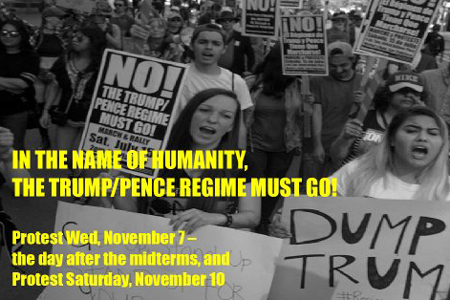
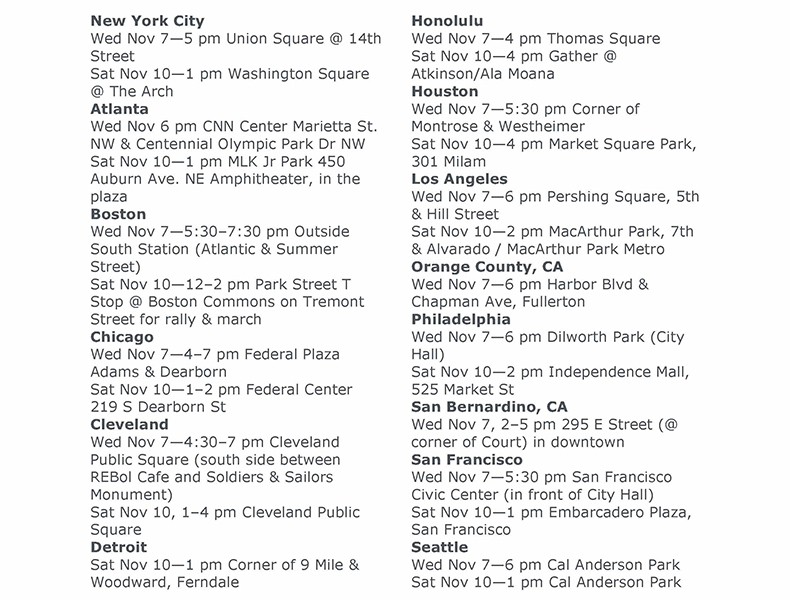
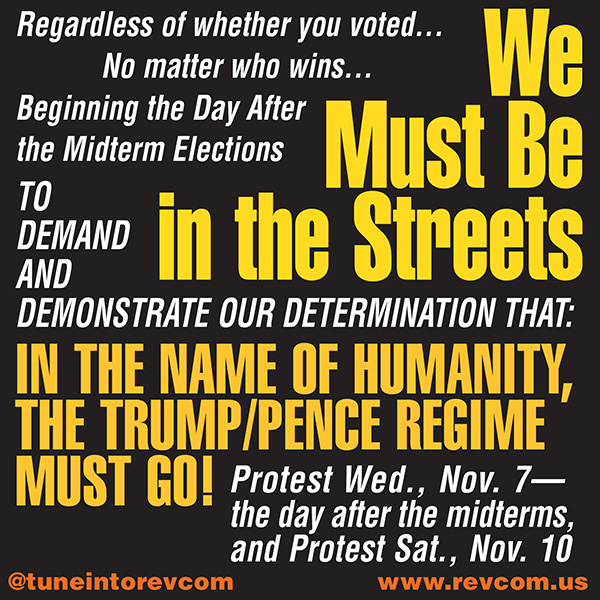
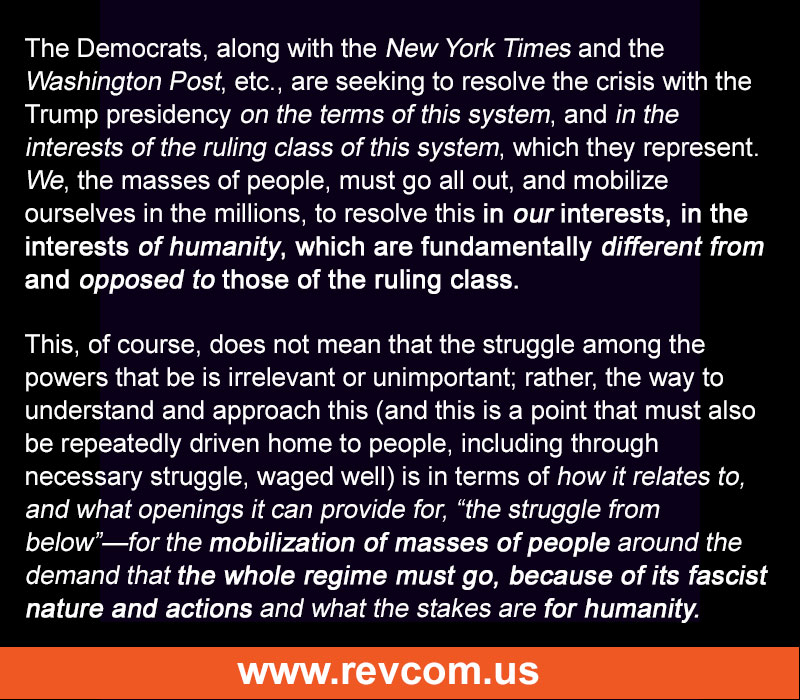
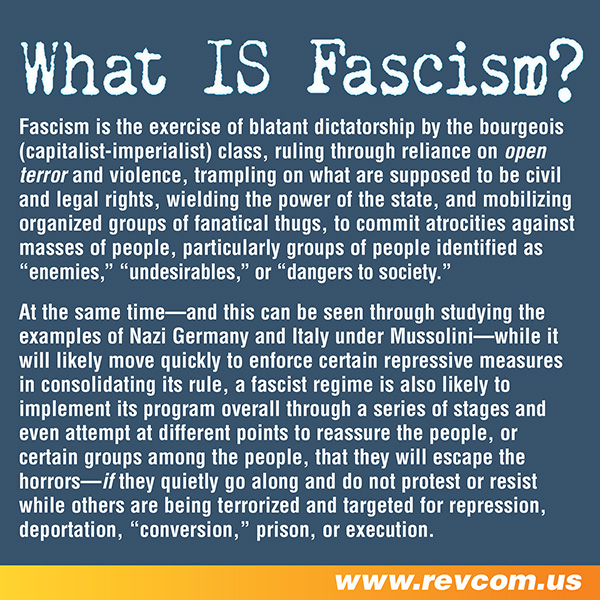
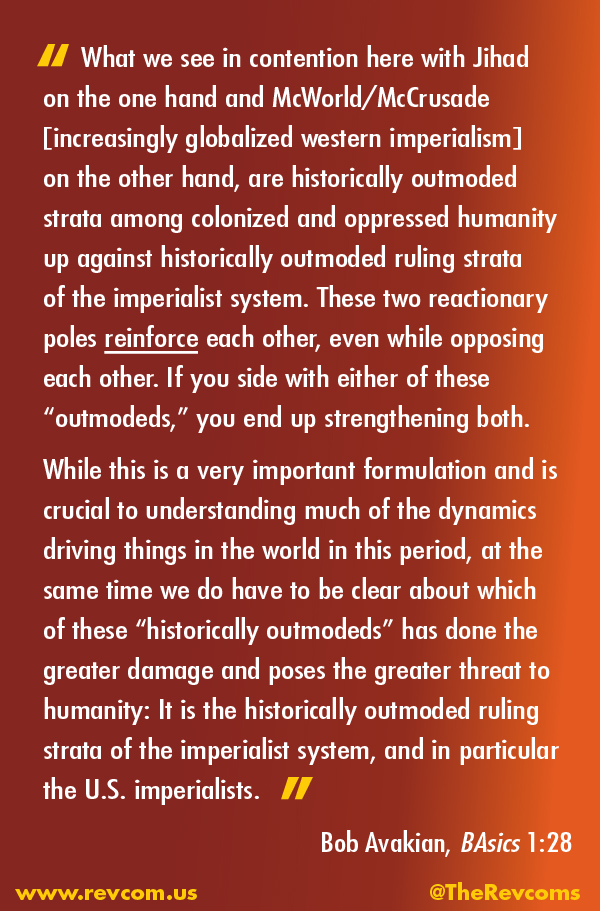
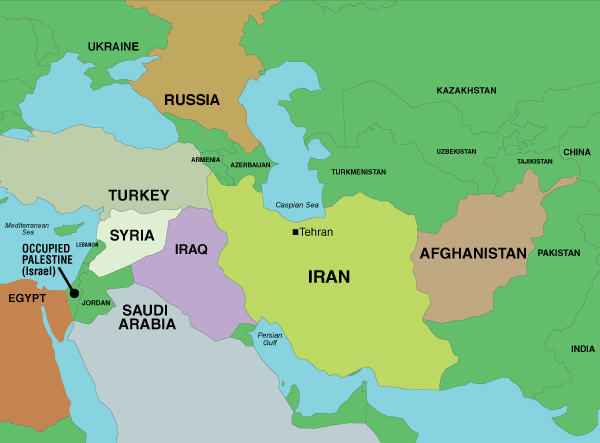

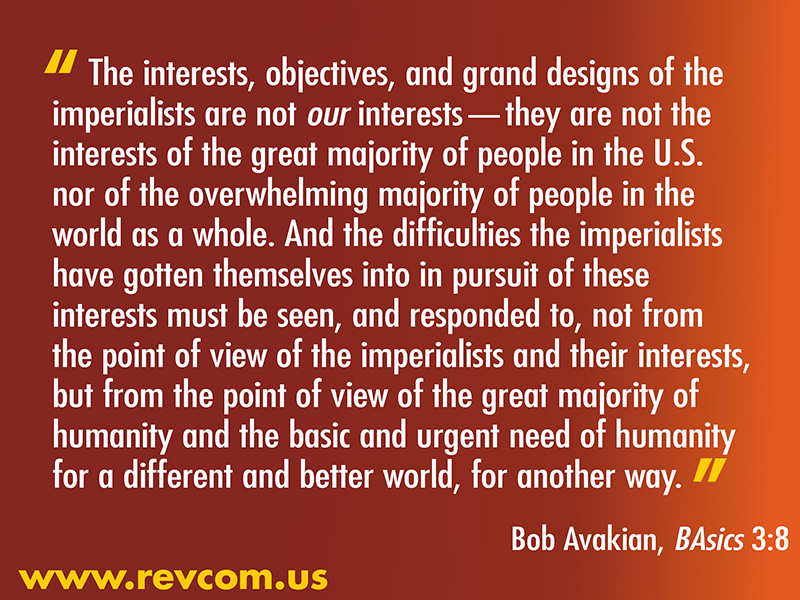
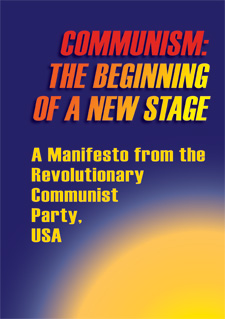
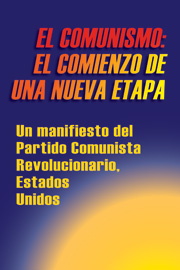


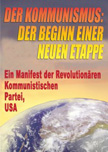







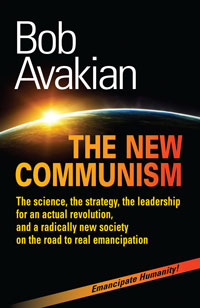
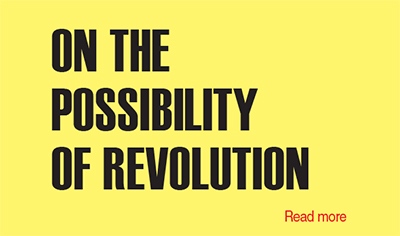
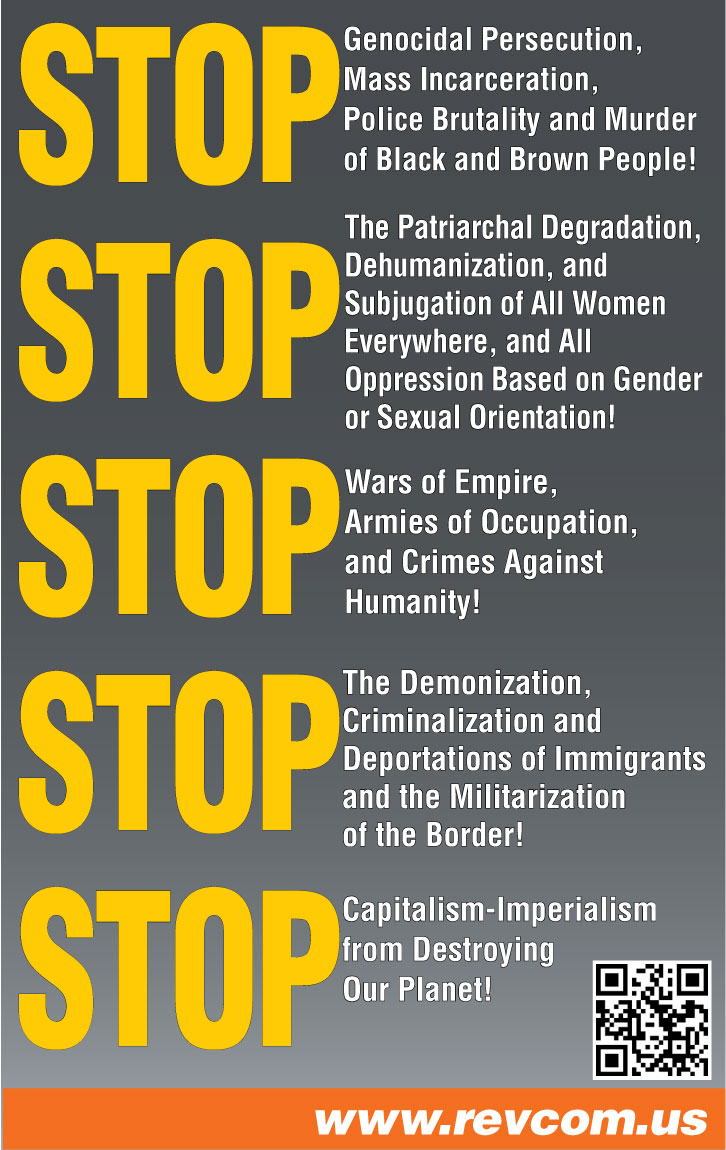
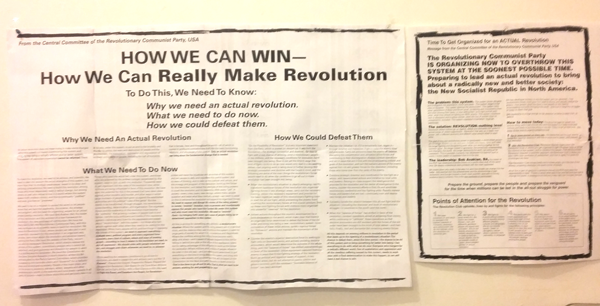

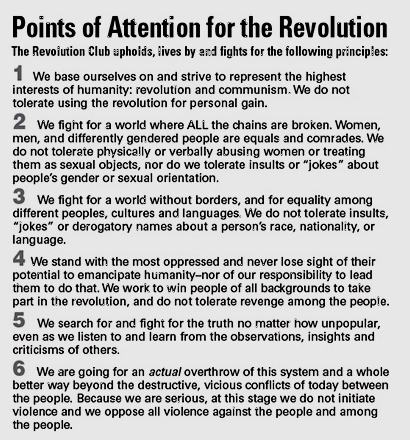
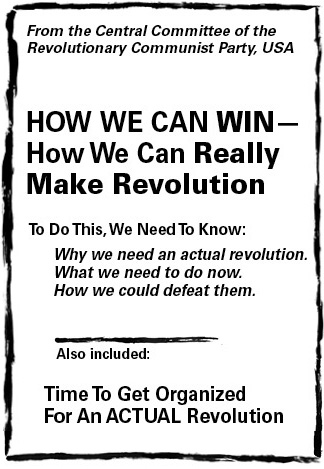
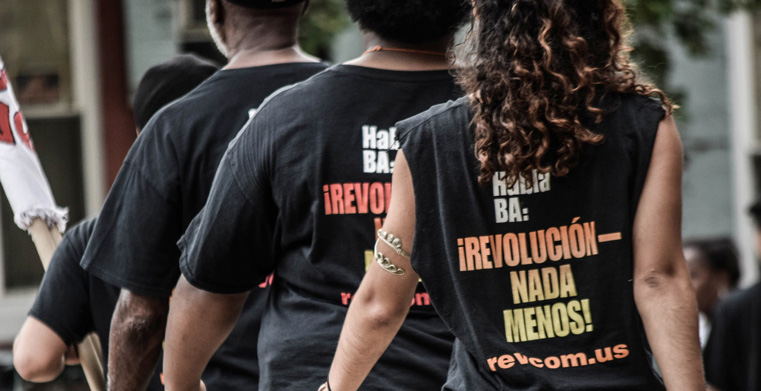
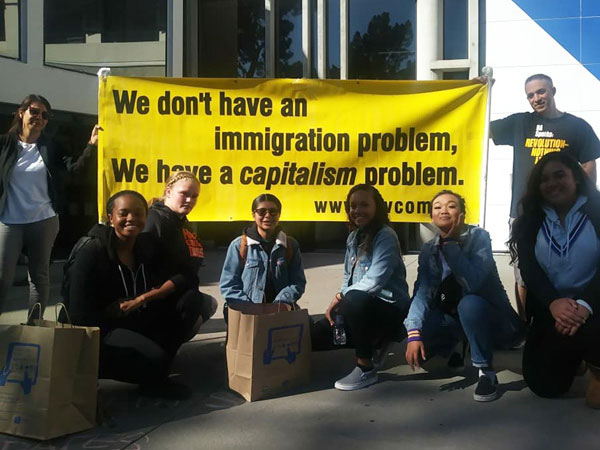
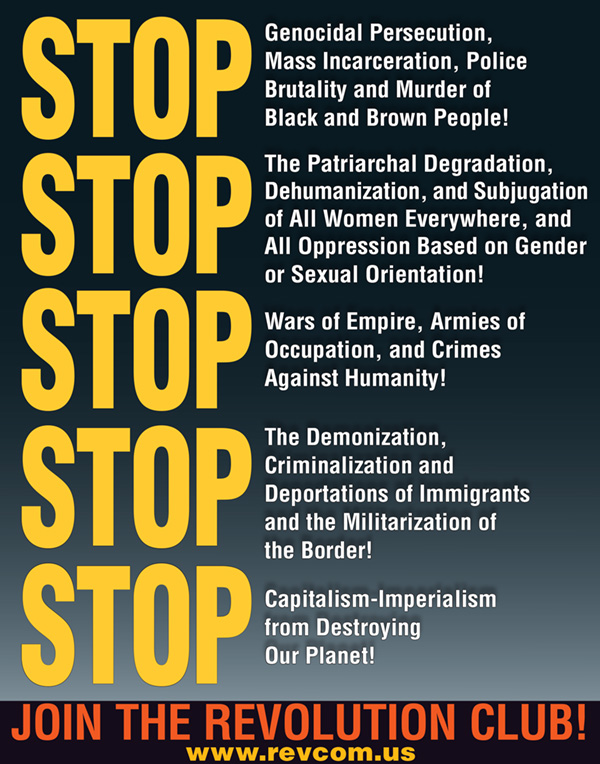
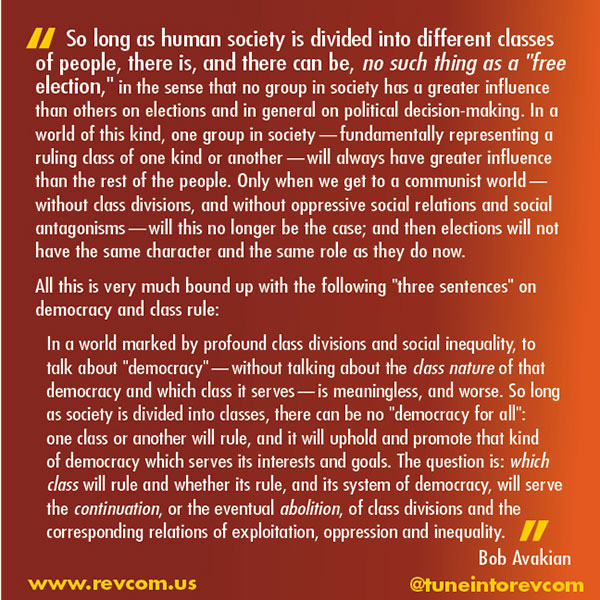
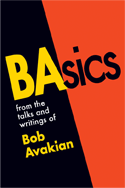
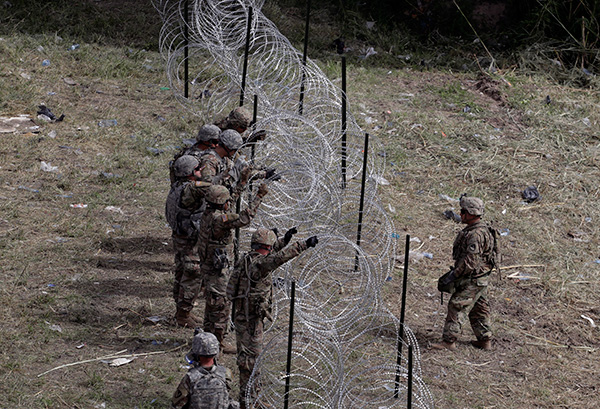 U.S. military install razor barbed wire at the U.S.-Mexico border. (Photo:
U.S. military install razor barbed wire at the U.S.-Mexico border. (Photo: 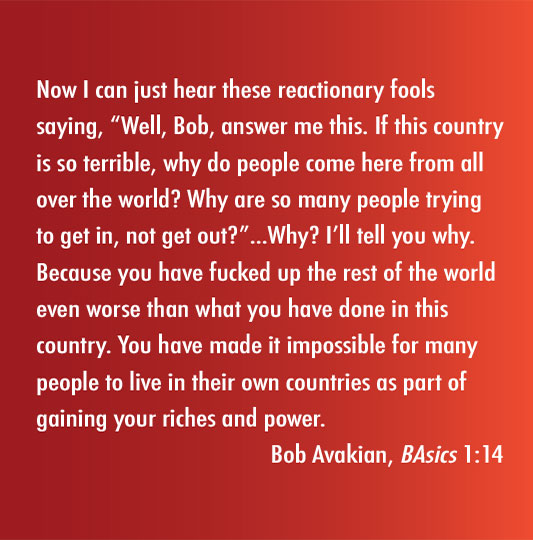
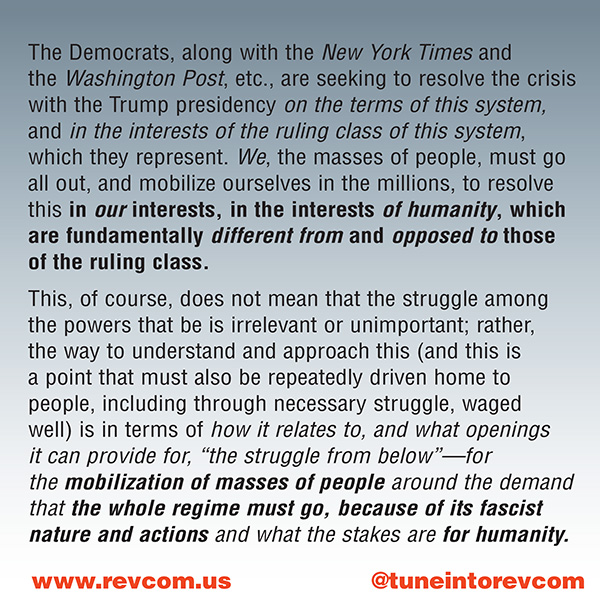

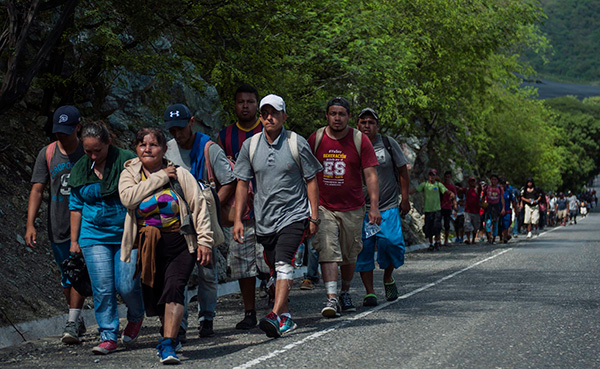 The eyes of the world are on the caravan of refugees from Honduras heading for the U.S.-Mexico border in search of asylum. Each one of their stories is a testament to, and condemnation of, U.S. imperialism's historic crimes against the people. (Photo:
The eyes of the world are on the caravan of refugees from Honduras heading for the U.S.-Mexico border in search of asylum. Each one of their stories is a testament to, and condemnation of, U.S. imperialism's historic crimes against the people. (Photo: 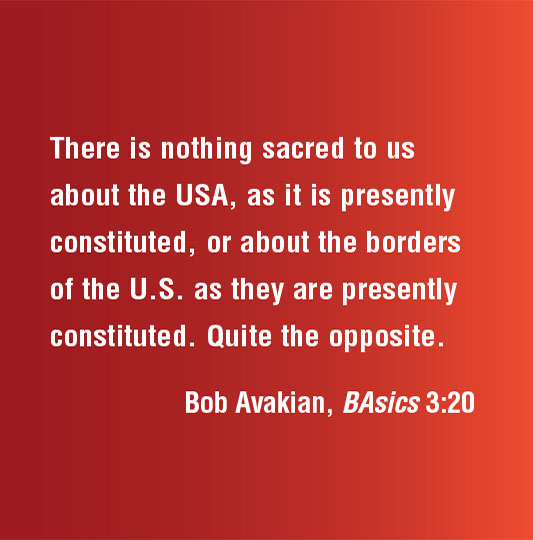



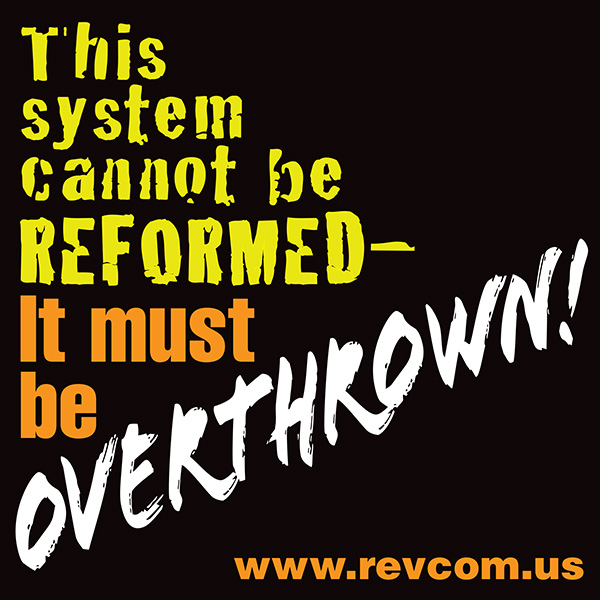
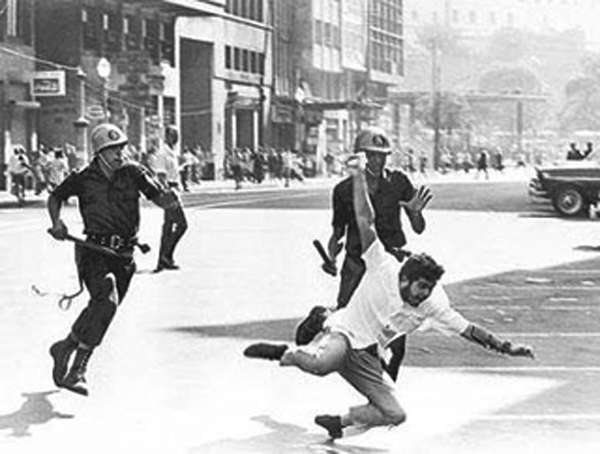
 1968: The Brazilian military regime lined up tanks in the center of Rio de Janeiro in a show of force.
1968: The Brazilian military regime lined up tanks in the center of Rio de Janeiro in a show of force.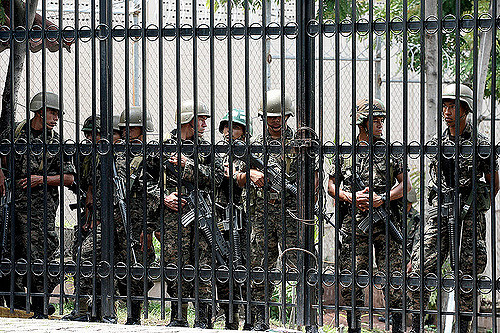 Honduran troops inside the presidential palace during the arrest of the president during the 2009 coup. (Photo: rbreve/flickr)
Honduran troops inside the presidential palace during the arrest of the president during the 2009 coup. (Photo: rbreve/flickr) 